2024

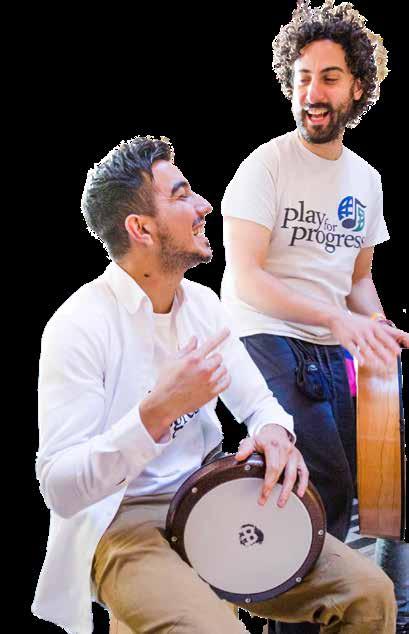
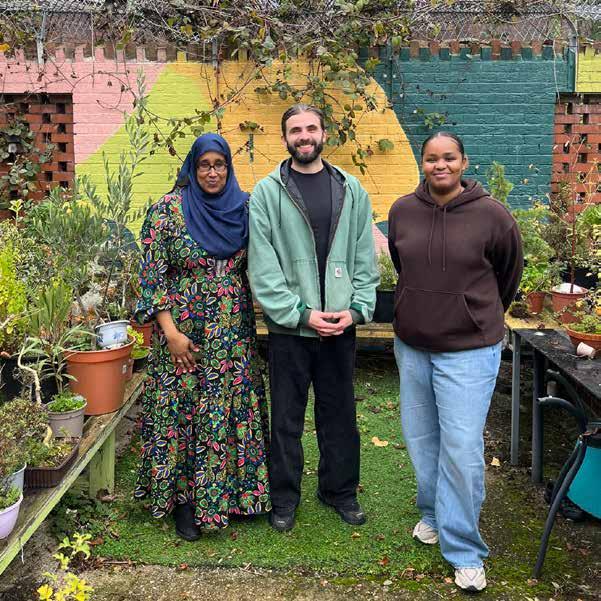
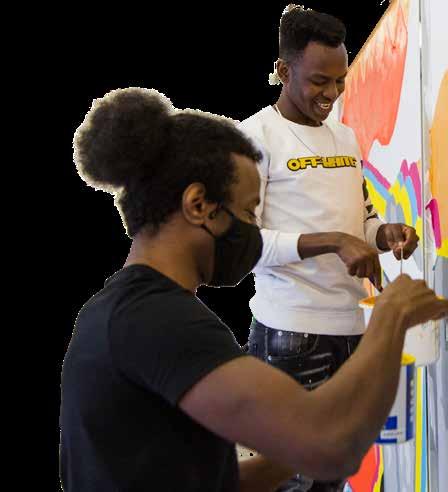
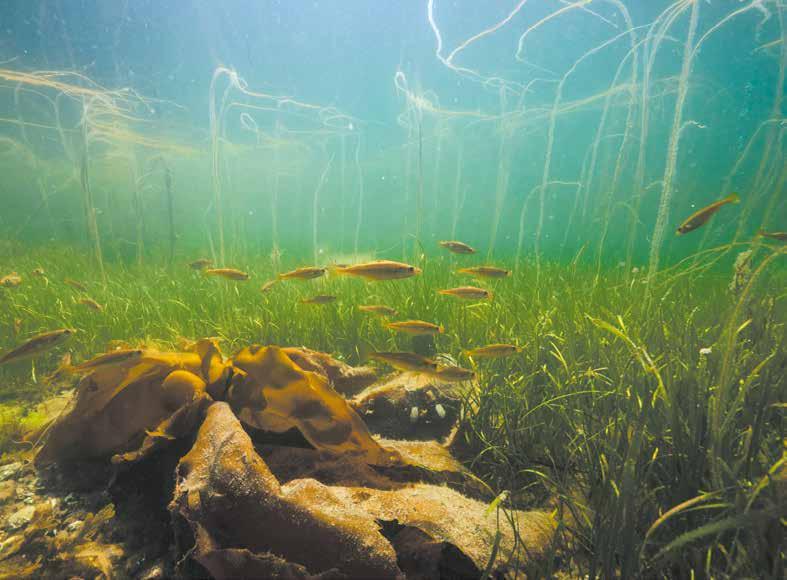
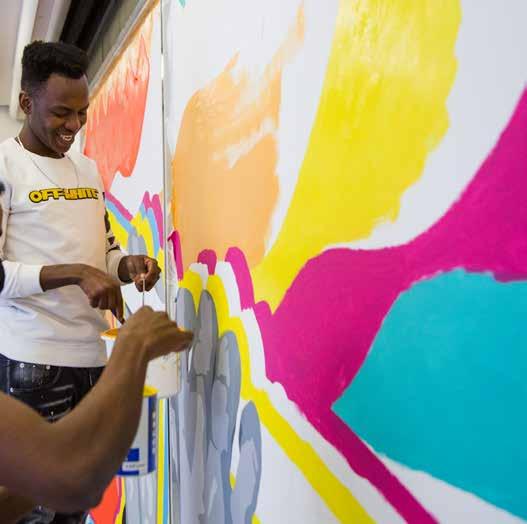

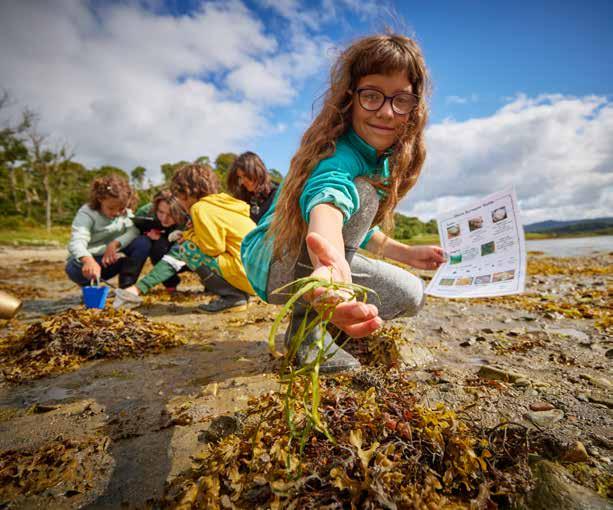
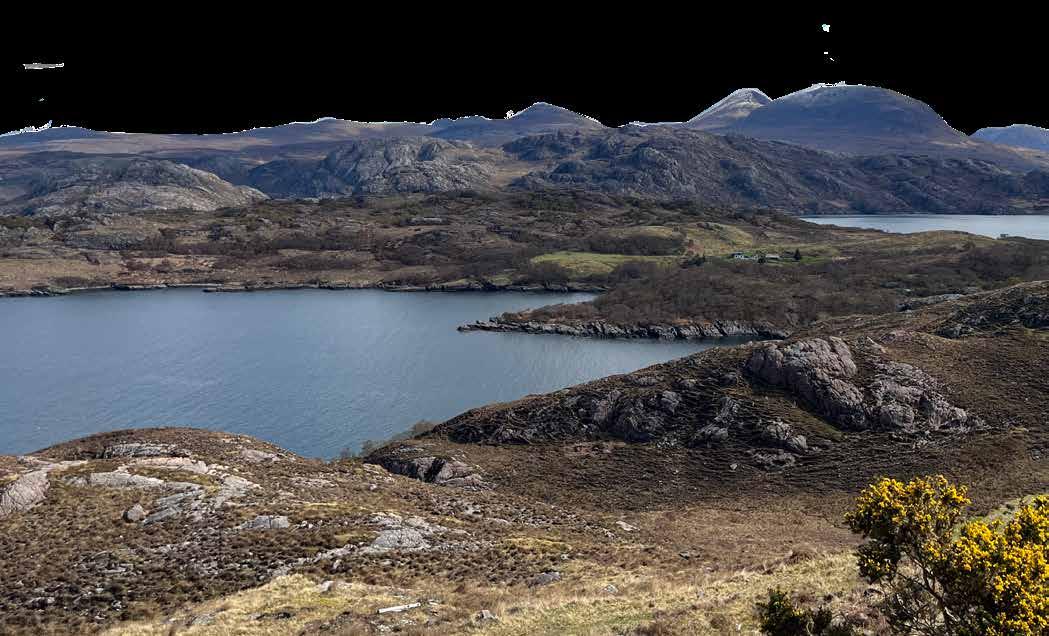

Esmée Fairbairn Foundation aims to improve our natural world, secure a fairer future, and strengthen the bonds in communities in the UK.
We do this by contributing all that we can to unlock change by people and organisations with brilliant ideas who share our goals.
The Foundation is one of the largest independent funders in the UK. Last year, we provided £48.8m in funding towards a wide range of work in support of our aims: A Fairer Future; Creative, Confident Communities and Our Natural World. We also provided £11.1m in social and impact investment for organisations with the aim of creating social and environmental impact. Our funds are generated by our investment portfolio, which achieved a total return of 6.7% in 2024, bringing our main investment portfolio to £1.325bn.
A Fairer Future
Creative, Confident Communities
Our Natural World
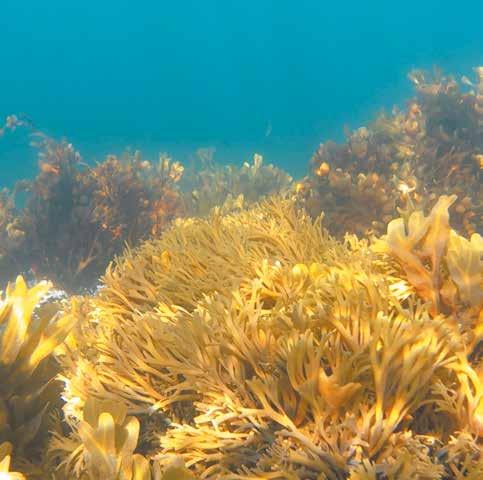
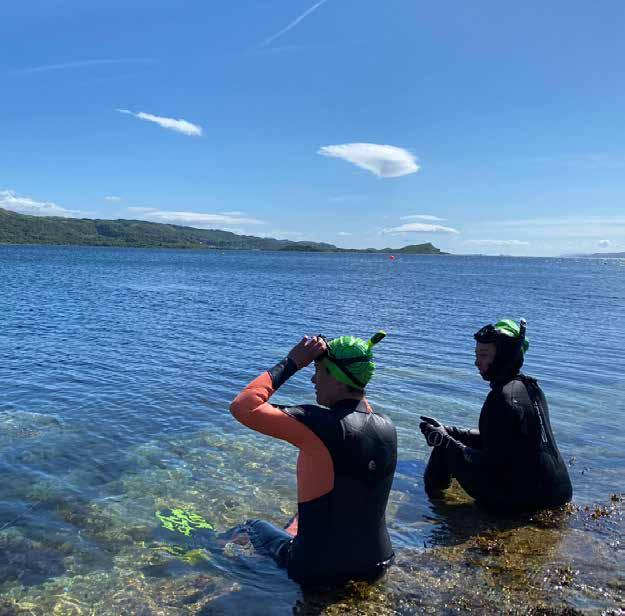
Chair’s Statement
In 2024, we had our second-highest level of grant-making and social investment to date totalling £57.9m (2023: £71.3m).
We are incredibly grateful to the organisations we have funded for all the work they have done and continue to do to help achieve our shared goals.
It has been a huge privilege to work with them.
We continue to explore ways for our investments to contribute to our mission. We boosted our allocation to social investment to £60m, up from a previous allocation of £45m, building on the track record of over 25 years of providing recyclable finance to achieve positive social and environmental outcomes.
We also shared our first in-depth report on thematic impact investing, which we will use to inform our approach to
investing our endowment, which, despite challenging circumstances, achieved a solid performance.
As mentioned in last year’s report, the end of 2023 brought substantial change to our Board, with the departure of four Trustees and the arrival of four new members. The new Board has been diligently working to get acquainted and fulfil its responsibilities.
I extend my gratitude to the Trustees for their invaluable contributions over the past year. We have commissioned an independent review of our governance for 2025 to identify areas for improvement. We have also been undertaking a thorough review of our internal processes and systems to ensure they are clear, consistent, and fit-for-purpose. This will enable us to work even more efficiently and provide improved clarity for applicants.
As a Board, we remain committed to listening to those we work with through a combination of a programme of speakers, an independent survey of our applicants, both successful and unsuccessful, and a review of the outcome of learning conversations with grantees conducted by the Executive team. Our current strategy commenced in 2020 and runs to the end of 2027. Over the next 18 months we will start to review all we have learned, as it will help us inform and develop our plans for a new strategy post-2027.
I would like to express my sincere thanks to my fellow Trustees and our dedicated staff team for their hard work and contributions over the past year. Given the huge environmental, social, and financial challenges in the wider world, I am grateful
that everyone has pulled together, and I am very glad to say we are all committed to continuing to play our role in working towards positive outcomes for people, planet, and places.

Beatrice Hollond Chair
Chief Executive’s Report
Looking back at 2024, we are proud to work alongside and support the extraordinary organisations that make up our portfolio of grants and social investments.
We saw huge political change, global instability, and increased hostility towards many of the areas that we support, leading to racist riots over the summer and growing fear and disconnection in communities. But we also saw hope, resilience and the unwavering commitment of people and organisations in all communities making a difference. This has made all of us at Esmée Fairbairn Foundation determined to continue making our contribution to improving our natural world, securing a fairer future, and strengthening the bonds in our communities.
2024 was one of our highest ever spending years with a total of £59.9m of support, which includes providing £45.1m (2023: £48.3m) in main grants to 236 brilliant organisations and initiatives, and £9.1m approved in new social investments. Social investment continues to be a valuable tool for us to make impact, so we’re pleased to have increased our allocation for this to £60m. We aim to be a trust-based funder and 66% of our grants were for core or unrestricted costs. We are also funding more non-charitable legal structures and have diversified our portfolio with 39% of grants awarded to organisations new to Esmée. Compared to the previous year, we increased the number of organisations that are led by communities facing structural inequity to over half of all organisations who submitted diversity data.
We moved into the second year of our ringfenced £1.5m New Connections Fund, which supports organisations led by and for communities experiencing racial inequity. This was set up to test a different way of funding for 20 organisations that could not apply to us because they do not meet our governance or turnover criteria. We appointed Do It Now Now to lead and facilitate a peer learning network, which will also provide advice and challenge to us.
A highlight of our Creative, Confident Communities work is our £2.7m support over four years to the redesigned Esmée Fairbairn Communities and Collections Fund, a long-term collaboration with the Museums Association. The change recognises local communities as being central to the work. We want to encourage active public participation in decision-making with local
people and local organisations working as an equal partner with museums.
For A Fairer Future, we are working in partnership to start a transformation in children’s residential care, using grants and social investment to fund organisations such as We Are Juno and Lighthouse Pedagogy Trust. They are at the forefront of building a new not-for-profit model for improving outcomes for children in care. We believe that migration is a vital part of UK life and have worked together with others through Migration Exchange on the No Recourse to Public Funds Partnership, hosted by Global Dialogue. Some of the organisations we funded in 2024 include the Public Law Project, Migrants Organise and City of Sanctuary, all of which, in their different ways, are making the UK a welcoming, safe place for people to rebuild their lives.
In Our Natural World, we continue to support a range of levers for progress in restoring nature at a strategic level such as policy, the law, money and people. In farming and fishing, for instance, we supported innovative pilots in technologies and practice, as well as making sure that farmer and fishing communities are at the heart of the work. We supported Landworkers’ Alliance to influence change in our land-use system, prioritising responsible food production, biodiversity, and ensuring equitable access to healthy, sustainably produced food. And our support for a ‘Disco Scallops’ pilot is providing a route away from one of the UK’s most destructive forms of fishing led by fishing communities into a regenerative economic model.
As part of our learning and sharing practice, we published our Insights report on partnership working, shared our thematic approach to impact investing, reviewed our approach to racial justice , and published our second biennial feedback report about applicants’ experience of us.
We continue to use our Tools budget for smaller, but sometimes, critical and enabling interventions. Examples include a review of initiatives to address the lack of diversity in the environment sector, which has led to the commission of a new leadership programme for people of colour, co-designed with people from the sector; a roundtable discussion to share emerging practice on trans inclusive funding; and a consultant to work closely with the LocalMotion six places to help them become investment ready.
We continue to transition our investment portfolio towards sustainability despite a difficult year which has seen some governments and investors pull away from ESG and the consensus on climate. The MSCI World Index was up 20.8% based on the performance of a handful of US technology stocks during 2024 so, like many investors, we did not keep up with this return. Our private funds, having been a huge generator of value in recent years, also had a difficult time in 2024. Most of these funds have a 10 to 15 year life and a single year needs to be seen in this longer term context. They also provide us with high exposure to innovation, and a number are focused on climate technology aligned to our mission. At the end of 2024, our investment portfolio stood at £1.325bn with performance over the year at 6.7%.
As we face forward into 2025, we are grateful for the work and the organisations that we are privileged to support. We will continue to support you as you lead the way in showing the courage and resilience that is needed to make life better for people, communities and nature in the UK. It is this positive leadership that will deliver a vibrant, economically resilient and equitable future for everyone.

Dame Caroline Mason CBE Chief Executive
Funding Overview 2024
During 2024, the Foundation spent £48.8m1 on a wide range of work in support of our strategic aims to: secure a fairer future; strengthen the bonds of communities in the UK; and improve our natural world. This includes £987k through our Funding Plus support and £1.4m approved for Tools to support activities where we are taking a more active role. The majority of our funding in 2024 was distributed through grants. We also approved £9.1m in social investments, and £2m in impact investments.
£48.8m
241
£1.325bn £9.1m
£2.0m
4 Excludes Funding Plus, TASK grants and exceptional grants.
Funding Framework
This report reflects how our funding fits our strategy
Some of our funding supports work across more than one aim, impact goal and priority. We have chosen to reflect grants and social investments in line with the aim and priority that is the closest fit. In some cases, a priority under a different aim may be the best fit.
We also support key infrastructure organisations and new ideas that contribute to our impact goals across our aims by enabling a stronger, inclusive and innovative sector. Work that meets this description is listed under A Sector Fit for the Future.
Grants
We make unrestricted, core and project grants for charitable work in the UK. Our main grants are listed under our three main aims as well as A Sector Fit for the Future on pages 19 to 61.
Core and unrestricted grants are used for an organisation’s running costs to enable them to meet their needs and priorities on their own terms. Unrestricted grants are only given to registered charities, and core grants have some restrictions on use. Project and delegated grants can only be used for the specific project the funding was awarded for. See page 10 for a split of the type of grants awarded in 2024.
Our main grants include 20 grants made through our New Connections programme, which is designed to find and support organisations that could not, or would not, usually apply to Esmée due to our eligibility criteria. Organisations funded through New Connections are listed under their relevant aim as well as on 63.
Social Investment3
We provide social investment in the form of repayable finance to charities and other mission-led organisations with the aim of creating social and environmental impact. We do this through a £60m social investment fund, whereby returns from investments made are recycled to make further social investments.
As of December 2024, we had a total of £42.4m committed in our active social investment portfolio. Investments approved during 2024 are listed under our three main aims as well as A Sector Fit for the Future on pages 36, 46, 58, and 61.
Learn more about how we use social investment and the different types of investments we made on pages 13 and 14.
Impact Investment4
We invest into impact funds, which align with our impact goals and aim to generate a measurable social or environmental impact as well as a financial return. Approved investments are listed on pages 36 and 46.
Learn more about how we use impact investment on page 14.
Active Portfolio
Our Active Portfolio includes all active funding relationships at 31 December 2024. Grant funding relationships are closed at the end of the agreement term. Social and impact investment relationships are closed when the financing has been repaid.
Funding in partnership
We want to be at the forefront of new approaches to funding –working in partnership with other funders and organisations to increase our reach, reduce duplication, and make more of a difference. In 2024, we worked with a range of partners on funds that focus on particular parts of the country as well as specific interest areas or to help tackle a specific issue.
These funds are listed under our three main aims as well as on pages 64 to 66.
TASK Fund
(Trustees’ Areas of Special Knowledge)
£1.3m
Each Trustee has an annual TASK budget of £90k to be used for small grants within the charitable purposes of the Foundation. Grants are listed on pages 67 to 69.
Learn more about the TASK Fund.
Grants by aim5
3 Social investments are referred to as ‘programme related investments’ in the Financial Accounts.
4 Impact investments are referred to as ‘mixed motive investments’ in the Financial Accounts. 5
Grant applications7
Applications through our website
Total expressions of interest decided: 1403
Expressions of interest invited to full proposal: 7%
Success rate for applications after submitting a full proposal: 84%
Applications for follow-on grants and those we invited
Total expressions of interest decided: 191
Expressions of interest invited to full proposal: 91%
Success rate for applications after submitting a full proposal: 97%
Operations
Number of staff at Esmée: 43
Staff Cost: £3.3m
241 grants to 236 organisations.
94 grants (39%) were to organisations we haven’t funded previously
78 grants (32%) were from applications through our website
873 active grants as of 31 December 2024
Grants by size
7 Excludes ineligible or withdrawn applications.
8 Excludes Funding Plus and TASK grants.
Using all our Tools
Tools
£1.4m Total
In addition to grants, social investments and our endowment, we use a range of tools to effect change. These tools are used to broker alliances, influence and remove barriers to achieve our impact goals. Tools activity spans our aims and priority areas.
In 2024, we approved £1.4m on Tools. Connecting and convening work accounted for 47% of the Tools spend. The second highest Tools spend (34%) was on influencing and co-design work.
Key projects in 2024 include:
• Seascape roadmap project (£90k) for Our Natural World
• Ten Years’ Time’s community of practice for funders on anti-racism (£90k)
• Contract to convene and support learning from organisations funded under New Connections (£50k)
• Continuing support of the Involving Young People Collective (£90k)
• Locality research on the role of place-based community organisations within racial justice. (£80k)
Funding Plus
£987k Total
147 – No. of grants
Funding Plus is capacity building support provided to organisations we fund to help them achieve greater impact. In 2024, organisations could apply for a grant of up to £8,500 to make the most of opportunities and receive support they might not otherwise be able to afford or prioritise.
In 2024, we spent £987k through Funding Plus. Most of this was in response to individual consultancy support requests from organisations we fund (83 grants totalling £623k), with the remainder in tailored training, wellbeing, and peer learning opportunities.
Business planning, strategic and organisational development continues to be a priority for organisations, accounting for 39% of consultancy spend. Funding Plus supported projects including anti-racism and anti-oppression consultancy, development of evaluation frameworks, and artificial intelligence feasibility.
In 2024, we targeted more Funding Plus support (£285k, 57 grants) to test an approach for improving wellbeing for the people we fund.
Organisations were identified through our learning data and funding relationships as being at, or at risk of burnout and offered £5k to the improve the wellbeing of staff, volunteers and trustees. No application was required, and the only limit was the funding could not be spent on staff remuneration.
Organisations will be surveyed to find how the wellbeing funding was used and its impact, so that we can
share learning with organisations we fund and with other funders.
Highlights of Funding Plus training in 2024 include supporting Sounddelivery’s Festival of Learning a 3 day online learning event focused on lived experience and expertise, running a series of influencing workshops for the Young People Leaving Care learning programme cohort, and convening funders and charities for a collaborative discussion on creative ways in which funders can help to create conditions for those with lived experience to thrive.
We deeply appreciated the funding for this process which allowed us to do it justice in a way that could not have happened if we had had to pay for it from core costs.
Funding Plus recipient
We believe that social investment is a powerful –and financially sustainable – tool, which, when used alongside grants and our own actions can help achieve our impact goals, whilst also supporting the development of the social investment market and increasing the total amount of funding available.
Our approach to social investment focuses on three objectives:
• Investing for impact: we start with the social need and reverse engineer our investment approach
• Influencing: to enable a broader, more accessible and innovative social investment market
• Learning and sharing: for a more strategic portfolio and to establish greater collective impact.
Micro Rainbow opened our 25th safe house, enabling the organisation to offer over 35,000 safe bed nights a year to LGBTQI asylum seekers. These inclusive and welcoming spaces provide vital protection from discrimination and violence, empowering residents to rebuild their lives with dignity, independence, and hope through tailored support services and community integration.
Micro Rainbow
This has resulted in an investment portfolio containing many different investment types, including a Land Purchase Facility, Equity, Quasi Equity, Community Shares, and secured and unsecured loans.
Examples of our investments in 2024 include a £1.6m secured loan to Micro Rainbow and a £585k quasi equity investment to We Are Juno CIC.
Sustainable Investing
We invest in order to finance our charitable work. We aim to grow our investments by UK inflation plus 4% to support our charitable work and to ensure we can continue contributing towards our aims for decades to come.
We use a range of sustainable investment approaches with different financial and impact goals to support our work.
£45m to £50m per year
Spent towards our impact goals. This includes funding organisations advocating for systemic change in the investment system.
Our Board of Trustees regularly review our funding budget –balancing the need now with the likely need in future. Our budget is linked to the value of our main investment portfolio: we spend around 4% on grants and operational costs. To account for volatility in the market, we calculate the 4% based on the performance of our investments over the previous five years.
£60m
Allocation towards our impact goals, whilst also supporting the development of the social investment market. Our approach is impact-first, financial returns are secondary.
In 2024, we increased our allocation to £60m. We approved 16 investments including: Resonance to help leverage capital into the UK social enterprise sector, We Are Juno towards the children’s residential care in Liverpool, and Câr-y-Môr, a community-owned seaweed farm, for a new seaweed refinery to support them to become more financially sustainable.
£10m
Allocation to test the potential to achieve market-like returns by investing into impact funds which align with our impact goals, and which generate a measurable impact.
In 2024, we shared our thematic approach to impact investing and published our first in-depth investment report, which explored sustainable food and agriculture. We also approved two investments: Schroders Capital for a Fund to reduce inequality, and Eka Ventures for a Fund investing in founders creating positive systems change.
5%
Allocation for funds looking to achieve enhanced environmental, social and governance impact alongside financial return. It supports funds which wouldn’t normally make it into our main portfolio due to their small size, focus or risk profile.
In 2024, we invested in a fund providing debt capital to projects in emerging markets which align with the green transition. We also supported a fund-raising by one of our existing managers specialising in sustainable assets in industries such as water, transport and agriculture.
on sustainability and minimising conflicts with our charitable objectives
95%
We work with our advisors to identify funds which focus on sustainable investing and have steadily increased the proportion we would class as best-in-class managers. We are committed to ensuring our investment portfolio will be net zero in terms of carbon emissions by 2040 at the latest.
We aim to be proactive asset owners by engaging with companies on issues that are aligned with our funding priorities. We work with other foundations and investors to look for opportunities to promote corporate behaviour which is in the interests of long term shareholders and we join various collaborative investor engagement initiatives where they align with our strategic aims. For example, in 2024, we joined an initiative encouraging UK companies to pay the Living Wage.
Our Investments
The market value of the Foundation’s main investment portfolio at the end of 2024 was £1.325bn (2023: £1.286bn), an increase of £39m after spending. The portfolio’s total return was 6.7% in 2024 (2023: 2.8%) compared to the Foundation’s long-term investment objective (RPI+4%), which was up 7.6% during the year (versus 9.4% in 2023).
Results in any one year need to be seen in the context of progress over longer time horizons and we continue to look for managers with a strong team, a clear approach to stock selection and a thoughtful, long-term approach to investment.
Many forecasters were predicting stock market weakness in 2024 –as a result of escalating geopolitical tensions and the conflicts in the Middle East and Europe. But nearly every major stock market posted positive returns during the year despite expectations that inflation will stay higher for longer than anticipated.
The seven largest technology companies in the US continued to be huge contributors to global stock market returns. Stocks like Apple, Microsoft, Amazon and Nvidia were responsible for more than half the gain in the S&P500 making it difficult again for active managers to keep up with the major indices. The profit margins of some of these huge companies remain very high, as do the levels of cash being generated, with the US election initially providing strong tailwinds, alongside the growth in artificial intelligence.
Our main global equity funds were up 14.2% during the year, versus their benchmark, which was up 20.8%. Our non-core global funds were up 11.6% versus their benchmark, which rose by 9.4%, and our smaller hedge fund allocation was up 3.7% during the year. Our private investments which represent around a third of the fund were up 1.6%, lagging behind some of the strong gains seen in prior years. Despite performance trailing benchmarks in the short-term, the portfolio is managed with a longterm time horizon in mind and
contains some excellent investment funds that are well positioned to capitalise on future trends.
The Foundation’s grant funding and operational costs are in sterling; however, the majority of our investments are not, and the fund benefitted from the relative strength of USD versus GBP. We run a passive currency hedging programme which reduces the impact of currency fluctuations on performance and has the effect of lifting the investment portfolio’s effective exposure to sterling.
We still own relatively little fixed income. Although valuations and yields are more attractive now than in recent years, our allocation remains low.
In 2023, we rewrote our investment policy statement to emphasise the importance of sustainability in the way we invest, and we continue to implement these new policies. We are now more explicit about which investments we favour.
Areas where there is likely to be good alignment with our strategy include renewable energy, biodiversity preservation and restoration, decarbonisation, social justice and thematic funds focusing on water, food and communities.
Funds that don’t align with our strategy include those with high exposure to long-lived fossil fuel production, those with significant holdings in heavy CO2 emitters, funds contributing to biodiversity loss and funds with holdings classified as breaches of the UN Global Compact.
We continue to transition our portfolio to managers who place ESG (environmental, social and governance) considerations and sustainability at the centre of their investment process.
The following table shows the annualised performance of the portfolio against our long-term investment objectives over one year, three years, five years, ten years, and since inception.
The portfolio’s asset allocation at the end of the year was as follows:
Our Investments
Since 2017, we have had a specific allocation for funds which we hope will achieve enhanced ESG impact alongside financial return, but which may not naturally fit within a portfolio like ours due to their smaller size, focus or risk profile. In 2024, we invested in a fund providing debt capital to projects in emerging markets which align with the green transition. We also supported a fundraising by one of our existing managers specialising in sustainable assets in industries such as water, transport and agriculture.
In 2024, we continued to make investments into a relatively new £10m allocation for impact funds, managed by our social investment team and working in conjunction with our investment consultants. We are using this pilot to inform our longer-term investment strategy. The starting point for our impact investing decisions is the intent to generate positive, measurable social and environmental outcomes (the impact) alongside the achievement of financial returns.
Within our investment portfolio we aim to be proactive asset owners by engaging with companies on issues that are aligned with our funding priorities. We work with other foundations and investors through the Charities Responsible Investment Network and look for opportunities to promote corporate behaviour which is in the interests of long term shareholders and we join various collaborative investor engagement initiatives where they align with our strategic aims. Recent examples have included an initiative encouraging UK companies to pay the Living Wage.
The Foundation is a signatory to the United Nations’ Principles for Responsible Investment (UNPRI) and to the UK Funder Commitment on Climate Change. We are one of a growing number of foundations who recognize that the growing climate emergency is a serious risk to the pursuit of our charitable aims.
We have made a commitment that our investment portfolio will be net zero in terms of carbon emissions by 2040 at the latest. We are working with our investment advisors to achieve this and have four priorities.
1) To invest in “climate solutions” which enable emissions to be avoided or reduced.
2) To be a supportive shareholder to higher emissions businesses which have set a plausible path to Paris alignment for their own activities and holding them to account for delivery.
3) To actively using proxy voting and engagement to encourage businesses to adopt appropriate plans to decarbonise, where these are absent, as in most cases today.
4) To support efficient capital allocation in each of the preceding activities.

We also shared a blog about our thematic approach to impact investing. We
Climate Change
In everything we do, we are committed to addressing the causes and impacts of Climate Change.
Improving and restoring Our Natural World is one of our strategic aims, and our total funding towards nature and climate-related work during 2024 was £21.7m. This includes all related grant funding, social and impact investments, as well as spending using our Tools budget. In addition to funding in our priorities for Our Natural World, the total includes work that contributes to our priorities in Creative, Confident Communities.
We continue to look for opportunities to support a fairer and just environment movement by using our resources and expanding our own learning. During the year, we focused on a range of activities including:
• Holding a series of educational events for staff to deepen our collective understanding of climate change and the intersections for our work, particularly in relation to social justice and communities.
• Sharing our first impact investment deep dive into sustainable food and agriculture, and our approach to thematic impact investing. As well as influencing our main investment portfolio, we hope it will also be helpful to others looking to invest for impact.
• Protecting and restoring peatlands is a key focus of our influencing and we are supporting the Peat-free Partnership, which is dedicated to implementing a ban on the sale of peat for horticultural use in all four nations in the UK. As part of this work, we signed a joint open letter to the Prime Minister calling for the Government to legislate to end peat sales.
• Continuing to support initiatives to improve diversity, equity and inclusion in the sector such as the RACE Report, working with Ocean & Coastal Futures to improve diversity of the marine sector. We also commissioned a project to co-design a leadership programme for people of colour in the environment sector.
• Proactively finding and supporting environment organisations led by, and for, communities experiencing racial inequity, as well as organisations whose work links both environmental and sustainability issues with those from economically and culturally marginalised communities. For example, in 2024, we supported Land in Our Names, Women’s Environmental Network,Women in Fisheries, All The Elements, and the British Veterinary Ethnicity and Diversity Society.
• Updating our funding guidance for Creative, Confident Communities to include an outcome focused on the intersections between climate, nature and economic development. Through this work, we hope to build community knowledge and consensus about climate change, and support innovative approaches to local economic development, such as through circular economy models. Examples include support for The Bahu Trust to support local community-led climate action, Hope For The Future to develop climate assembly models; and solar panel installation costs for Bristol Community Energy and Solar for Schools.
• Developing and sharing our policy on the use of AI tools, taking into account environmental and ethical costs. This will continue to be reviewed and we are collaborating with others in the sector to explore actions we can take to minimise the impact on the environment as the use of AI grows.
Learn more about the actions we have taken during 2024.
Funder Commitment on Climate Change
We are a founder signatory to the Funder Commitment on Climate Change.
As such, we commit to:
1. Educate and learn
2. Commit resources
3. Integrate
4. Steward our investments for a post-carbon future
5. Decarbonise our operations
6. Report on progress
Diversity, Equity and Inclusion
Social justice is core to our work and we believe that understanding and making progress towards diversity, equity, and inclusion (DEI) is critical for delivering our mission.
We have a DEI action plan to help us track our progress, which we regularly review, committing to further actions and sharing them on our website alongside our actions so far. Key actions in 2024 include:
• Joining the Ten Years’ Time Community of Practice, a threeyear holistic programme designed to support organisations to embed equitable practices, anti-racism, and racial and economic justice.
• Setting up advisory panels for our work in A Fairer Future and Creative, Confident Communities, which include experts by experience.
• Supporting a funder roundtable to share emerging practice on trans inclusive funding.
• Through Funding Plus we offered 50 organisations a wellbeing grant, and also funded organisations working with people affected
by the far-right riots to take quick actions to support their communities.
• A listening exercise with organisations in our Racial Justice priority to understand how we could improve our support and approach for racial justice. We published the findings of the review of Esmée’s approach to racial justice in 2025.
Learn more about our commitments and our progress towards DEI
We carry out an annual survey of Trustees and staff to help us track progress on the diversity of our people. We also ask a question on salary to help us understand our gender, ethnicity and disability pay gaps. See the diversity data of Esmée Trustees and staff
Who is our funding reaching
To help us understand who our funding is reaching, we use the DEI Data Standard . Since 2021, we have asked organisations we fund and those applying to us to complete a DEI monitoring form. We use the information we gather to help us identify structural inequity in our funding practice and inform our funding strategy.
The following chart reflects data about the communities our funding supports and the leadership10 of the organisations we funded in 2024. The chart focuses on population groups that face structural inequity because of their identity or lived experience, and are most relevant to our strategy.
The data includes information on 206 main grants (87% of the grants awarded) in 202411.
See our Who is our funding reaching report for more information.
10 To classify our data, we define an organisation as being ‘led by’ a particular population group when 75% or more of the Board/Management Committee AND 50% of senior staff share a particular identity or experience, where staff exist.
11 The data doesn’t include Funding Plus, TASK grants and exceptional grants.
Communities supported Leadership
A Fairer Future
We want to provide the support and space to those we work alongside to create lasting change, and to challenge systems that stand in the way. We want to contribute to a socially just and anti-racist society, where people have their rights protected, as well as the opportunity to speak and be heard, and the freedom to express their creativity.
A Fairer Future

Catherine Hillis Director of A Fairer Future
2024 was a tough year for many of the brilliant organisations we support. These organisations are working hard to move towards a future with greater racial, gender and migrant justice, where children and young people’s voices and rights are lifted, and the UK’s cultural life reflects and celebrates us all.
And whilst this amazing work continues, the violent riots of the summer, and the racist, misogynistic and anti-migrant abuse and harm many in the sector have been subjected to, shows us that long-term unrestricted funding to organisations trying to change systems is needed now more than ever. 84% of our funding in A Fairer Future this year was to core or unrestricted funding, and we believe this is the best way we can support the sector through tough times.
81% of the organisations we have funded this year are led by the people they serve, something we are keen to prioritise. We are also keen to support collaborations and movements to help organisations come together to create change. Just a few supported this year include the End Violence Against Women and Girls Coalition, Migrants Organise, and Harm to Healing, a movement to address racial injustice within the criminal legal system. We also continued our support for the Contextual Safeguarding programme to build a movement to respond to young people’s experiences of significant harm beyond their families; and renewed our partnership with the Power of Pop, a pooled fund supporting organisations using pop culture and creativity to advance justice in the UK.
This year, we also delivered the Youth Led Creativity fund, co-designed with our Involving Young People Collective . The development of criteria, funding decisions and appointment of a learning partner were all led by the young consultants. We’re excited to work with the 10 organisations supported to showcase youth-led creativity practice.
Using our Tools budget, we supported Shaping the Future, a leadership initiative to support grassroots organisations and those with lived experience of the migration sector and Law for Change to fund legal actions giving a voice to under-represented people and communities with limited access to justice. We also supported learning around the Family Courts Enquiry Site and entered the seventh year of our Young People Leaving Care Learning Programme with exciting collective action on a range of issues impacting on care experienced young people’s lives. The amazing work of all the organisations in our portfolio give us hope and inspiration for our work towards A Fairer Future.
A Fairer Future
12 Includes relevant New Connections grants and partnerships funds also listed on pages 62 to 66.
13 In addition to our funding in A Fairer Future, we also made two grants under our Racial Justice priority as part of our work towards Our Natural World. These grants are detailed on page 57.
A Fairer Future grants
Arts and creativity making change
Access All Areas
£150,000 over 2 years
Towards unrestricted core costs of the roll-out of Access All Areas’ successful access consultancy for theatre, TV, and film; creating meaningful and lasting change to the inclusion of learning disabled and autistic voices in culture.
Actors Touring Company
£145,000 over 3 years
Towards core costs to Actors Touring Company’s Associate Director and Senior Producer roles; focusing on the evolution of equitable frameworks for theatremaking, by and for Global Majority and underserved audiences.
Be
United
£160,089 over 3 years
Towards unrestricted core costs for a Creative Programme (2025–28) providing training, access, and clear progression routes into leadership roles within the Scottish creative industry.
Birds of Paradise Theatre Company
£180,000 over 3 years
Towards unrestricted core costs support for Cue Backstage, a threeyear programme of work to support the development and creation of a more diverse workforce across Scotland’s performing arts.
Black Curatorial
£10,000 over 1.5 years
Towards core costs in participating in the New Connections Network.
Care To Culture
£71,349 over 3 years
Towards core costs to deliver training and artistic opportunities for Care Experienced people, aged 16-30, to develop themselves as artists and leaders.
Cheshire Young Carers LTD
£107,000 over 3 years
Towards project costs for creative arts respite and workshops for young carers across Cheshire.
Comics Youth CIC
£120,000 over 3 years
Towards core costs of a youth led organisation that supports marginalised children and young people to speak truth to power and have their voices heard through the power of comics and zines.
Diverse City
£150,000 over 3 years
Towards unrestricted core costs of A New Now: driving workforce change across the performing arts, embedding equal representation on and off stage, in leadership, and in the audience.
DreamArts
£120,000 over 3 years
Towards core costs of Friends From Afar: a creative and wellbeing project led by unaccompanied asylum seekers aged 15–22.
Extant
£150,000 over 3 years
Towards core costs of Extant Futures: a needs-led artist development programme for blind and visually impaired artist leaders that will nurture new creative careers and bring more visually impaired voices into the heart of our cultural workforce.
Heart n Soul
£150,000 over 3 years
Towards core costs of Create, Connect, Change: putting people with learning disabilities and autistic people at the heart of decisionmaking and leading change.
Hijinx Theatre
£90,000 over 3 years
Towards unrestricted core costs to establish a more inclusive film workforce for learning disabled and autistic artists.
In Place of War
£100,000 over 2 years
Towards unrestricted core costs of 100 Agents of Change, a youth artivism residency, mentoring, and seed funding project; connecting disadvantaged youth in the UK with global artivists – to share and support youth-led civic arts projects.
Ludus Dance
£90,000 over 3 years
Towards unrestricted core costs to support young people experience joy, care and positive change; through dance and evolving the organisational model with young people taking the lead.
National Theatre of Scotland
£150,000 over 3 years
Towards core costs to support a Fellowship Programme for establishing new Creative Cultural Leaders in Scotland from Global Majority communities and lower socio-economic backgrounds.
A Fairer Future grants
Play For Progress
£105,000 over 3 years
Towards unrestricted core costs for a trauma-informed creative charity supporting young unaccompanied young people seeking asylum.
Rifco Theatre
£90,000 over 3 years
Towards unrestricted core costs support for their Associate Director to move from part time to full time, increasing the scope and maximising the impact of Rifco’s Associates programme.
Serendipity Institute for
Black Arts and Heritage
£180,000 over 3 years
Towards core costs for the development of three training programmes for young Black archivists, dancers and artistic programmers, and the appointment of a Director of Operations.
Skaped
£100,000 over 3 years
Towards core costs of a communityled artivist charity that encourages young people to engage with community-building and social change through creative art.
Talawa Theatre Company Limited
£150,000 over 3 years
Towards unrestricted core costs supporting Black Artistry Regional Hubs, a national network of creative communities that Talawa will seed in the North, South-west, Midlands, and Greater London regions.


Our music team continues to see young people returning year after year, strengthening their skills, confidence, and sense of belonging. This year, we are so proud to report that we assisted one of our talented young people to record his own album and upload onto the Spotify music platform. A powerful milestone that reflects the lasting impact of our programmes.
Play for Progress

A Fairer Future grants
Serendipity has forged a step change in the way that Black British history and heritage is documented and shared, shaping our guiding principle of ‘changing the lens’.
Serendipity Institute for Black Arts and Heritage
(See grant on page 23)
To date we have supported over 40 young archivists, with applications so oversubscribed that we have had to plan additional courses to meet demand.
The Khayaal Theatre Company
£105,000 over 3 years
Towards core costs to support Khayaal’s work using storytelling and stagecraft to foster greater intercultural and interfaith dialogue, understanding and engagement between Muslim communities and the wider world.
The Multi-Story Orchestra
£120,000 over 2.5 years
Towards unrestricted core costs to support young people to lead creative orchestral music development.
The Music Works (Charity)
£150,000 over 3 years
Towards unrestricted core costs to support the organisation to develop young people’s creativity and empower young leaders in Gloucestershire.
Theatre Peckham
£120,000 over 3 years
Towards project costs for a spoken word theatre project, which will seek to define and promote the artform whilst addressing mental health challenges amongst Black young men, and providing performing arts opportunities.
Tiata Fohodzi Ltd
£105,000 over 3 years
Towards core costs to develop PlayLab, an annual initiative to support the work of British African heritage creatives, as an inclusive and accessible offer to the wider theatre sector.
Tribe Arts
£70,000 over 1 year
Towards core costs to support Tribe Art’s programmes and projects addressing and tackling issues of racism and colonialism, working with communities and professionals from racialised backgrounds.
Ventnor Exchange
£120,000 over 3 years
Towards project costs of developing Brave Island, a year-round offer for 14–25 year-olds interested in the creative industries.
We Don’t Settle CIC
£150,000 over 3 years
Towards core costs of FUEL: supporting young people to create, uplift communities, take a stand and spark real change.
A Fairer Future grants
Children and young people’s rights
ARC Scotland
£205,500 over 3 years
Towards project costs of DIVErgent INfluencers: leading improvements to systems, knowledge, practice, policy, and the lives of all young disabled people in Scotland and North East England.
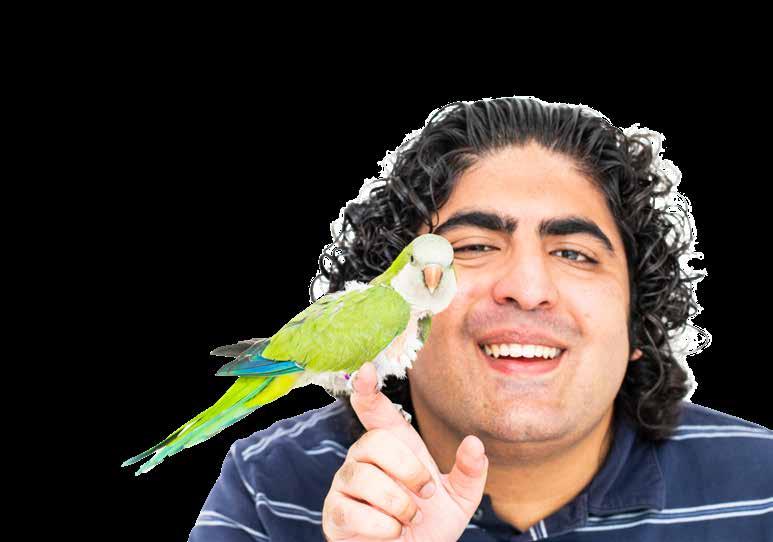
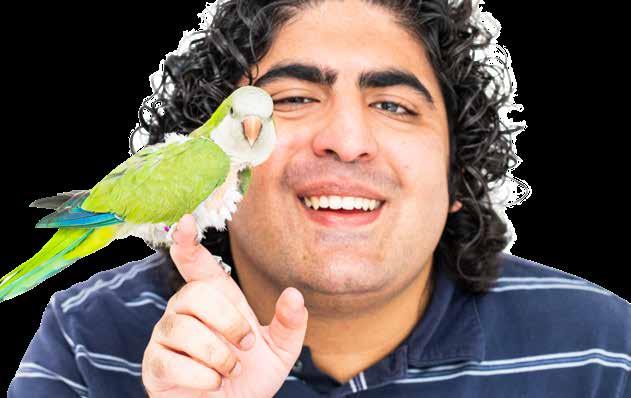
Articulate Cultural Trust
£225,000 over 3 years
Towards unrestricted core costs to support care experienced young people to explore creativity, and influence policy and practice, in the services and sectors they encounter.
Babbasa (Youth Empowerment Programmes)
£199,696 over 3 years
Article 39
£225,000 over 3 years
Towards unrestricted core costs to champion the rights and dignity of children and young people who are care experienced and/or live in institutional settings.
One of our proudest moments last year was seeing one of our young disabled leaders group (DIVErgent INfluencers) winning a ‘Positive Role Model’ award in the National Diversity Awards 2024, which was broadcast on ITV.
ARC Scotland
Towards core costs to formalise Babbasa’s Trailblazer programme, promoting the influence of Youth Voice and action within their OurCity2030 vision for Bristol.
Blue Cabin
£200,000 over 3 years
Towards unrestricted core costs to support creative approaches to improving outcomes for care leavers.
The excellent advice from Article 39 enabled me to challenge a wrongful decision and help a young person to feel validated and heard… The complaint was investigated and upheld. As a result, the young person received a full apology in person, a financial remedy and a new social worker who is now seeking criminal compensation on their behalf.
Article 39 Advocate Network Member
A Fairer Future grants
Johanna and Sharon as founders of Families In Harmony are proud that our racial equity work in kinship care has been acknowledged in The Big Issue Top 100 Change Makers 2025 list. We are also encouraged by the impact our collaboration and influence activities are having in relation to re-shaping policy, practice and support services through a racialised lens for kinship families.
Families in Harmony
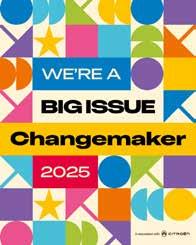

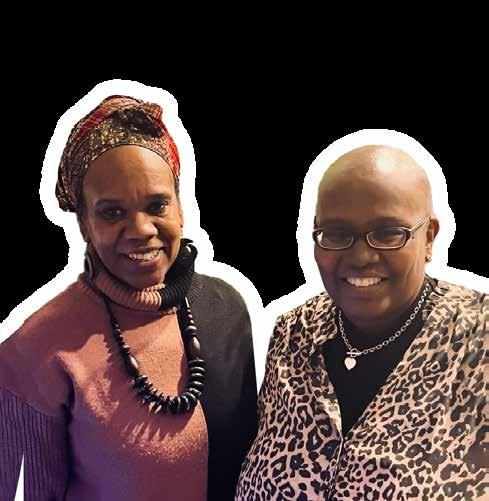
Durham University
£200,000 over 32 months
Towards project costs to extend the achievements of Contextual Safeguarding to groups facing intersectional oppression –unaccompanied asylum-seeking young people and parents under scrutiny from child protection services.
Each and Every Child, The Robertson Trust
£199,000 over 3 years
Towards core costs to enable Each and Every Child to consolidate practice change across organisations, individuals and communities to reframe the way people speak about the care system.
Families in Harmony
£70,000 over 2 years
Towards core costs to make the organisation’s programmes tackling racial disparity in kinship care fosters more sustainable.
Kids of Colour
£70,000 over 2 years
Towards core costs to create spaces for young people to feel supported, validated and celebrated, while challenging the racism that affects young people and their communities in Great Manchester.
Lighthouse Pedagogy Trust
(Catch 22 Charity Ltd)
£180,000 over 3 years
Towards core costs for leading change towards a more progressive model for children’s residential homes.
Listen Up
£70,000 over 2 years
Towards core costs to develop an adultification resource toolkit for educators, evaluate the impact of Listen Up’s training programme and improve sustainability of the organisation.
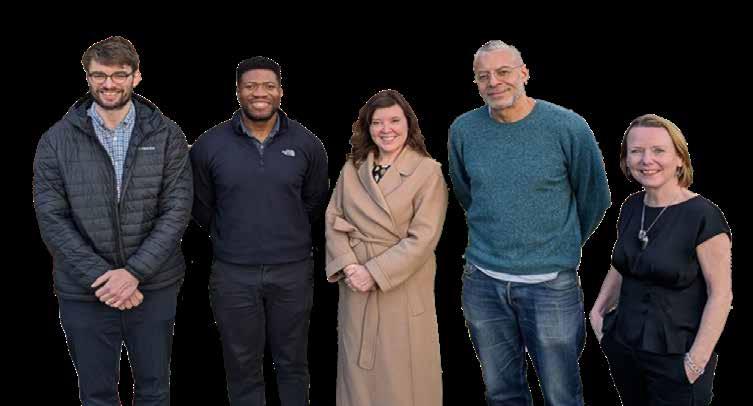
We have been able to drive change in the children’s home sector: we developed the first-ever degreelevel qualification for residential care workers and collaborated with a group of local authorities on workforce development.
Lighthouse Pedagogy Trust
A Fairer Future grants
Northern Ireland Youth Forum
£150,000 over 3 years
Towards unrestricted core costs for a youth-led, adult-supported approach, ensuring young people who have faced injustice and systemic failure have the capacity and confidence to positively influence decisions that impact their lives.
Peer Power Youth
£250,000 over 3 years
Towards unrestricted core costs to support Peer Power to catalyse youth-led system change across the health, justice and social care sectors.
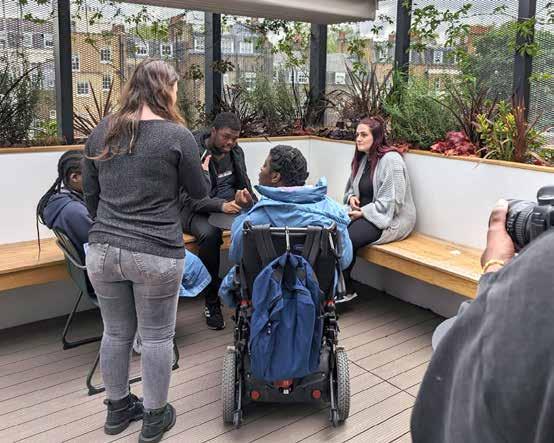
You can tell the staff genuinely care about young people and value what we say. Our voices are mirrored in what happens.
Peer Power Youth young partner
Power The Fight
£200,000 over 3 years
Towards unrestricted core costs to scale up the Therapeutic Intervention for Peace (TIP) Project.
Project For The Registration Of Children
As British Citizens
£180,000 over 3 years
Towards unrestricted core costs to support vulnerable children and young people to secure their citizenship rights.
Refugee Education UK
£150,000 over 3 years
Towards unrestricted core costs equipping young refugees to lead on policy influencing work for systemic changes to the education of young asylum seekers and refugees.
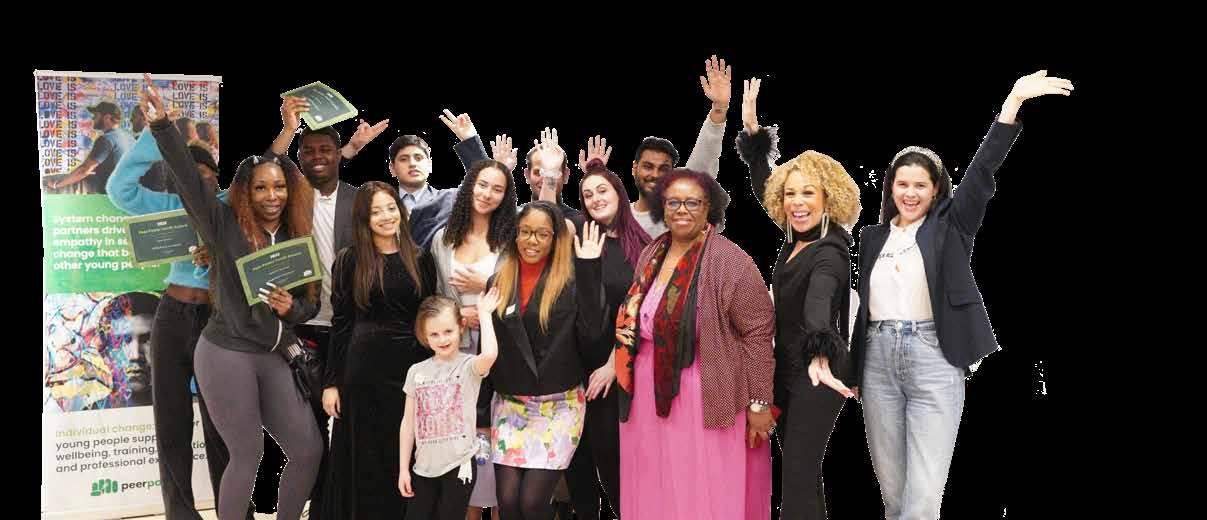
Rethinking Conflict
£25,000 over 6 months
Towards project costs that will aid community-building in Northern Ireland through support for a generation of diverse young people to lead and shape new approaches for a new future.
In 2024 we saw 75% of the young people that participated in the Therapeutic Intervention For Peace Project (TIP) experiencing an improvement in their mental health and wellbeing as a result of the project. We had more young people remain engaged with us after the end of the project through our Alumni Programme and we ran Summer holiday workshops with this group. We also saw an increase in engagement from parents, carers and school staff.
Power The Fight
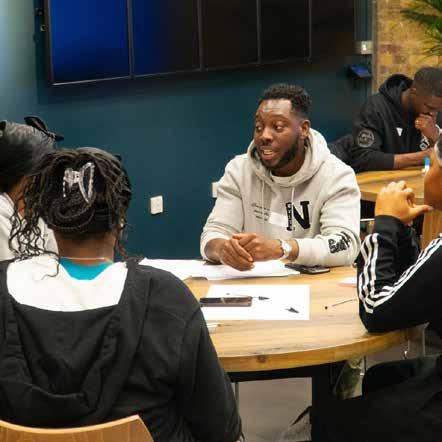
A Fairer Future grants
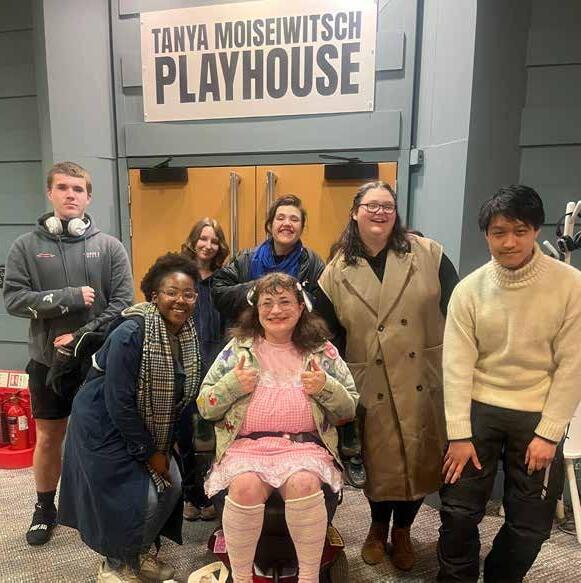


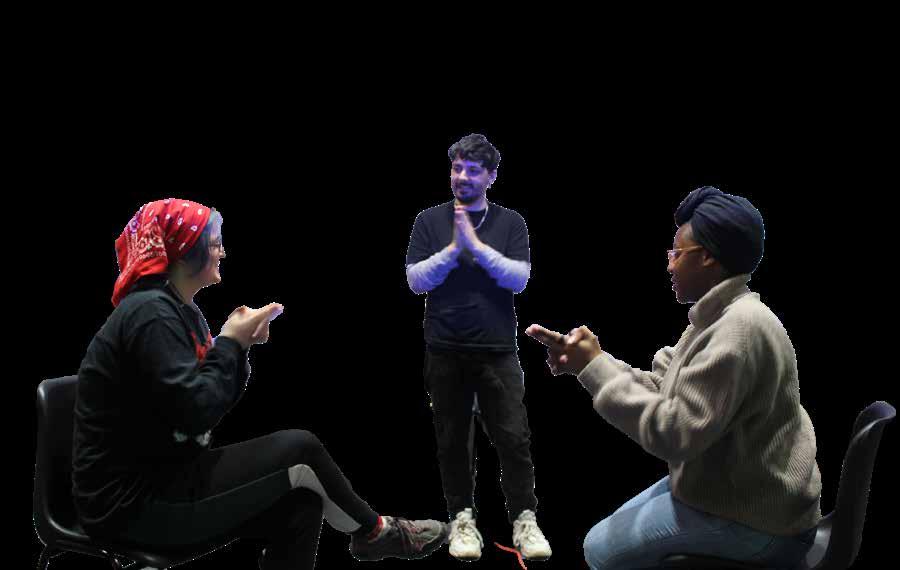
We launched our Creative Producers scheme recruiting 12 care experienced young people through taster sessions, PA inductions, celebration events for Care Leavers and holiday clubs. Together we built an exciting programme of activities and professional development opportunities, delivering workshops with the group so far including stop motion animation, poetry, beat boxing, ceramics, photography, protest stickers, and theatre trips.
Site Gallery
Sister System
£309,090 over 3 years
Towards unrestricted core costs empowering care-affected girls from underrepresented minorities, and the organisations which exist to serve them, to change systems, processes and policies to better meet their needs.
Site Gallery Ltd
£150,000 over 4 years
Towards project costs for Care Leavers in the Cultural Industries: Creative talent in a more inclusive sector.
South London
Refugee Association
£250,000 over 3 years
Towards core costs for the youth policy and participation programme, working with care experienced, young people subject to immigration control to reduce the injustice and inequity they experience.
The Care Experienced Movement
£50,000 over 1 year
Towards core costs to sustain and develop The Care Experienced Movement into an organisation that supports all care experienced people.
The Centre For Justice Innovation UK
£300,000 over 3 years
Towards unrestricted core costs to tackle systemic inequities faced by women and children within the criminal and family justice systems.
The National House Project
£210,000 over 3 years
Towards unrestricted core costs to improve the long-term support offer for young people leaving care.
A Fairer Future grants
Voices From Care Cymru
£250,000 over 3 years
Towards unrestricted core costs to support care experienced young people in Wales to participate in Radical Reform, driving change in the care system.
Youth Leads UK
£135,000 over 3 years
Towards unrestricted core costs to develop an organisation empowering young people to become leaders and change-makers.
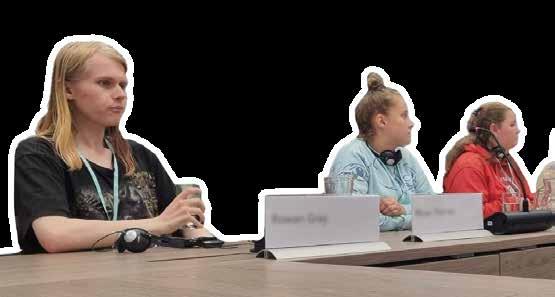
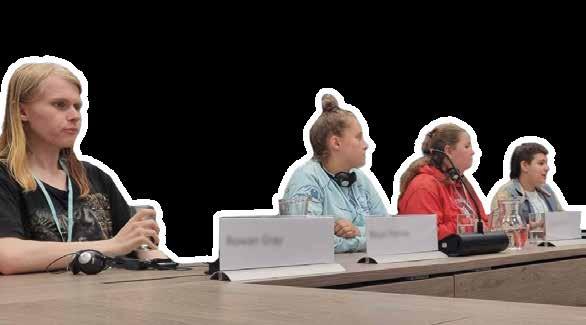
We have been able to build our Advisory Group of care experienced young people, provide coaching and training and support them in advocating for change. This year their advocacy has influenced the new Welsh Corporate Parenting Charter and legislation removing profit from children’s social care.
In 2024, Youth Leads UK reached our best-ever recruitment numbers and strongest financial performance to date: a result of the incredible effort and dedication of our team and supporters. We took the decision to recruit four of our programme alumni as Youth Engagement Officers which has been a game-changer in outreach and delivery leading to over 250 young people graduating from our programmes. We also secured the backing of Greater Manchester Mayor, Andy Burnham, to extend our Civic Leadership Programme aiming to get younger people to serve in public life as charity trustees, magistrates, and school and NHS governors.
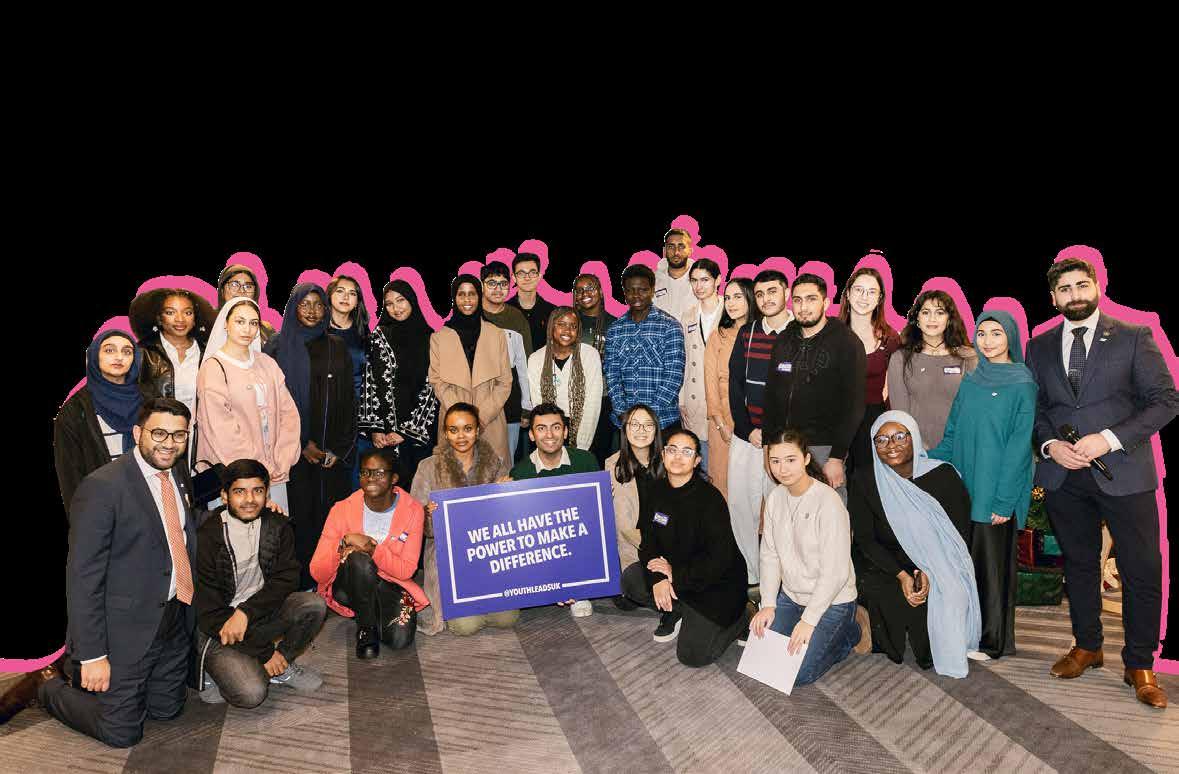
A Fairer Future grants
Gender justice
Bawso
£225,000 over 3 years
Towards core costs for policy and influencing work to improve the lives of victims of violence and abuse in Wales.
End Violence Against Women Coalition (EVAW)
£240,000 over 3 years
Towards unrestricted core costs to shape state responses and public attitudes to violence against women and girls.
Equality Network
£180,000 over 3 years
Towards core costs to support the work of Scottish Trans.
Fair Treatment For The Women of Wales
£180,000 over 3 years
Towards unrestricted core costs to support women with disabilities and long term health conditions to address injustices and challenge discrimination.
Faith and Violence Against Women and Girls
£60,000 over 15 months
Towards unrestricted core costs for the organisation’s development as an independent charity and continuation of activities.
FiveXMore
£10,000 over 1.5 years
Towards core costs in participating in the New Connections Network.
Gendered Intelligence
£300,000 over 3 years
Towards unrestricted core costs to improve trans lives through direct support, education and training, and public engagement.
Glitch
£210,000 over 3 years
Towards unrestricted core costs to ensure Black women and marginalised communities can thrive online.
Level Up
£250,000 over 3 years
Towards core costs to further campaigns to address gender injustice in the UK.
LGBT + Consortium
£80,000 over 2 years
Towards project costs for the Trans Organisations Network, a unique strategic and supportive network of trans and non-binary led organisations.
Southall Black Sisters
£250,000 over 3 years
Towards unrestricted core costs to enable the continuation of essential policy, campaigning and research work towards gender and migrant justice.
Southall Black Sisters’ NRPF (No Recourse to Public Funds) campaign led to reforms extending the Migrant Victims of Domestic Abuse Concession. We are proud of the momentum gained as we continue to advocate for settlement rights and broader protections for all migrant victim-survivors, negotiating with the new government for these life-saving measures.
Southall Black Sisters
A Fairer Future grants
The Motherhood Group
£300,000 over 3 years
Towards project costs to support a partnership approach to supporting inclusive community engagement to document the experiences of Black mothers facing perinatal and postnatal mental health challenges.
The Three Hijabis
£70,000 over 2 years
Towards core costs to make their safe space work more sustainable and create a mentoring and coaching programme for Muslim women and women of colour working in social justice spaces across the UK.
2024 has been a transformative year for Black maternal mental health advocacy and support. We’re immensely proud of reaching unprecedented engagement levels, with 1,200 registrations for Black Maternal Mental Health Week and meaningful connections with over 1,500 mothers, healthcare professionals, student midwives, charity CEOs, and Members of Parliament through our Black Maternal Health Conference. Our evidence-based training programs have equipped healthcare practitioners with cultural competency skills, directly informing our groundbreaking Black Maternal Mental Health Report. The launch of our digital platform (Blackmums) represents a significant milestone in creating accessible, safe spaces for Black mothers, effectively combating isolation through virtual community building. Through our innovative programs like Music for Mind and Creativity for Calm, we’ve established both physical and digital sanctuaries where Black mothers can authentically share their experiences and access culturally responsive support.
The Motherhood Group

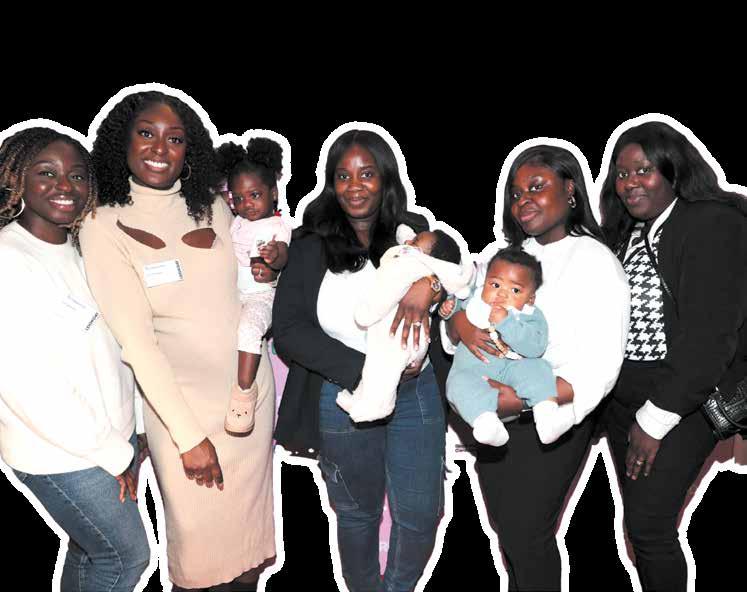
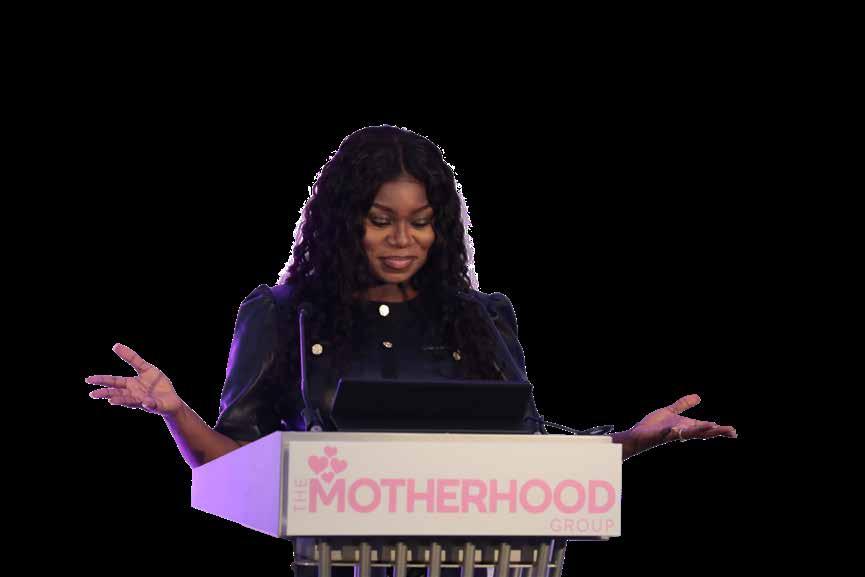
A Fairer Future grants
Migrant justice
Asylos
£120,000 over 3 years
Towards core costs to deliver work improving asylum policy and practice in the UK, using expertise in Country of Origin Information.
City of Sanctuary UK
£162,000 over 3 years
Towards unrestricted core costs for building a welcome movement for people seeking sanctuary.
Detention Action
£180,000 over 3 years
Towards unrestricted core costs to support those in immigration detention and to campaign for a more just, equitable and humane immigration system.
Focus on Labour Exploitation
£150,000 over 3 years
Towards core costs to enable them to challenge labour exploitation and protect the rights of vulnerable workers.
Global Dialogue (NRPF Partnership)
£300,000 over 3 years
Towards project costs for the No Recourse to Public Funds (NRPF) Partnership - enabling the movement to end NRPF.
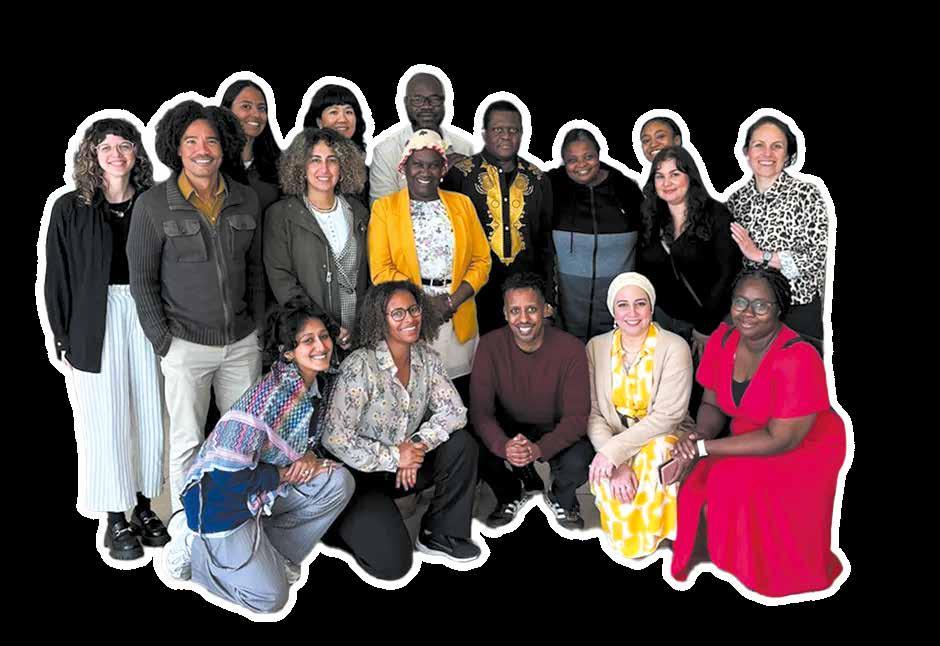
In
2024, we launched the Shaping the Future Fund to boost leadership in the migration sector, and the NRPF Partnership, working to build power to end the harmful No Recourse to Public Funds policy that drives poverty. Both are led by people with deep practice expertise and lived experience of the migration system, and shift power and resources through collaboration.
Migration Exchange at Global Dialogue
A Fairer Future grants
In 2024, we welcomed Mardin to the team through our Stage Door Programme for people with lived experience of displacement, and co-created From Here On with hundreds of young people and Gecko Theatre, a physical theatre performance and educational programme about safe routes for children seeking refuge in the UK and Europe from the Kindertransport to today, in partnership with Safe Passage International.

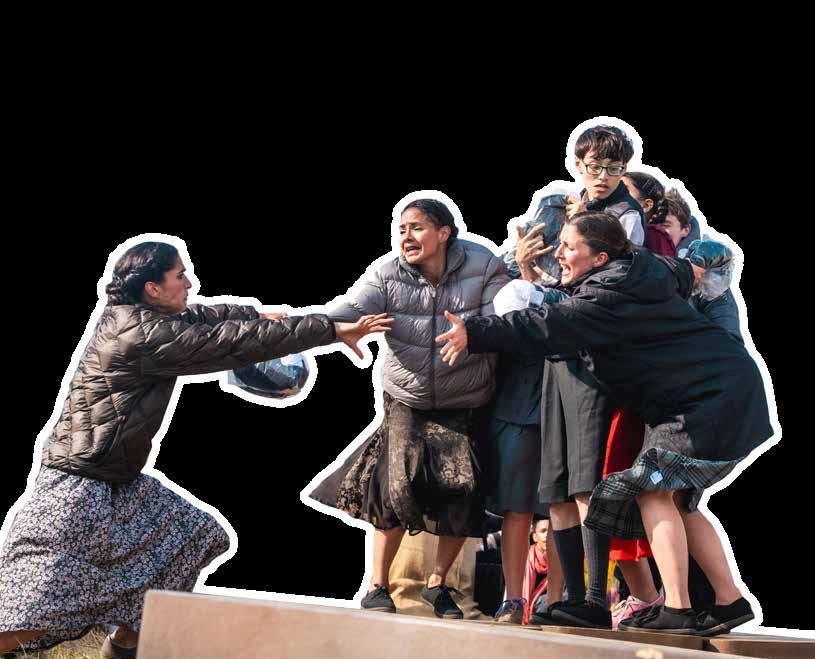
Good Chance Theatre
£150,000 over 3 years
Towards unrestricted core costs for co-produced creative theatre and art that develops displaced artists, motivates audiences and amplifies partnerships to improve public understanding of migration in the arts sector and beyond.
Kalayaan
£180,000 over 3 years
Towards unrestricted core costs to improve the lives of migrant domestic workers in the UK.
Medical Justice Network Limited
£180,000 over 3 years
Towards unrestricted core costs to tackle systemic injustice and dehumanising treatment in immigration detention.
Migrant Democracy Project
£150,000 over 3 years
Towards core costs for a Community Organiser role to support all Migrant Democracy Project’s charitable work streams, including voter registration, advocacy and local-level organising.
Migrants in Culture CIC
£70,000 over 2 years
Towards core costs to resource organisers and artists to build more creative and powerful social movements, as well as grow their collective capacity to imagine and live without borders.
Migrants Organise Ltd
£180,000 over 3 years
Towards unrestricted core costs to build capacity of migrant and refugee organisers to build alliances, effectively participate in decisionmaking on issues affecting their lives, and challenge negative narratives.
Migrants’ Rights Network
£150,000 over 3 years
Towards unrestricted core costs for building intersectional alliances for transformational change to immigration systems and enabling migrants, including refugees, to create affirming narratives.
Public Law Project
£150,000 over 3 years
Towards unrestricted core costs to support strategic advocacy and legal interventions to advance migrant justice and influence immigration policy reform.
Reunite Families UK
£119,309 over 3 years
Towards core costs to sustain and enhance advocacy and policy influencing efforts alongside providing services for those affected by UK Spouse Visa rule changes.
Safe Passage
£180,000 over 3 years
Towards core costs of grassroots and youth campaigning and advocacy work in the UK to mobilise support for safe routes for refugees.
A Fairer Future grants
Racial justice
Action for Race Equality (Alliance for Police Accountability)
£180,000 over 1 year
Towards project costs for the Alliance for Police Accountability to transform policing by promoting a public health approach to addressing serious violence, and empowering Black communities across England and Wales.
Association of Chief Executives of Voluntary Organisations (Acevo)
£30,000 over 1 year
Towards project costs for one year’s cost of the Home Truths 2 project to increase racial equity in civil society organisations.
Coffee Afrik CIC
£200,000 over 3 years
Towards core costs for charitable programmes for creating healing community hubs, building community power and reimagining public health delivery.
Comic Relief (Power of Pop Fund)
£250,000 over 2 years
Towards delegated grant-making and field-building as part of the Power of Pop Fund, a pooled fund supporting organisations working at the intersection of popular culture and social change in the UK.
GATE Herts
£120,000 over 3 years
Towards unrestricted core costs of combatting the systemic issues perpetuating discrimination and hate crimes against Gypsy, Roma, and Traveller communities.
Kinfolk Network (KIN)
£180,000 over 3 years
Towards core costs including the salary of an operations lead, to support Black campaigners and organisers across the UK.
Milk Honey Bees
£70,000 over 2 years
Towards core costs to further understand and produce more representative data on the intersectional experiences of school aged Black girls across London.
Museum of Colour
£70,000 over 2 years
Towards core costs for salaries of the Founding Director and General Manager to deliver on the sustainability and future governance of the digital museum.
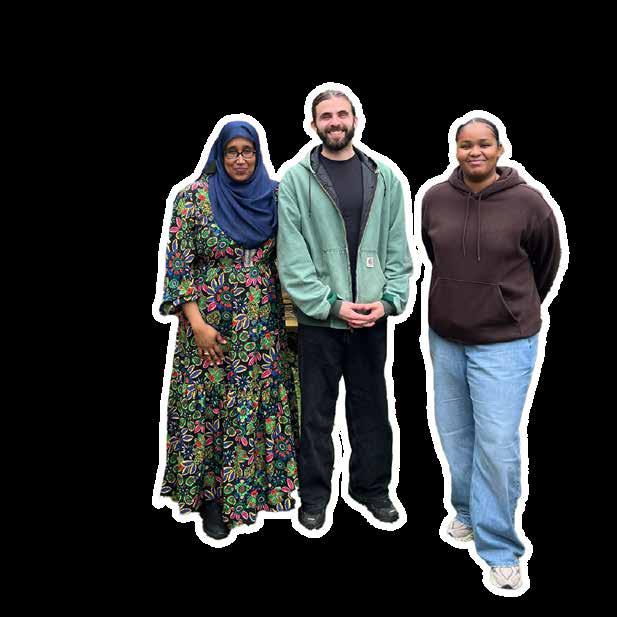
In 2024, we’ve deepened our solidarity and community wealth building models. Since the beginning, we’ve collaborated with women and young people to co-produce Community Hubs providing vital services. Today, we’re re-imagining programmes and community governance structures to realise the sustainable transfer of power, resources, and ownership (including land) back to the community. We believe increasing community ownership and building regenerative local economies is essential to fairer, anti-racist futures.
Coffee Afrik CIC
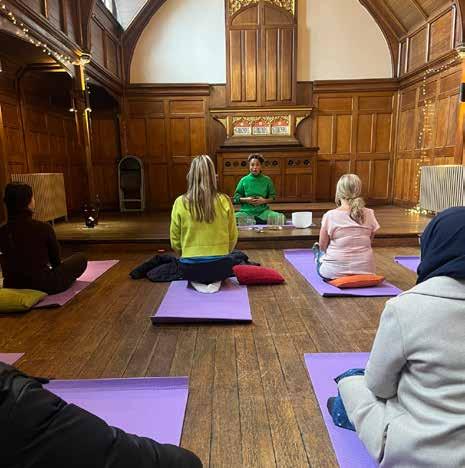
A Fairer Future grants
Rooted Finance
£200,000 over 4 years
Towards unrestricted core costs for the Financial Empowerment Alliance: a user-led, partnership campaign to expose and end the ‘ethnicity premium’ for financial products and services experienced by people from minoritised communities.
Social Change Initiative
£30,000 over 2 years
Towards project costs of learning support for a two-year programme to support Black Leadership activism in the Greater Belfast area of Northern Ireland.
Spark and Co BAME Hub CIC
£90,000 over 3 years
Towards core costs of tackling racial inequity and injustice by closing the communication and information gap that racialised communities face.
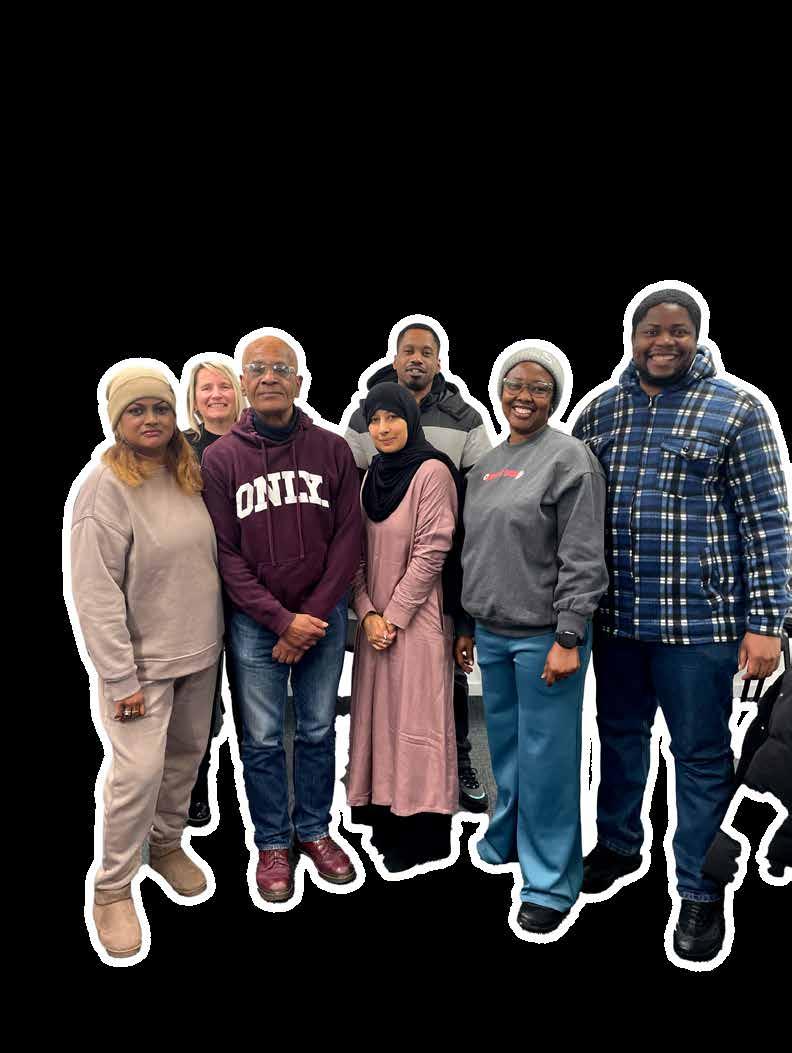
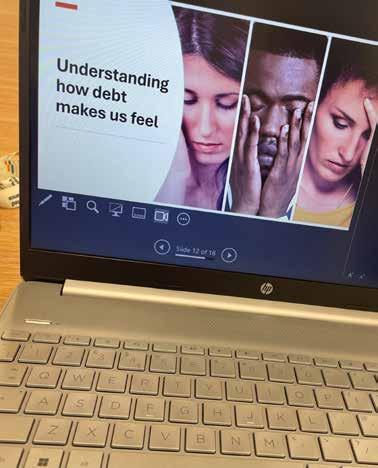
For Rooted Finance, the Racial Justice Network in Finance is a vital evolution of
our
work.
Our deep-rooted experience in debt advice has shown us the disproportionate impact of financial exclusion on diverse ethnic communities. We are using our understanding to directly challenge the systemic barriers that perpetuate the ‘ethnicity premium’. By combining this frontline knowledge with the powerful insights of our experts by experience, we’re able to drive systemic change that truly addresses the root causes of financial inequality for diverse ethnic communities who are financially excluded.
Rooted Finance
The A B Charitable Trust (Harm to Healing)
£75,000 over 1 year
Towards project costs for Harm to Healing, an initiative to address racial injustice in the criminal legal system through building an ecosystem of support and collaboration.
The Black Curriculum CIC
£70,000 over 2 years
Towards core costs to empower all students (aged 3-25) with a sense of national and cultural identity and belonging through the teaching of Black British history all year round.
The Black Wellbeing Collective
£70,000 over 2 years
Towards core costs to support a mental health and wellbeing service that prioritises the experiences of the Black community.
The Runnymede Trust
£280,000 over 4 years
Towards unrestricted core costs to support a strong racial justice voice in the context of deepening inequalities, an emboldened far right and the opportunity to lead on influencing the Government.
The Traveller Movement
£150,000 over 3 years
Towards core costs to reduce disproportionality for Gypsy, Roma, Traveller people across the education and criminal justice system through a programme of strategic advocacy to bring about systemic change.
A Fairer Future grants
The Ubele Initiative
£300,000 over 3 years
Towards core costs to build the internal capacity of an organisation responding to the need for African diaspora communities to build community assets, flourishing social enterprises, and intergenerational leadership.
Utopia Theatre
£7,500 over 4 months
Towards project costs of Utopia’s Youth Academy to upskill young people with African oral storytelling, theatre and performance techniques.
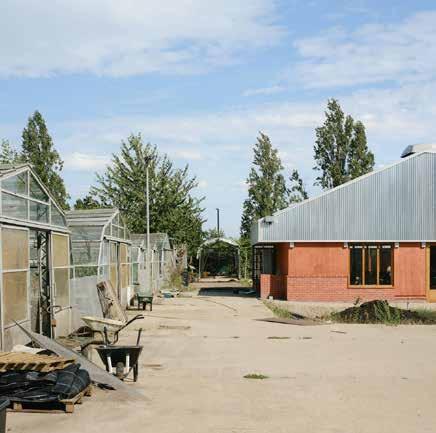
In 2024, we launched Agbero 2100, our flagship programme, shaping a bold, community-led vision for the future. We completed eco-buildings at Wolves Lane Centre, reinforcing our commitment to climate resilience. We also initiated We Need Answers, a vital community conversation in response to the UK race riots, fostering dialogue, accountability, and action for racial justice.
Ubele Initiative
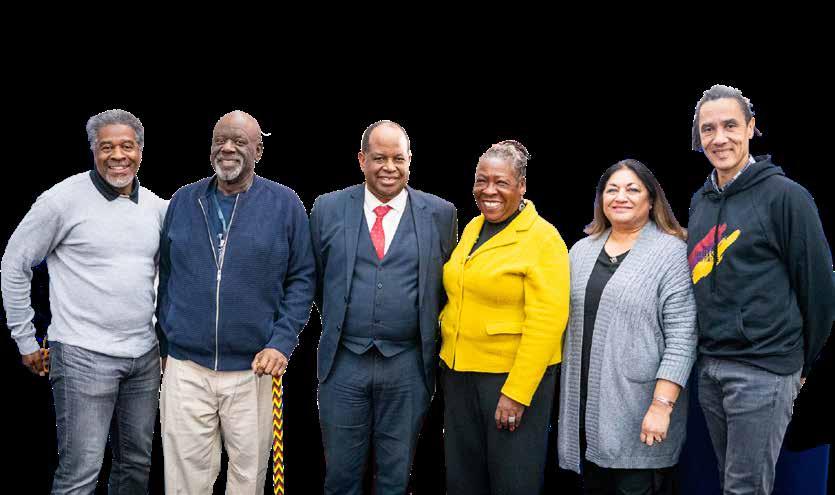
A Fairer Future social investments
Children and young people’s rights
2-3 Degrees
£300,000 over 7 years
An investment to support the sustainability and growth of a youth empowerment social enterprise that is led by and for members of communities experiencing inequity.
We Are Juno CIC
£585,000 over 7 years
An investment to support the provision of not-for-profit children’s residential care in Liverpool.
Migrant justice
Micro Rainbow CIC
£1,600,000 over 12 years
A follow-on investment in safe supported housing for LGBTQI asylum seekers.
A Fairer Future impact investments
Gender justice
Eka Ventures
£1,000,00 over 10 years
Recommendation for a £1m impact investment in Eka Ventures Fund II
Creative, Confident Communities
We want to strengthen the bonds in communities, helping local people to build vibrant, confident places where they can fulfil their creative, human, and economic potential.
Creative, Confident Communities

Veda Harrison Director of Creative, Confident Communities.
12 months is a long time when resourcing people, places and spaces around the UK to deliver long term change.
What we witnessed in our communities over the past year demonstrated what happens when community connection continues to erode and negative forces that seek to keep people divided take hold. At the same time, the ongoing hard work of community leaders across all civil society groups has shown that supporting them and their plans for change is even more vital now and in the future.
The events of Summer 2024 highlighted how our three Creative, Confident Communities strategic priorities can play a role in any local or national responses:
•Communities working together for change – resourcing community spaces and organisations to lead reparative and conciliarity conversations about the future of their communities
•Community driven enterprise and regeneration – supporting the design of community-led economic strategies that mean wealth is built and retained in communities and places
•Community-led art and creativity –resourcing work which enables communities to acknowledge their differing relationships with their places that leads to ‘civic pride’.
The organisations highlighted in this section of the annual report are prime examples of this work – whether documenting the stories and experiences of local residents and citizens that can lead to local policy change (Peoples Voice Media)
or bringing local people together around an issue that they can campaign on to make life better for all (Action with Communities in Cumbria); local art practitioners using creativity to connect communities across faith, local business and geography and design local cultural provision that better reflects the communities identities and aspirations (artsdepot and Citizens in Power); or how reforming community access to land that can lead to wealth creation in areas of Scotland (Community Land Scotland).
We’ve also used our Tools budget to help us deepen our impact. For example, we supported an action research project with Locality and their members to understand the role of placebased community organisations within racial justice and develop anti-racist practice in the community sector.
These organisations and the many more in our Creative, Confident Communities portfolio are important in helping us know how and where resources are needed in order for us to fund the work that makes a difference to people, places and spaces across the UK.
Creative, Confident Communities grants
Communities working together for change
Action with Communities in Cumbria
£250,000 over 5 years
Towards core costs for supporting local partners and communities to work better together to make the Lake District a sustainable place to live, work and visit.
Anti Racist Cumbria
£400,000 over 4 years
Towards unrestricted core costs to support the continued work of Anti Racist Cumbria and to support its mission to make Cumbria the first anti-racist county in the UK.
Big Local Works
Bermondsey
£210,000 over 4 years
Towards core costs to support ‘Made in Bermondsey’, developing people-powered regeneration.
Civic Power Fund
£30,000 over 1 month
Towards delegated grant-making for emergency funding for community organisations leading work on migrant and racial justice, who have been impacted by the Islamaphobic and racist riots of Summer 2024.
Comic Relief
(Global Majority Fund)
£770,000 over 31 months
Towards delegated grant-making support for Phase III of the Global Majority Fund for onward grants to small Global Majority-led organisations, and associated management costs, including the ongoing costs of a Fund Reference Group.

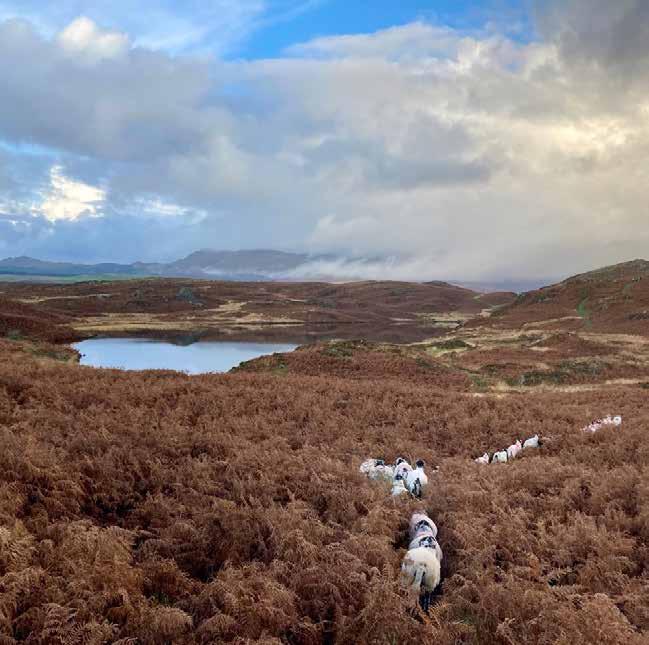
Three young Cumbria Farmers took up the challenge of becoming Photo Agents with a professional photographer. Their work has been displayed and presented to the Lake District National Park Partnership with their own narrative of the pictures, describing what they mean in the context of the National Park.
Action with Communities in Cumbria


We discussed our thoughts on the outcomes, which the Lake District National Park Partnership hope to achieve, and drafted the lyrics based on what we agree with and what we dislike. I took the song over the course of two months, filmed and edited the video as a visual to the song to help get across the message. It was an amazing opportunity to work with others, and to have our voice heard’.
Archie, a participant in one of the groups Action with Communities in Cumbria facilitated
Watch ‘Forever & For Everyone’, a music video created by one of the groups facilitated by Action with Communities in Cumbria sharing their thoughts on the Lake District National Park Partnership’s outcomes.
Creative, Confident Communities grants
Community Organisers
Limited
£126,000 over 3 years
Towards core costs to strengthen the action pillar of Community Organisers’ work through listening campaigns led at a local level by Social Action Hubs.
Community-Led Action and Savings Support
£200,000 over 2 years
Towards unrestricted core costs to support the Community Savers movement, enabling stronger women-led organisations and collective action from the neighbourhood upwards.
Cysters
£70,000 over 2 years
Towards unrestricted core costs of supporting Cysters’ organisational development and to allow it to continue and expand its work in reproductive health, menstrual and maternal justice.

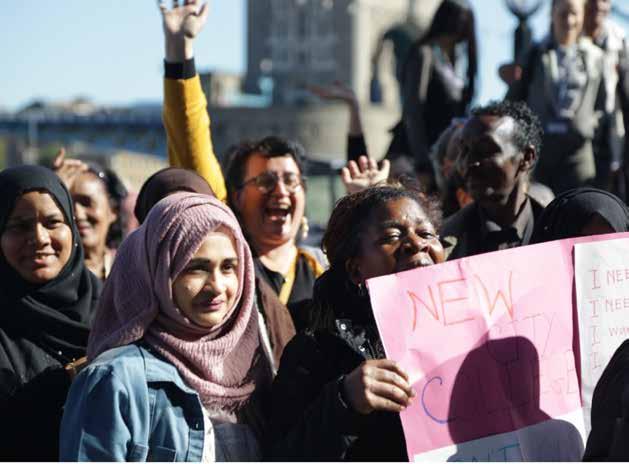
With support from Esmée Fairbairn Foundation, we will be able to accelerate our impact by increasing our reach through the engagement of new Social Action Hubs. Many organisations across our network spend significant amounts of timing addressing the symptoms of inequality. We want to work with them to start to identify the root causes of what is driving inequality and build their collective power to push for changes in the system.
Community Organisers
Foundation Scotland
£500,000 over 5 years
Towards unrestricted core costs to enable communities in Edinburgh to do the deep work needed to address the root causes of poverty and racism in an environmentally sustainable way.
Grapevine
£300,000 over 3 years
Towards unrestricted core costs and for work on Connecting for Good: a self-sustaining movement of 27 community-led initiatives using their collective vision and power to make Coventry a fairer and more equitable place.
Hasrat
Sultan Bahu Trust
£200,000 over 3 years
Towards project costs of a collaboration to build the capacity of faith groups to lead, and engage in, community-led climate action in disadvantaged areas of Birmingham and to share the learning more widely.
Hope For The Future
£200,000 over 3 years
Towards unrestricted core costs and developing models of impactful, inclusive, and equitable climate action, through partnership work on Climate Assemblies.
Leeds Community Foundation
£90,000 over 9 months
Towards delegated grant-making to Leeds Community Foundation to distribute the Involving Young People Fund grants made by a locally recruited and trained youth panel.
New Economics Foundation
£90,000 over 1 year
Towards project costs for organising with communities to campaign for a Living Income pilot in Greater Manchester.
Open Data Manchester CIC
£120,000 over 3 years
Towards core costs and work on empowering communities through data.
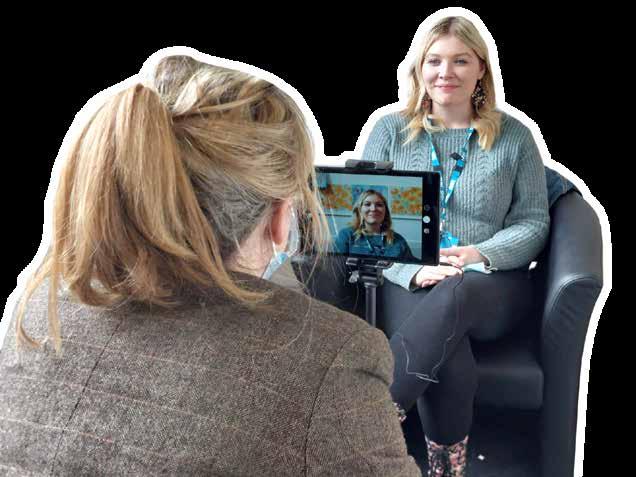
At People’s Voice Media, we are on a mission to change the world, one story at a time. We use Community Reporting –a form of digital storytelling – to enable people to use their own and their peers’ lived experiences as tools for social change. We work across geographies and communities, and often on a project-by-project basis.
People’s Voice Media
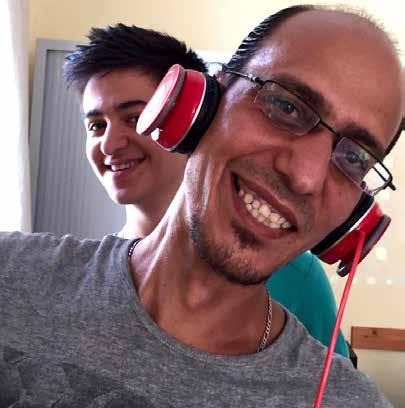
Opus Independents Ltd
£90,000 over 6 months
Towards project costs for continuing to demonstrate the Transformational Capabilities of Cities in Sheffield.
Our Future
£200,000 over 2 years
Towards unrestricted core costs for enabling communities in Grimsby to flourish and benefit from the transition to a green economy.
Passion4Fusion
£70,000 over 2 years
Towards core costs to continue with core work around supporting young people from Global Majority backgrounds in Edinburgh and to explore the feasibility of managing a residential children’s home in Edinburgh.
People’s Voice Media
£130,000 over 3 years
Towards unrestricted core costs to enable the strategic scaling of the Community Reporter network, focusing on working with the lived experiences of marginalised communities to inform and influence services and policy.
Thames Life
£250,000 over 3 years
Towards core costs to activate, support and sustain community power, social enterprise and creative cultural empowerment driven by residents and community groups in Thames View and Barking Riverside.
The Corra Foundation
£161,000 over 3 years
Towards project costs to drive forward the final phase of Getting Alongside Communities’ 10-year commitment and collaborative work alongside communities and partners.
The Soil Association
£750,000 over 3 years
Towards unrestricted core costs for the Sustainable Food Places Legacy Phase, supporting communities to embed food systems change, leading to an equitable and resilient movement focused on diversity and inclusion.
Urban Community Project
£70,000 over 2 years
Towards core costs to continue addressing the inequalities and injustices of the Black and minoritised communities they work with in the Pollokshields area of Glasgow.
York Travellers Trust
£150,000 over 3 years
Towards core costs for instilling sociocratic structures within York Travellers Trust to develop Gypsy, Roma and Traveller individuals to become advocates for their communities and demand change to create systems, policies and practices that work for them. Young Manchester
£50,000 over 1 year
Towards unrestricted core costs to develop a new business model contributing towards sustaining youth empowerment activities for the future in Manchester.
Creative, Confident Communities grants
Community-led art and creativity
64 Million Artists
£195,000 over 3 years
Towards core costs to support the Creativity Champions programme which aims to demonstrate evidence of community change through creativity.
Anansi Theatre Company
£10,000 over 1.5 years
Towards core costs in participating in the New Connections Network.
Art Fund
£60,000 over 1 year
Towards project costs for the creation of a suite of resources to support Community Engagement, Co-creation, and Co-curation in museum exhibition touring as part of the Going Places programme.
artsdepot
£180,000 over 3 years
Towards project costs for a programme supporting three communities in Barnet to develop, deliver and embed their own creative visions for their communities.
Belgrade Theatre Trust (Coventry) Limited
£200,000 over 3 years
Towards core costs using the power of participation, engagement, and co-creation to be more inclusive, invested in career pathways and social change, and working with, for, and by communities to shape where they live.
Bradford Culture Company Limited
£250,000 over 2 years
Towards core costs for the delivery of Magic Waiting, Bradford UK city of Culture 2025’s community engagement programme.
In 2024, artsdepot built on our ‘Beyond Our Walls’ outreach work presenting a Fun Palaces Festival in Colindale, mentoring 10 creative businesses, and touring a primary age show to school halls reaching 1045 pupils including those from Muslim, Jewish and Catholic faith schools. We placed artist residencies in Mapledown SEN school and The Pavilion (Pupil referral Unit).
artsdepot

Creative, Confident Communities grants
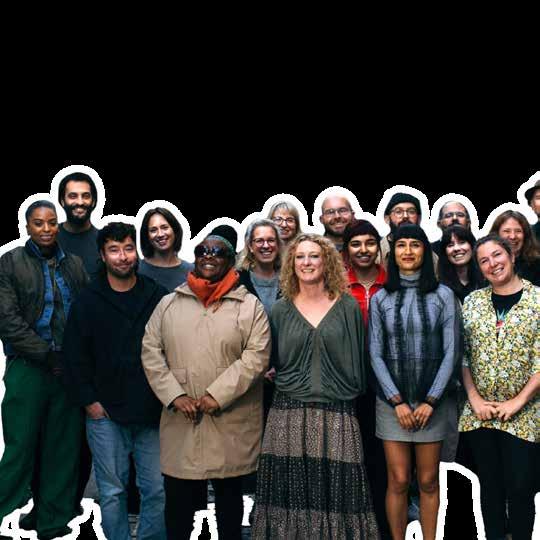
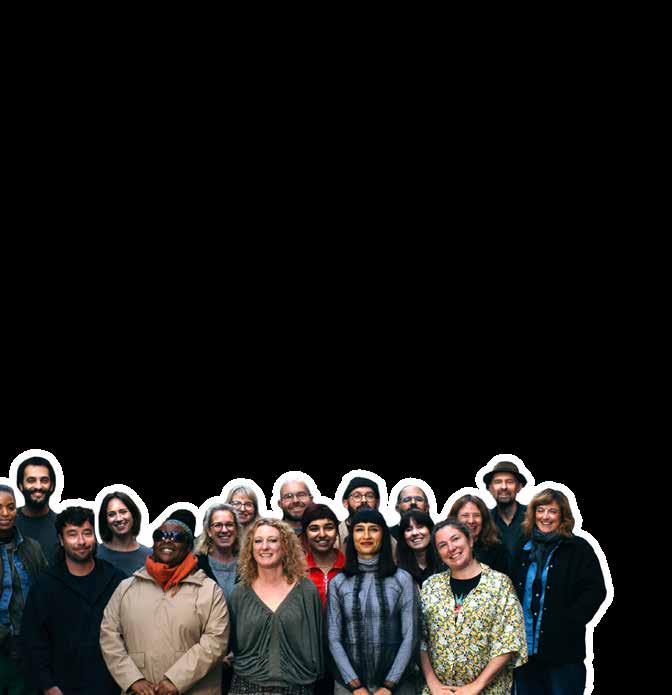
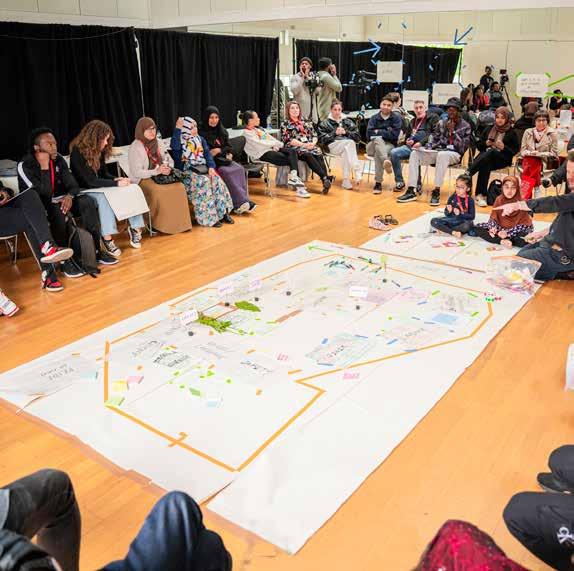
When network members gathered together for the first time in October, the whole idea became real. We could see the potential in the room. We could begin to imagine and develop the possibility of a creative and cultural sector which is led and shaped by communities.
Citizens in Power
Watch a short film about Jury for Joy by Everyone’s Here, a group that is a member of the Citizens in Power Network. The citizens’ jury is shaping the programme of Everyone Here in West Cumbria. It’s just one an example of the work by a Citizens in Power Network member.
Citizens in Power
£120,000 over 3 years
Towards project costs to support the delivery of eight action plans to embed long-term citizen-led decisionmaking, and enable communities to lead culture as a driver for change.
Common Wealth
Theatre Limited
£144,000 over 3 years
Towards core costs to underpin creative work with communities in Bradford and East Cardiff, enabling them to develop their creativity, raise local issues and build momentum for action.
Community Arts by ZK CIC
£70,000 over 2 years
Towards core costs to connect communities from the Global South with culture and creativity in Pendle.
Creative Lives
£150,000 over 4 years
Towards unrestricted core costs to underpin the Creative Citizens programme of work to strengthen and build networks between local creative groups and other organisations and agencies in their local area.
De La Warr Pavilion
Charitable Trust
£202,000 over 3 years
Towards project costs for Creative Sidley, a creative process led by local young people to establish sustainable, locally-led creative and cultural participation for the community.
Home Live Art Limited
£139,752 over 3 years
Towards core costs to expand the community-led co-creation model, Good Stuff, in Hastings, enabling the organisation and local residents to collaborate on a shared creative vision for transformative change in the town.
intoBodmin CIC
£247,000 over 3 years
Towards project costs for intoCommunity, building a model of community-led cultural participation in Bodmin.
Jumped Up Theatre
£210,000 over 3 years
Towards project costs of Platform8, which aims to change how audiences engage in the arts, and how organisations work with children, young people, and families in Peterborough.
Museums Association
£2,720,550 over 2 years
Towards delegated grant-making for the Esmée Fairbairn Communities and Collections Fund launching at the end of 2024.
Creative, Confident Communities grants
Museums Association
£22,421 over 2 years
Towards delegated grant-making providing additional funding into the Esmée Fairbairn Collections Fund over the 2023 to 2024 period.
Museums Galleries Scotland
£200,000 over 3 years
Towards project costs for the Community-Museum Partnership grant fund as part of Delivering Change, working with museums, galleries and community groups across Scotland to improve access to culture.
National Youth Theatre of Great Britain
£80,000 over 1.5 years
Towards project costs to embed and strengthen the legacy of the Assemble programme, connecting young people who are learning disabled and/or neurodivergent to the social and cultural opportunities of their areas.
NoFit State Community Circus Ltd
£195,000 over 3 years
Towards core costs to support the continued work and development of the Square Mile Collective and to support the creative and cultural programme run by NoFit State.
Out There Arts
£120,000 over 4 years
Towards core costs of Creative Community Animateurs, a leadership/empowerment programme supporting diverse residents of Nelson Ward, Great Yarmouth, to become cultural change makers.
Platform Thirty1 Limited
£364,046 over 39 months
Towards project costs of a refreshed Creative Civic Change peer learning network to develop creative placemaking work in communities, influencing and impacting wider policy and taking forward the programme’s legacy.
Southampton Forward
£200,000 over 2 years
Towards core costs of a programme of co-creation and collaboration which uses culture and creativity as drivers for change in Southampton.
Strike A Light (Gloucester)
£280,000 over 4 years
Towards unrestricted core costs to continue diversifying who accesses, creates and leads the arts in Gloucester to create long-term, systemic change.
Sunderland Music, Arts and Culture Trust
£215,000 over 3 years
Towards project costs of Culture Start, a partnership-based model enabling children and young people living in poverty and disadvantage in Sunderland to experience, participate and gain creative and cultural skills.
The Chipping Norton Theatre Limited
£40,000 over 2 years
Towards core costs supporting the Take Part programme of community arts in a rural area.
The Citizens Theatre
£308,315 over 3 years
Towards project costs for the Navigate: In Residence Programme, working with partners to provide communities impacted by the UK’s hostile asylum and immigration system, with long-term cultural opportunities.
Community driven enterprise and regeneration
Earth in Common
£15,000 over 1 year
Towards core costs for stabilising support.
Kitty’s Launderette
£165,000 over 3 years
Barking & Dagenham Giving
£480,500 over 3 years
Towards project costs for the GROW Fund: a community-led social investment readiness programme in Barking & Dagenham.
Development Trusts
Association Scotland
£400,000 over 3 years
Towards project costs for the Democratic Finance Scotland Programme, supporting communities to be agents of change by unlocking local wealth and control through democratic finance sources and tools.
Down to Earth Project
£120,000 over 2 years
Towards project costs for ‘Building Community’: a pilot approach to community-led regeneration in grassroots, community-led housing schemes at design stage.
Towards core costs to research, test and develop strategic growth opportunities for Kitty’s Launderette, creating a more resilient business and lasting community impact.
Onion Collective CIC
£300,000 over 3 years
Towards core costs to support the next phase of Onion Collective’s work, demonstrating the next economy in action and amplifying the movement for change.
Worcester Community Trust
£212,000 over 2 years
Towards project costs to enable Worcester Community Trust to explore models of devolved leadership with their local communities.
Creative, Confident Communities
social investments
Community driven enterprise and regeneration
Bristol Community Energy Limited
£90,000 over 1 year
An investment towards £215k installation costs of solar panels.
East Marsh Community Ltd
£500,000 over 7 years
An investment towards the cost of purchasing homes for the benefit of the East Marsh community.
Solar for Schools
£90,000 over 1 year
An investment towards the costs of installing solar panels on schools.
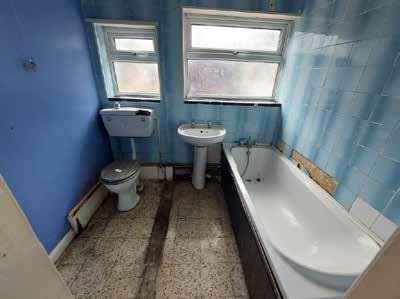
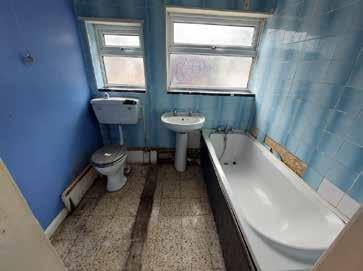

We’re proud of the tangible impact East Marsh has had on lives. For example, by refurbishing an empty home for one of our tenants, we provided her family a safe, affordable home and cut her energy costs. We also helped our tenants close down a drug house which we have now bought and will be turning it into a family home, proving our dedication to rebuilding lives, not just properties.

Creative, Confident Communities impact investments








Community driven enterprise and regeneration
Schroders Capital
£1,000,000 10 years
Investment in a managed fund to reduce social inequality in the UK.
Our Natural World
We want to ensure that our natural world is restored and protected, and that people benefit from that recovery.
Our Natural world

Liam McAleese Director of Our Natural World
At Esmée, we believe that to address the nature and climate crises, we need to ensure that everyone can contribute to solutions and share the benefits. This is why we’re proud to champion and support initiatives towards a more inclusive and diverse sector.
Examples include All the Elements who work with leaders to improve diversity across conservation, environment, sustainability, and sport; Women’s Environmental Network’s work on gender and diversity in addressing the climate and nature emergencies; Land in Our Names, a Black and People of Colour-led grassroots organisation working to address inequity and reimagine land stewardship towards climate and racial justice; and the Movements Trust who are doing vital work to empower and build the capacity of grassroots communities for a just and sustainable society.
We’re also working with organisations who are amplifying youth voices and supporting young people to drive change such as Students Organising for Sustainability, Young Sea Changers Scotland, Action for Conservation, and London Wildlife Trust. And we continue to support work that centres farmers and fishers in shaping a more sustainable future. This includes organisations we’ve funded for the first time such as Just Farmers; North East Cotswold Farmer Cluster; Câr-y-Môr, a community-owned ocean farm; and UK Women in Fisheries, who aim to grow and support a network of women working in the fishing and seafood sector.
We continue to seek new and unusual partnerships. We’re supporting a cross-sector campaign to end the sales of peat involving retailers, growers and NGOs; in nature friendly farming, we supported a new collaboration with Royal Agricultural University and small businesses on a series of innovation challenges; and our Blue Spaces programme has enabled some interesting collaborations between community, arts and environment organisations, such as that being led by the North Wales Wildlife Trust.
We’ve used our Tools budget to support a range of proactive actions to progress our strategy. For instance, connecting and convening organisations around food and agriculture by hosting events at the Groundswell Regenerative Agriculture Festival and Oxford Real Farming Conference, as well as provided seed funding for ‘Fields Good’, Northern Ireland’s first regenerative agricultural festival. Other examples include work with the sector to co-design a roadmap for seascape restoration in the UK, and research into food supply chains. Finally, our work to unlock new models of financing nature recovery includes work to ensure that communities have access to advice, opportunities and models to access finance to restore nature. We’re also supporting a pilot partnership led by Community Land Scotland to work with local communities to inform and shape natural capital projects that benefits both people and planet.
Our Natural World grants
Fishing in tandem with nature
Fishtek Marine
£143,560 over 1.5 years
Towards project costs of a pilot to test the viability of alternative fishing methods for scallops in UK seas.
International Pole and Line Foundation
£60,000 over 1.5 years
Blue Marine Foundation
£300,000 over 3 years
Towards core costs to progress work with fishers and fishing communities, to include sustainable fisheries management and strengthening marine protected areas.
Câr-y-Môr
£70,000 over 2 years
Towards project costs for a finance person.
Finance Earth
£82,350 over 1 year
Towards project costs to develop a Fisheries Improvement Fund to enable UK fisheries to improve their practices through innovative, gear adaptation and technology.
Towards project costs for comprehensively assessing the social and environmental sustainability of the UK’s newly established rod and reel bluefin tuna fishery and developing a roadmap for sustainable development.
Newcastle University
£89,969 over 10 months
Towards project costs supporting an emerging ‘small-scale fisheries network’ to address the decline in sustainable (inshore and low impact) small-scale fishing across UK coastal communities.
Nourish Scotland
£239,919 over 2 years
Towards project costs of using an Aquatic Food Panel to build consensus in the seafood sector to support a transition to sustainable and ethical blue food in Scotland.
Oceana UK
£300,000 over 3 years
Towards core costs for Oceana UK’s campaign for an end to overfishing in UK waters.
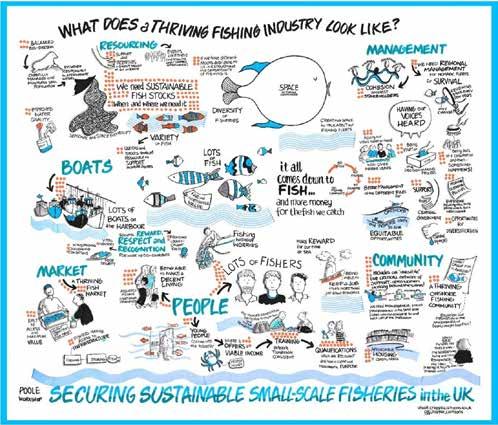
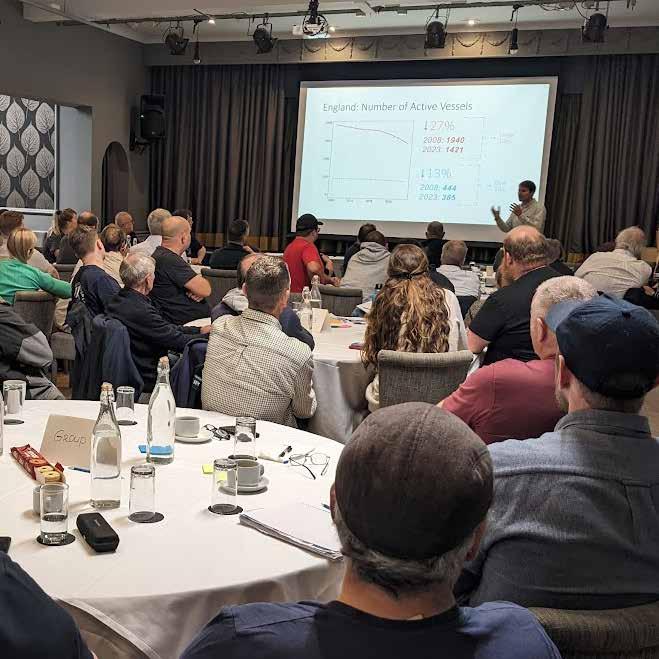
Our work through the small-scale fisheries network shines new light on the decline of inshore and small-scale fisheries across England, highlighting the importance of viable livelihoods in securing sustainable fisheries and the benefits they produce for coastal and rural communities. The national workshops, and momentum generated by them, is helping to promote the voices of small-scale fishing communities in fisheries policy and debate. Newcastle University
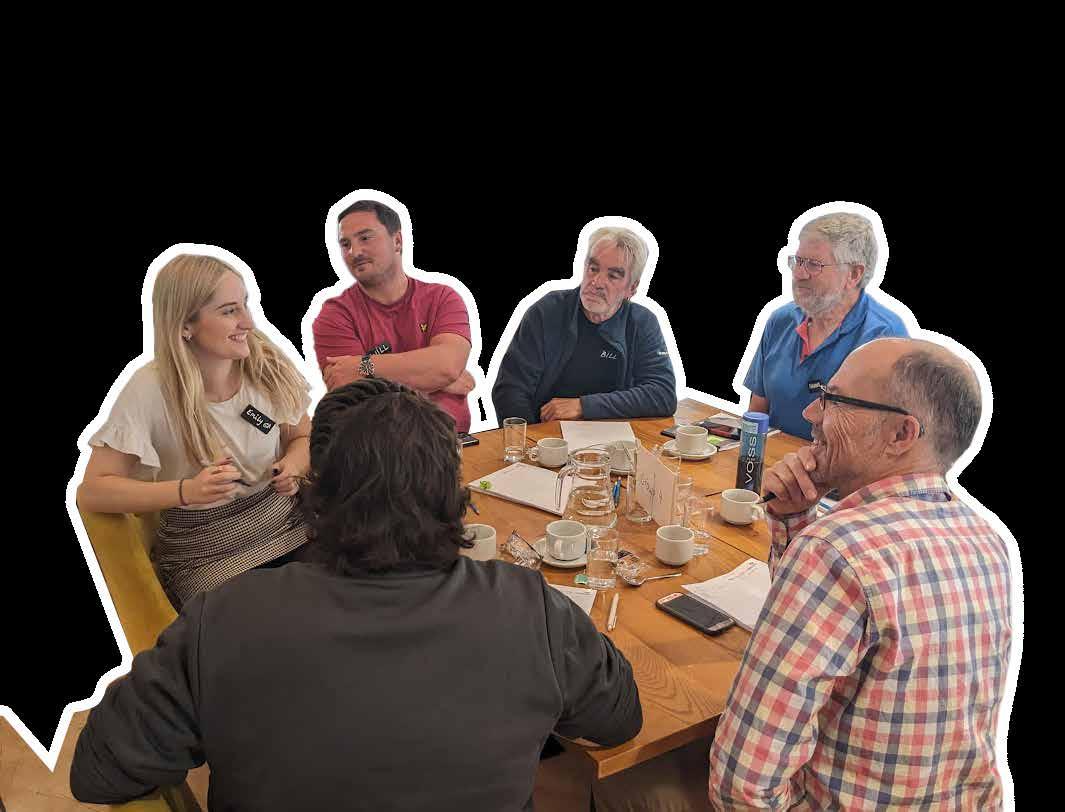
Our Natural World grants
Scottish Creel Fishermen’s Federation
£400,000 over 5 years
Towards core costs to strengthen the work of Scottish Creel Fishermen’s Federation to represent sustainable fishers and benefit fishing communities.
Seawilding
£264,810 over 3 years
Towards core costs to cover the salaries of two Seawilding employees for three years to deliver the native oyster and seagrass restoration programme.
UK Women in Fisheries
£73,000 over 2 years
Towards core costs to enable
Women in Fisheries to grow and support a network of women working in the fishing and seafood sector in the UK.
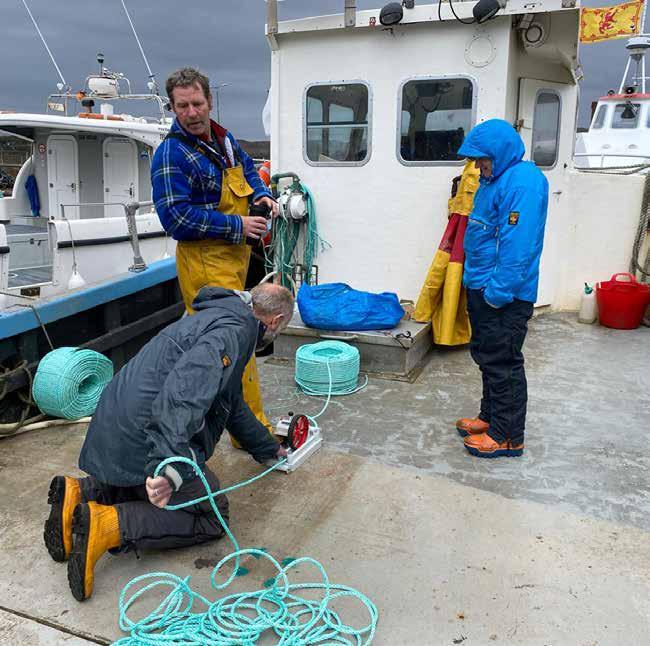
Scottish Creel Fishermen’s Federation represents small scale and low impact fishers within Scotland and also in Europe and on the world stage. We’re proud to be able to play our part in the various collaborations and coalitions that are making a real difference to fishing communities and our marine environment, which include the Our Seas coalition, the Scottish Entanglement Alliance and Low Impact fishers of Europe.
Scottish Creel Fishermen’s Federation
Freshwater
Angling Trust (Fish Legal)
£300,000 over 3 years
Towards core costs of Fish Legal’s strategic legal action and advocacy to protect and improve the freshwater environment.
Findhorn, Nairn, and Lossie Rivers Trust
£333,200 over 4 years
Towards project costs of the Findhorn Watershed Initiative.
Norfolk Rivers Trust
£540,000 over 4 years
Towards core costs for a regional project to accelerate restoration of chalk streams in East Anglia, providing a model of best practice of working at scale in freshwater conservation.
North Wales Rivers Trust Ltd
£425,700 over 3 years
Towards project costs to restore and maintain healthy water quality in rivers, improving salmon populations and the Menai straits shell fisheries for future generations.
North Wales Wildlife Trust
£16,000 over 6 months
Towards project costs of Gofod Glas, a creative project exploring human relationships with freshwater, highlighting water’s powerful influence on culture, society and the environment.
River Restoration Centre
£495,000 over 5 years
Towards core costs supporting non-statutory organisations to restore rivers by increasing their capacity and skills through technical advice, training, tools and guidance.
RSPB/Lough Erne Landscape Partnership
£88,000 over 9 months
Towards project costs for hosting the UKILN (UK and Ireland Lakes Network) conference, growing expertise and supporting community action on freshwater in Northern Ireland.
The Game and Wildlife Conservation Trust (Missing Salmon Alliance)
£182,298 over 3 years
Towards project costs assisting the Missing Salmon Alliance in achieving its objective to reverse the decline in the numbers of wild Atlantic Salmon in UK rivers.
The Welsh Dee Trust
£90,000 over 2 years
Towards project costs for Wrexham Rivers Project development.
Nature
friendly farming
Beyond GM/A Bigger conversation
£120,000 over 3 years
Towards core costs development of a multidisciplinary peer network to influence the public discourse, direction of policy and application of genetic technologies in UK farming and food.
Brighton & Hove Food Partnership
£386,820 over 4 years
Towards project costs of a model for landscape scale, nature friendly agriculture on rare chalk grassland (Brighton Downs), alongside the partnerships, engagement and wider food systems work that will underpin success.
British Veterinary Ethnicity and Diversity Society
£40,000 over 2 years
Towards project costs for an online hub to celebrate, platform, inform, network and support Black people and People of Colour in the agricultural and food sectors while also educating the wider sector on Diversity, Equity and Inclusion.
Carbon Calling CIC
£89,517 over 2 years
Towards project costs for growing and scaling Carbon Calling, including the employment of a part-time Development Manager on a two-year contract.
Compassion in World Farming
£300,000 over 3 years
Towards project costs encouraging a shift toward regenerative farming and the reduction of animal sourced food in the supply chain of UK food businesses; for a nature friendly food and farming system in the UK.
Conservation Farming Trust
£180,000 over 3 years
Towards core costs for building a new local food economy in Bannau Brycheiniog and Powys based on 1,200 acres of small-scale, modern, regenerative fruit and vegetable farming for local markets.
Ecological Land Cooperative
£70,000 over 1 year
Towards core costs for immediate support to help stabilise the organisation and build resilience towards a new operating model.
FarmED
£240,000 over 3 years
Towards core costs for further developing the work FarmED has been building on over the past three years to demonstrate the benefits of mixed, regenerative farming.
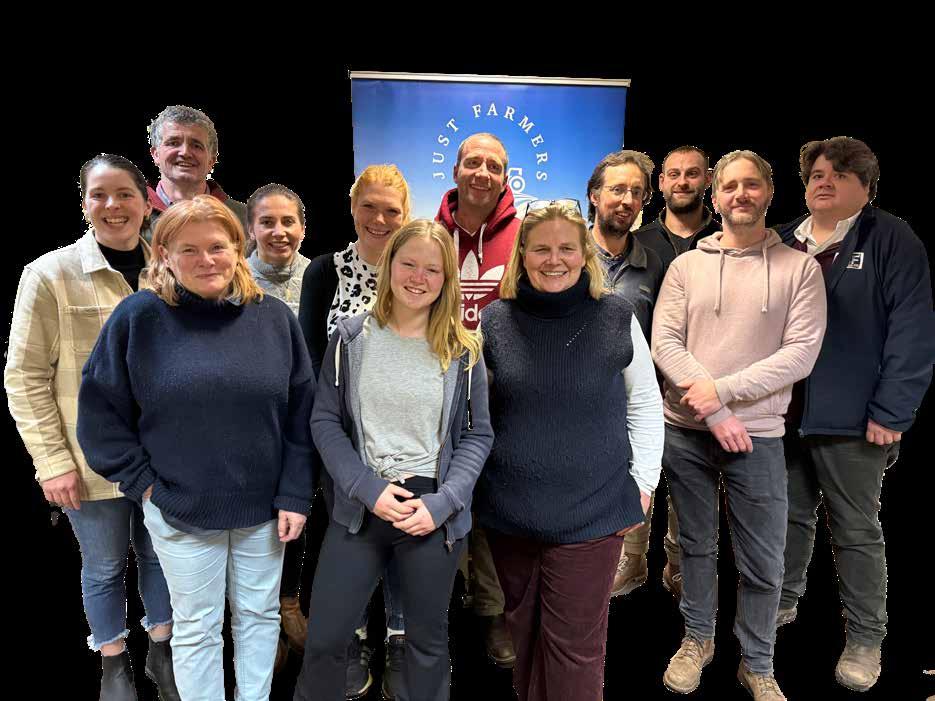
Our Natural World grants Just
We recruited our 10th group of farmers, taking our network to a total of 120 farmers and growers from around the UK, all willing to share their stories and engage openly with the media and general public about the issues we all care about, from restoring nature to food security. We delivered 20 workshops and given 120 individuals four days of fully-funded Media Education training EACH – and that’s the kind of experience money can’t buy. Why? Because Just Farmers feels like a family. The farmers commit to us in a way they just wouldn’t if they’d signed up to a public event and paid for a ticket. They know we have hand-picked each and every one of them and our funders, including Esmée, are investing in something bigger than a one-off workshop – we are building lasting relationships and real, positive change.
Our Natural World grants
FFCC Ltd
£60,000 over 1 year
Towards project costs for the inaugural Fields Good NI – a dedicated grassroots event from which to grow and support the emerging movement of regenerative farming and farmers in Northern Ireland.
Land In Our Names
£250,000 over 4 years
Towards core costs to reconnect Black people and people of colour to land in both urban and rural areas, address the inequalities in access to land and food, and reimagine land stewardship towards climate and racial justice.
North East Cotswold
Farmer Cluster CIC
£200,000 over 2 years
Towards core costs of a model that delivers skills and capacity for nature friendly farming at a landscape scale through nature based solutions, which can then be scaled.
Students Organising for Sustainability
£88,992 over 1 year
Towards project costs for Farming for Carbon & Nature evaluation and next steps: an innovative programme to support an agroecological farming transition within and beyond the tertiary education sector.
The Social Change Nest CIC (Farming The Future)
£90,000 over 1 year
Food Ethics Council
£10,000 over 1 year
Towards project costs of the next Food Issues Census.
Impatience Ltd
£60,000 over 1 year
Towards core costs for the Impatience Insiders, a group of food retail change makers.
Just Farmers
£90,000 over 3 years
Towards core costs for strengthening dialogue in the farming sector and upskilling farmers in media engagement in England, Wales, Scotland, and Northern Ireland.
Landworkers’ Alliance
£500,000 over 4 years
Towards core costs to influence change in our land-use system: prioritising responsible food production, biodiversity, and ensuring equitable access to healthy, sustainably produced food.
Nature Friendly Farming Network (NFFN)
£850,000 over 3 years
Towards core costs inspiring and supporting the UK’s transition to farming and land use which delivers healthy, sustainable food alongside nature and climate action, bringing nature-friendly farming into the mainstream.
Pasture for Life
£360,000 over 4 years
Towards core costs for supporting a sustainable method of livestock farming that regenerates soils, landscapes, economies, and food cultures in the UK.
Real Farming Trust
£249,047 over 3 years
Towards unrestricted core costs for increasing knowledge and learning of agroecology amongst farmers, improving accessibility through a more ambitious bursary programme and expanding communications capacity.
The Game and Wildlife Conservation Trust
£270,209 over 2 years
Towards project costs working with farmers/land managers to create an investable landscape and delivering ambitious environmental outcomes whilst giving farmers access to new sources of environmental and green finance.
Towards delegated grant-making for Farming The Future’s pooled fund which supports organisations on the ground working towards a just agricultural transition and supports partners to take collective action for change.
Wilderculture CIC
£85,000 over 2 years
Towards project costs of Wilderculture Capacity Building 2024.
Sizzle
£90,000 over 3 years
Towards project costs of launching Wonderfuel, a new disrupter peatfree compost, to accelerate the eradication of peat in horticultural products by offering an alternative growing medium to gardeners.
Sizzle
£88,000 over 1 year
Towards project costs for policy advocacy to remove barriers and increase the pace of transition to peat free alternatives.
Our Natural World grants
Space for nature
Campaign for National Parks
£90,000 over 1.5 years
Towards project costs of securing government and community support for National Marine Parks across the UK’s land, coast and sea; bringing together terrestrial and marine governance to deliver for communities and nature
Action for Conservation
£600,000 over 5 years
Towards unrestricted core costs to support work to inspire and empower young people from all backgrounds to protect and restore the natural world across the UK.
Aldersgate Group £250,000 over 3 years
Towards core costs to deepen work on nature recovery in the UK and building on calls for legally binding long-term targets for nature.
Black Ocean Citizens
£70,000 over 2 years
Towards core costs to develop access to the ocean and promote ocean literacy for lower socio-economic and Black, indigenous, and people of colour intersectional communities who are currently underrepresented in the marine sector.
CEE Bill Alliance Ltd (Zero Hour)
£90,000 over 2 years
Towards core costs of Zero Hour, the cross-party campaign calling for a people-powered, science-led plan (via the Climate and Nature Bill) to tackle the interconnected climate and nature crises together.
FFCC Ltd
£90,000 over 2 years
Towards project costs of the establishment of a small core team to lead the development of a national movement in service of nature’s recovery (branded as Nature Service Wales).
London Wildlife Trust
£309,000 over 3 years
Towards project costs of the Keeping It Wild Collective, supporting young people aged 18-30 to act for nature and climate in London, focusing on communities historically excluded and underrepresented in nature conservation.
Movements Trust Limited
£180,000 over 3 years
Towards core costs for movement building and funding intermediary services offer to the UK grassroots and civil society.
Ocean and Coastal Futures Ltd
£86,340 over 2 years
Towards project costs for equity, diversity, and inclusion in the marine and coastal sector – supporting Coastal Futures 2025 and beyond.
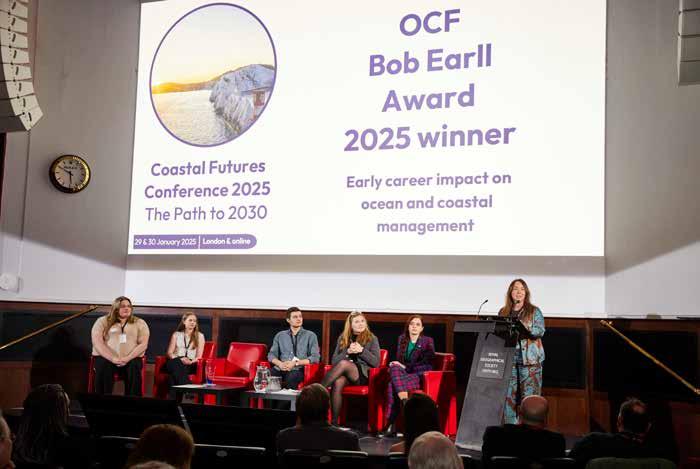
We celebrated more young people within the sector through the Coastal Futures Bursary, Early Career Mixer and Bob Earl Award for Early Career Impact.
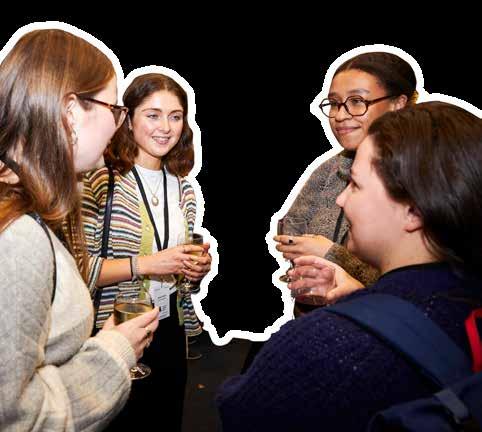
We’re also proud of the reach of our Ocean Justice webinar series (300+ signups), which is creating a space to explore and move forward some of the deep, systemic issues contributing to a lack of diversity within the sector.
Ocean and Coastal Futures
Our Natural World grants
Ocean and Coastal Futures
Ltd £9,600 over 6 months
Towards project costs to form a Youth Advisory Board to develop a Young Coastal Futures conference in 2025.
Radical Ecology
£10,000 over 1.5 years
Towards core costs in participating in the New Connections Network.
Royal Society of Wildlife Trusts
£750,000 over 5 years
Towards unrestricted core costs to support The Wildlife Trusts collective action on nature, climate and people.
Royal Society of Wildlife Trusts
£200,000 over 1.5 years
Towards project costs for the Financing Nature Accelerator programme.
RSPB (The Royal Society for the Protection of Birds)
£32,000 over 1 year
Towards project costs to support the development of thriving coasts and estuaries investment proposition.
RSPB Northern Ireland
£357,128 over 3 years
Towards project costs of a Northern Ireland Species Recovery Partnership to build Rethink capacity and unlock greater action at scale for species.
Scottish Wildlife Trust
£300,000 over 3 years
Towards core costs for delivery of an innovative marine literacy and advocacy model which supports the engagement of all marine users in policy conversations, benefitting coastal communities and the marine environment.
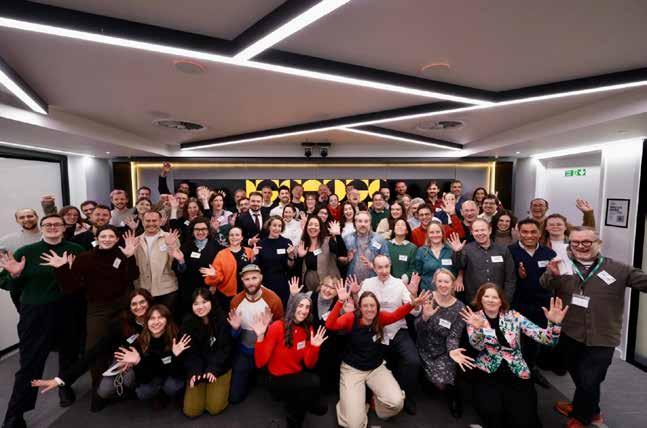
Following five years of preceding collaboration, thinking, planning and preparation, Sussex Bay launched on the public stage in June 2024 to a packed audience of 450 at Brighton Dome. Bringing together a diverse audience of environmentalists, high integrity funders, regulators, sustainable businesses, peaceful campaigners, charities and communities who do not usually get involved in marine work into safe spaces to collaborate together as we develop a vision for the future of over 100 miles of coastline for over 1 million residents across Sussex Bay.
Sussex
Bay Watch a short film about Sussex Bay
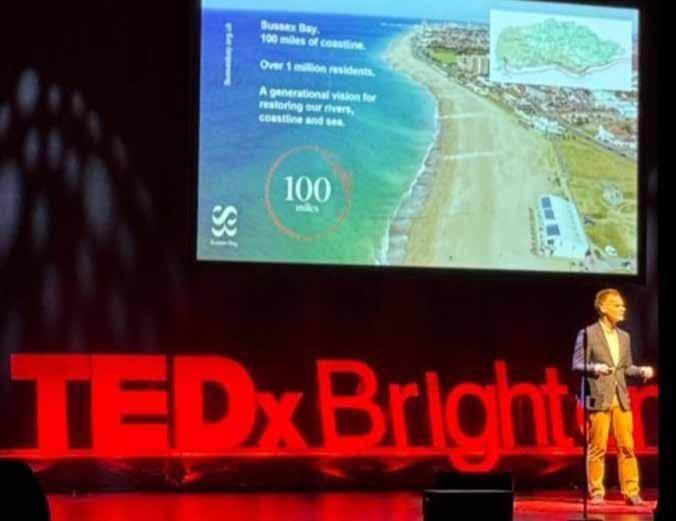
Sussex Bay
(Hosted by Adur and Worthing District Councils)
£450,000 over 3 years
Towards project costs to fund the continued foundation of Sussex Bay over three years.
Tayvallich Initiative Ltd
£76,959 over 2 years
Towards core costs of the Access and Inclusion Project to engage the communities within and around Tayvallich in improving access to community owned land and increase understanding of the land and its habitats.
The Bat Conservation Trust
£46,000 over 1 year
Towards project costs to support future sustainability and impact for NightWatch: Bat Conservation Trust’s UK-wide, tech-enabled nocturnal wildlife survey.
Our Natural World grants
The Institute for European Environmental Policy UK
£240,000 over 3 years
Towards core costs of driving stronger UK farming and land use policy and environmental governance through a changing relationship with Europe
The Langholm Initiative
£122,128 over 3 years
Towards core costs to support the Tarras Valley Nature Reserve Manager Post over three years to deliver the next phase of work for nature and the community.
Women’s Environmental Network (Wen)
£248,498 over 3 years
Towards unrestricted core costs of the Women’s Environmental Network’s work on gender and diversity in addressing the climate and nature emergencies.
Young Sea Changers Scotland
£248,538 over 4 years
Towards unrestricted core costs empowering youth voices to speak up for our seas.
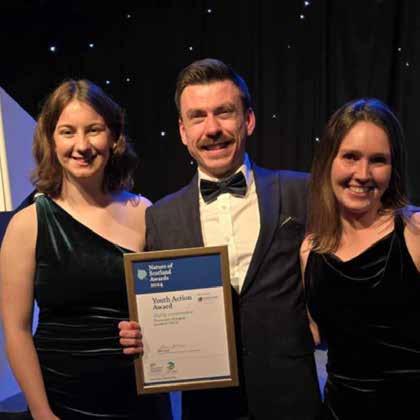
Our first Turning the Tide marine advocacy training programme for young people had fifteen participants who entered the programme with little to no confidence in engaging with policy-making. But with the right support and mentorship, they emerged as empowered advocates ready to influence change. They developed key skills in policy engagement and campaign strategy and, by the end, they had not only gained confidence but also began actively participating in consultations and engaging with policymakers.
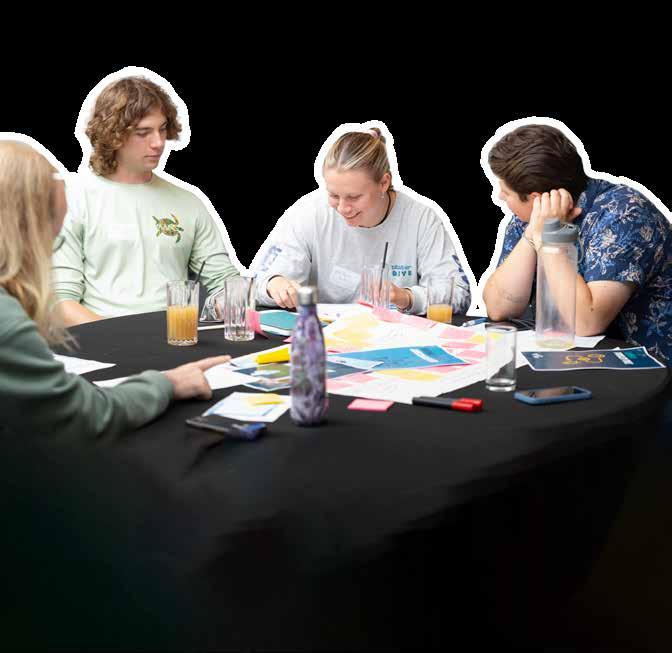
Young Sea Changers Scotland
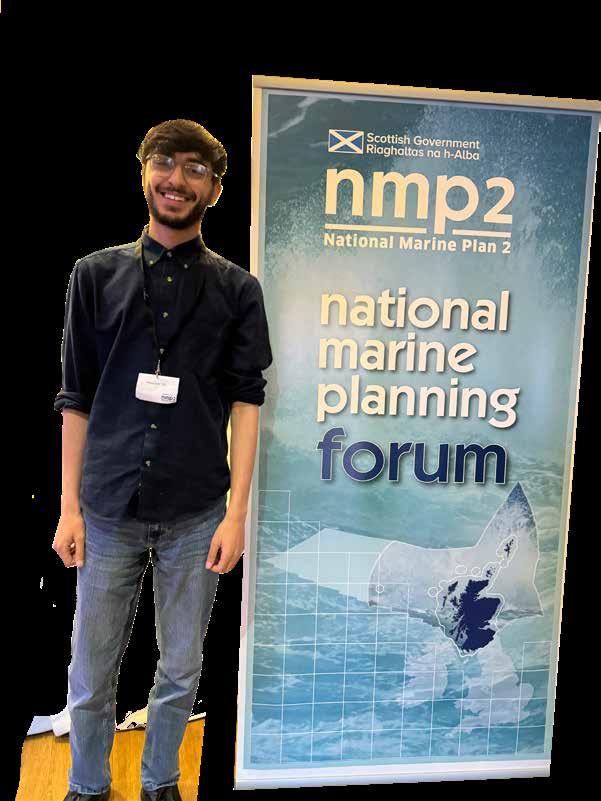
Our Natural World grants
Racial justice
All the Elements
Outdoors CIC
£300,000 over 3 years
Towards core costs of leading the way on access and representation for underrepresented and systemically excluded groups in the UK outdoors.
Black Girls Hike UK CIC
£10,000 over 1.5 years
Towards core costs in participating in the New Connections Network.
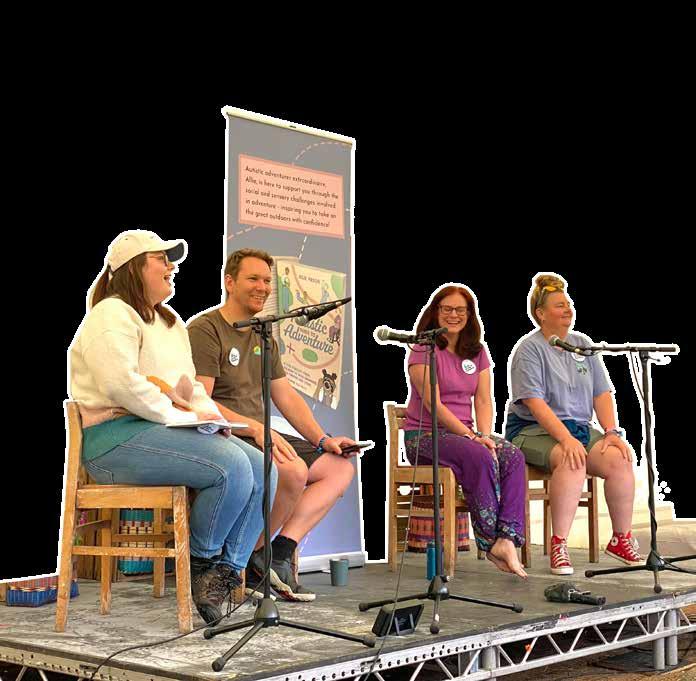
How the All The Elements community continues to pull together and support each other, even in a year that has been challenging for many. Alongside our 2024 core work, we introduced new events and opportunities, including a co-creating programming with our community at Timber festival. This was our biggest public facing event yet amplifying community voices and welcoming new members.
All The Elements Outdoors
Community driven enterprise and regeneration
Community Land Scotland
£450,000 over 40 months
Towards project costs of the Natural Capital Community Partnerships Team.
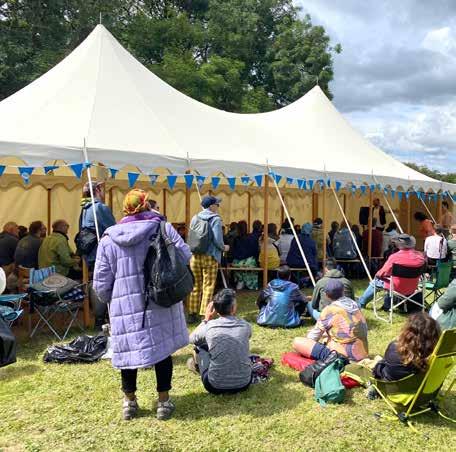
We’ve been able to significantly increase our advocacy work and policy development, which has helped secure Community Land Scotland as one of the most prominent land reform voices in Scotland and increased our capacity to influence legislative change at a time when several key pieces of legislation are working their way through the Scottish Parliament.
Community Land Scotland
Our Natural World social investments
Fishing in tandem with nature
Freshwater
Nature friendly farming
Space for nature
Câr-y-Môr
£370,000 over 5 years
An investment towards working capital to support Câr-y-Môr to build a new seaweed refinery, enabling them to become a financially sustainable, community-owned regenerative ocean farm.
The Rivers Trust
£2,000,000 over 5 years
An investment towards a loan facility with the Rivers Trust that would enable its member trusts to access short-term bridging loans to address cash flow problems associated with funding capital work paid in arrears.
Ooooby
£60,000 over 10 years
A follow-on investment to help Ooooby trade through a cashflow crunch.
Pasture for Life
£90,000 over 1 year
A short-term bridging loan to support costs associated with contracts paid in arrears.
The Kindling Farm Limited
£300,000 over 10 years
An investment towards the costs of refinancing the farm plus working capital.
Avon Wildlife Trust
£1,605,000 over 2 years
An investment towards the purchase of 40 ha/100 acres of land known as Ebdon Farm.
Durham Wildlife Trust
£500,000 over 2 years
An investment towards a land purchase for conservation.
Ulster Wildlife Trust
£200,000 over 4 years
An investment towards working capital to support Ulster Wildlife Trust to bid for and participate in a major partnership programme of marine recovery work funded by Peace Plus.
Worcestershire Wildlife Trust
£297,270 over 2 years
An investment towards a land purchase of land at Longdon Marsh.
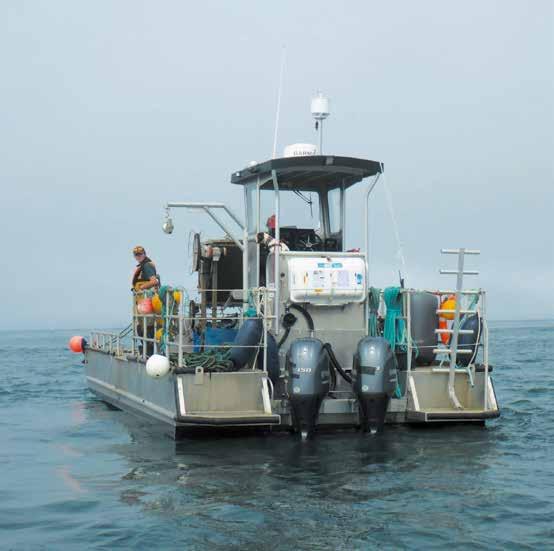
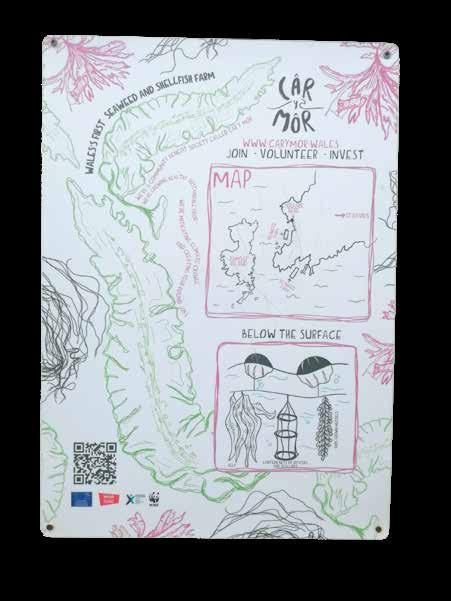
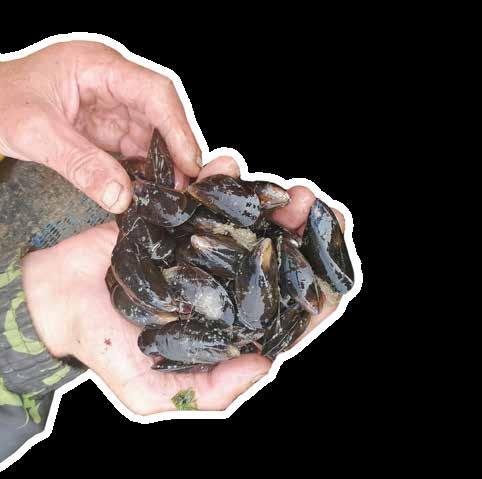
Watch a video about Câr-y-Môr and the role that seaweed farming can play in improving the ocean habitat and support communities.
A Sector Fit for the Future
In addition to our three main aims, we support work that contributes to our impact goals across our aims by enabling a stronger, inclusive and innovative sector. This includes key infrastructure organisations and new ideas that unblock barriers, test new approaches or build movements for change.
Applications towards A Sector Fit for the Future are by invitation only.
A Sector Fit for the Future
Our priorities in 2024 include:
• Data and digital
• Enabling campaigning or movement building
• Funder collaboration and accountability
• Social and impact investing
A Sector Fit for the Future grants
Data and digital Enabling campaigning or movement building
Funder collaboration and accountability
Centre for Cultural Value, University of Leeds
£80,000 over 1 year
Towards project costs to research and develop establishing a Data Observatory for the cultural sector.
Centre for the Acceleration of Social Technology
£210,000 over 2 years
Towards project costs of sustaining and furthering the vital digital infrastructure that has been started and nurtured through Catalyst, to meet the needs of thousands of UK charities.
Scottish Council for Voluntary Organisations
£47,094 over 2 years
Towards project costs supporting strategic digital capability in the Scottish voluntary sector.
Act Build Change
£156,000 over 3 years
Towards unrestricted core costs to grow strong and sustainable campaigns and movements by making transformative organising methods and collective care accessible to everyone.
Public Interest Research Centre
£8,500 over 1 year
Towards unrestricted core costs for Future Stories, a pioneering lived experience-led narrative change project: focused on cross-issue, root-cause, movement-building approaches to narrative work.
Thirty Percy
£10,000 over 6 months
Towards delegated grant-making for the Hidden Wiring Collective to explore and support infrastructure for campaigning and movement building.
Directory of Social Change
£25,000 over 1 year
Towards unrestricted core costs to enable them to continue a wide range of sector support services in the charity sector.
Equally Ours
£30,000 over 2 years
Towards unrestricted core costs to consolidate the significant body of work done to date in supporting the philanthropic sector to develop its systems and practice to build more equitable grant making.
Institute for Voluntary Action Research
£234,000 over 3 years
Towards unrestricted core costs to support work facilitating collaboration and learning with charities, foundations and public agencies to deliver useful insights and practical action that make a difference to communities.
Ten Years’ Time (Future Foundations UK)
£30,000 over 1 year
Towards core costs supporting Future Foundations UK, a network for Global Majority people working in philanthropy.
The Decelerator Ltd
£20,000 over 6 months
Towards project costs for The Decelerator, an initiative to build the infrastructure needed to support better endings in civil society.
Social investment new models and market support
Investing
for Good
£60,000 over 3 years
Towards project costs by way of a repayable grant facility to subsidise the start-up costs of at least three additional social investment partners, to be hosted by The Social Investment Market CIC, their subsidiary.
Sumerian Foundation
£188,000 over 3 years
Towards project costs of knowledge transfer from Sumerian to BUD Leaders, a social enterprise consultancy that provides blended training, workshops and coaching for organisations in the UK.
A Sector Fit for the Future social investments
Social investment new models and market support
Resonance
£500,000 over 11 years
An equity investment in Resonance, to help leverage significant mainstream capital into the UK social enterprise sector.
New Connections
Our New Connections programme aims to find and support organisations that could not, or would not, usually apply to Esmée due to our eligibility criteria. Over 2023 and 2024, we made grants to 20 organisations who are led by, and for, communities experiencing racial inequity or migrants.
We have provided grant funding of up to £60,000 over two years. In addition to grant funding, we are providing an additional £10,000 to support the funded organisations’ participation in a peer network, facilitated by Do It Now Now. The peer network will be co-designed with the funded organisations and will enable peer support and learning, as well as help to shape Esmée’s practice. The organisations will also have additional capacity building support through Funding Plus.
Learn more about New Connections.

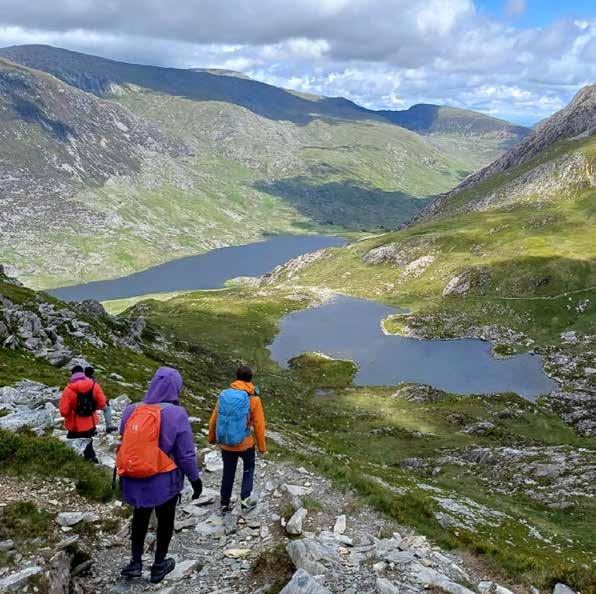

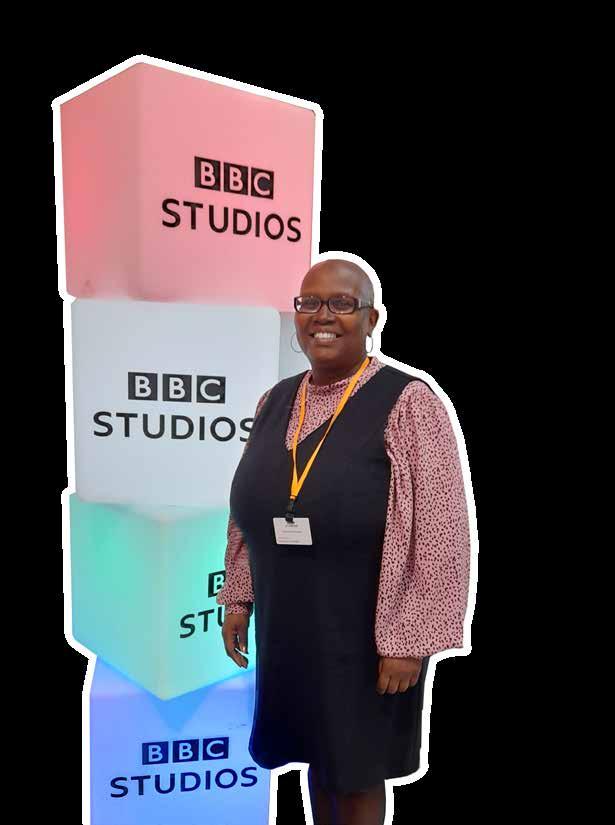
New Connections
The following grants were made through New Connections in 2024.
Please note that these grants are also listed under the relevant aim on pages19 to 61.
A Fairer Future
Arts and creativity making change
Black Curatorial
£10,000
Tribe Arts
£70,000
Children and young people’s rights
Families in Harmony
£70,000
Kids of Colour
£70,000
Listen Up
£70,000
Gender justice
The Three Hijabis
£70,000
FiveXMore
£10,000
Migrant justice
Migrants in Culture CIC
£70,000
Racial justice
Milk Honey Bees
£70,000
The Black Curriculum CIC
£70,000
The Black Wellbeing
Collective
£70,000
Creative, Confident Communities
Our Natural World
Community-led art and creativity
Anansi Theatre Company
£10,000
Community Arts by ZK CIC
£70,000
Communities working together for change
Cysters
£70,000
Passion4Fusion
£70,000
Urban Community Project
£70,000
Racial justice
Black Girls Hike UK CIC
£10,000
Space for nature
Black Ocean Citizens
£70,000
Radical Ecology
£10,000
Funding in Partnership
We increasingly work in partnership with many different organisations across sectors; charities, investors, regulators, social enterprises and academia, trying to pull together unusual alliances that are willing to work together to effect real and long-lasting positive change. This includes exploring new approaches to funding to increase our reach and share learning, examples of which are shared throughout this report.
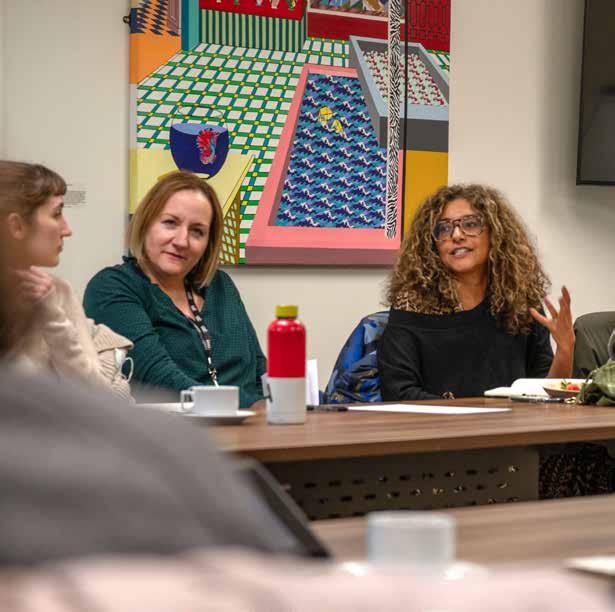
Being involved in these conversations has helped open my eyes to the possibility of narrative change work being a key part of levering positive social change, it’s also helped me understand the porous boundaries of the work and how we can support an ecology of practice. I think the strategy work the team has done has been particularly inspiring, offering a really clear way of understanding how the field can lever change - which feels like an important contribution to the field. It’s giving us more confidence to embed this way of working and thinking.
Co-funder of the Power of Pop Fund
Funding in Partnership: Delegated funds
In 2024, we worked with partners on a range of delegated funds focusing on areas including museums working with communities, popular culture and social justice, a just agricultural transition, and building the resilience of organisations led by and from the Global Majority.
Please note that these grants are also listed under the relevant aim on pages19 to 61.
A Fairer Future
Racial justice
Comic Relief (Power of Pop Fund)
£250,000 over 2 years
We contributed £250,000 towards the Power of Pop Fund, a pooled fund supporting organisations working at the intersection of popular culture and social change in the UK. In 2024, the Fund awarded 3 new grants and renewed 6 existing grants, totalling £1,425,000.
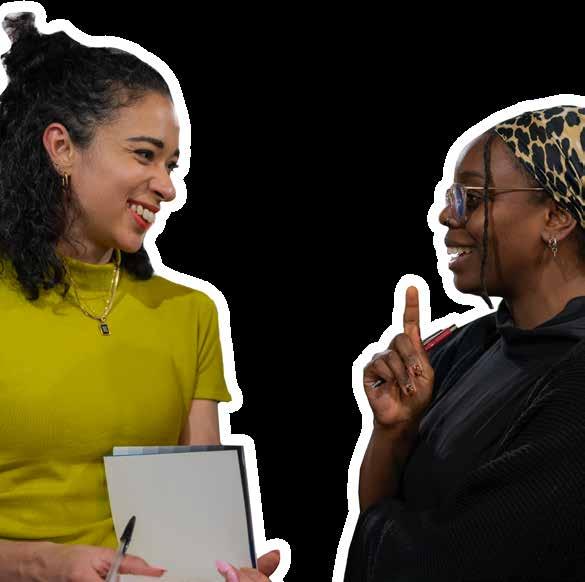
[A key highlight of the strategy development process was] being able to write something concrete to define real funding for real organisations in a space that’s groundbreaking.
Power of Pop Fund Lived Experience Advisory Board (Community Council) Member
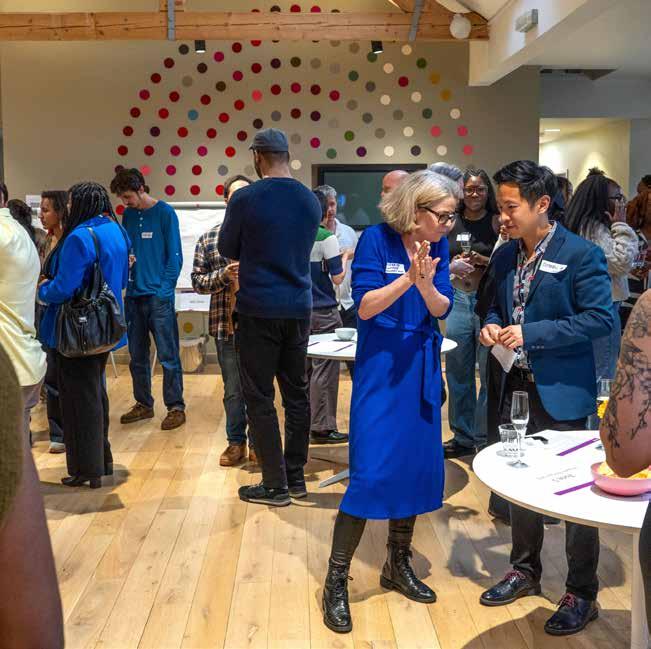
Funding in Partnership: Delegated funds
Creative, Confident Communities
Communities working together for change
Civic Power Fund
£30,000 over 1 month
We contributed £30,000 towards a pooled emergency fund for small community organisations leading work to support their communities following the Islamaphobic and racist riots during 2024. The Fund made 107 grants, totalling £107,000. 70 of these grants were made in less than 14 days of the riots breaking out.
Comic Relief
(Global Majority Fund)
£770,000 over 31 months
We contributed £770,000 towards Phase III of the Global Majority Fund, a pooled fund to support and build resilience of organisations led by and from the Global Majority. In 2024, the Fund awarded 3 new grants and renewed 6 existing grants, totalling £1,425,000.
Leeds Community Foundation
£90,000 over 9 months
The Involving Young People Fund will launch in Wakefield and Barnsley in 2025.
Community-led art and creativity
Museums Association
We also give grants to the Museum sector through the Esmée Fairbairn Collections Fund as part of our long-running partnership with the Museums Association. During the year, we contributed a total of £2,742,971 to the Fund, which relaunched as the Esmée Fairbairn Communities and Collections Fund in December 2024.
In 2024, the Esmée Fairbairn Collections Fund awarded 14 grants, totalling £1.3m.
Cambridge University Museum of Archaeology and Anthropology
£92,000
Centre for Computing History
£93,200
Derby Museums Trust
£94,634
Herefordshire Museum Service
£99,000
Leeds Museums and Galleries
£99,690
Manchester Art Gallery
£54,527
Milton’s Cottage Trust
£82,183
Museum of Cambridge
£99,802
National Museums Liverpool
£94,156
North Hertfordshire Museum
£75,000
Orkney Islands Council
£99,928
Royal Armouries Museum
£100,000
South Wales Miners’ Museum
£100,000
Thackray Museum of Medicine
£100,000
Our Natural World
Nature friendly farming
The Social Change Nest CIC (Farming The Future)
£90,000 over 1 year
We contributed £90,000 towards Farming The Future, a pooled fund supporting organisations on the ground working towards a just agricultural transition. In 2024, the Fund made 19 grants, totalling £376k.
A Sector Fit for the Future
Enabling campaigning or movement building
Thirty Percy
£10,000 over 6 months We contributed £10,000 towards the Hidden Wiring Collective to explore and support infrastructure for campaigning and movement building.
TASK Fund
Each Trustee at Esmée Fairbairn Foundation has an annual TASK budget of £90,000 to be used for donations within the charitable purposes of the Foundation at the individual Trustee’s discretion.
TASK donations may sit outside our current funding priorities. As donations, they are not managed in the same way as Esmée’s main grant funding.
To mark the retirement of two Trustees at the end of the previous year: Tom Chandos and Sir Jonathan Phillips, who collectively had served as trustees of the Foundation for 32 years, two exceptional grants £90,000 were also awarded. These were made to Britten Pears Arts and Ex Cathedra.
TASK Fund
Anne Frank Trust UK
£5,000
Ashmolean Museum of Art and Archaeology
£10,000
Ballet Cymru
£5,000
Beat
£10,000
Beyond Equality CIO
£10,000
Black Mountains College Project
£20,000
Bloomsbury Football Foundation
£10,000
Botanical Society Of Britain And Ireland
£15,000
Breaking Barriers
£15,000
British School at Athens
£10,000
Britten Pears Arts
£90,000
Camden United CIC
£15,000
Celebrate Voice
£15,000
Centre for British Progress
£10,000
Citizen Zoo CIC
£1,000
Corrymeela Community
£15,000
Crisis Action Limited
£5,000
Crystal Palace Park Trust
£5,000
Curlew Action
£10,000
DEC
£20,000
Durrell Wildlife
Conservation Trust – UK
£15,000
East London Music Group
£15,000
English PEN
£5,000
English Sangha Trust Ltd
£5,000
Everyone’s Invited
£10,000
Ex Cathedra
£90,000
Father 2 Father CIC
£15,000
Fatherhood Institute
£10,000
First Love Foundation Ltd
£15,000
Friends of Gosforth Central Park
£2,500
Full Fact
£10,000
Gerry’s Pompeii Charity
£15,000
Grassmarket Community Project
£10,000
GROW Foundation
£3,000
Hampshire Swifts
£5,000
Handicap International UK
£15,000
Horniman Public Museum and Public Park Trust
£15,000
Karma Nirvana
£10,000
Kidney Care UK
£10,000
Kids of Colour
£10,000
Kinship
£10,000
Lifting Limits
£10,000
London Handel Society Limited
£10,000
Maggie’s Cancer Caring Centres
£10,000
Mamasuze C.I.C.
£20,000
Medical Aid for Palestinians
£20,000
Medical Aid for Palestinians
£20,000
MSI Reproductive Choices
£10,000
Murmur
£10,000
National Dance Company Wales
£10,000
Nidderdale AONB
£20,000
North East Autism Society
£2,500
North Wales Rivers Trust Ltd
£5,000
Olympias Music Foundation
£15,000
Orchestra of the Age of Enlightenment
£15,000
Over the Wall
£5,000
Pallant House Gallery
£15,000
Paul Canoville Foundation
£10,000
Peter Tatchell Foundation
£4,500
Pro Bono Economics
£15,000
Refuge
£5,000
Royal Opera House Covent Garden Foundation
£10,000
RSPB (The Royal Society for the Protection of Birds)
£9,000
Scottish Chamber Orchestra Limited
£10,000
Somerset House Trust
£15,000
St James’s Church Piccadilly
£10,000
Strange Town Theatre
£12,000
The Amber Foundation
£5,000
The Avenues Youth Project
£15,000
TASK Fund
The Comfrey Project CIO
£5,000
The Community of Interbeing UK
£5,000
The Customs House Trust
£8,000
The Egmont Trust
£15,000
The Fawcett Society
£10,000
The Fawcett Society
£10,000
The Forward Trust
£5,000
The Grange Festival
£10,000
The Linda Norgrove Foundation
£10,000
The London Library
£5,000
The Motherhood Plan
£10,000
The National Trust
£15,000
The Nicholas Boas Charitable Trust
£5,000
The Open Door
£20,000
The Paul Cottingham Trust
£20,000
The Percy Hedley Foundation
£20,000
The Samling Institute for Young Artists
£7,500
The Social Bite Fund
£15,000
The Traquair House Charitable Trust
£15,000
The Wildlife Trust of South and West Wales Limited
£5,000
Tribe Arts
£15,000
Tron Theatre
£8,000
Ty Hafan Children’s Hospice
£5,000
Unicef UK
£15,000
University of Bradford
£15,000
West End Refugee Service
£5,000
Wood Street Mission
£5,000
World Literacy Foundation
£12,000
Yorkshire Dales Millennium Trust
£20,000
Young Actors’ Theatre Islington
£10,000
Young Classical Artists Trust
£5,000
Zing
£20,000
Governance and Administration
Objectives and Activities
Esmée Fairbairn Foundation exists and operates for the public benefit. Through setting its strategy and through its funding the Foundation has focused on creating social and environmental impact to improve our natural world, secure a fairer future and strengthen the bonds between communities in the UK. In determining its strategy and in the administration of the Foundation generally, the Trustees have paid due regard to the guidance published by the Charity Commission under section 4 of the Charities Act 2011.
In October 2020, the Foundation launched its Strategic Plan 2020 to 2025. In 2023, the Board decided to extend the strategy until 2027. The strategy can be found on the Foundation’s website.
Values
Pages 7 to 14 give an overview of funding, a list of all grants and social investments made in 2024 is on pages 19 to 61.
The public benefit created by the Foundation’s grant-making and social investment is demonstrated in this report through listing of grants and social investments that we have made.
In line with good practice, the Foundation has commissioned an independent review of its governance to take place in 2025.
Our values act as a guide for Trustees and staff about how we work at Esmée. They are intended to provide a frame of reference for taking actions and making decisions at every level.
Structure, Governance and Management
The operation of Esmée Fairbairn Foundation is governed by a Charity Commission Scheme, dated 14 January 2002, which enables the assets to be applied by the Trustees at their discretion for general charitable purposes. The Charity Commission approved an incorporation of the Trustee body on 16 June 2008 in the name of The Trustees of Esmée Fairbairn Foundation.
The Foundation is a charity registered in England and Wales, number 200051.
Trustee Board
The Foundation’s Trustees are listed on page 74 of this report. The Trustee Board meets six times each year to set and oversee the delivery of the Foundation’s strategy. A number of Trustee committees support the work of the Foundation throughout the year.
Trustees are recruited through a professionally supported open recruitment with vacancies widely advertised. When recruiting new Trustees, the Board consider the current make-up of the Board and where skills gaps exist alongside the current diversity of the Board. Trustees serve an initial term of five years and may then serve up to an additional two further terms of office. In exceptional circumstances, the Board may agree to extend a Trustee’s period of office for a stated time period beyond fifteen years. An induction programme is put in place for new trustees alongside ongoing professional support for all board members.
The Foundation has a clear organisational structure with documented lines of authority and delegation, which is reviewed regularly by the Audit and Risk Committee and the Trustee Board. The Foundation also has segregation of duties with regard to governance, management, grant-making, social investments, finance and investment. Procedures are in place for documenting decisions, actions and issues.
Audit and Risk Committee
The Audit and Risk Committee reviews and recommends to the Trustee Board systems of internal control on financial and governance issues and oversees risk management. It also reviews the draft Annual Report and Accounts and meets with the Foundation’s external auditors.
Finance and Administration Committee
The Finance and Administration Committee reviews and recommends to the Trustee Board annual budgets, staff remuneration and benefits. It also oversees major property, IT, governance and other projects.
The salaries of the senior management team are set by the Finance and Administration Committee and includes reference to peers and other comparators.
Investment Committee
The Investment Committee formulates investment policy, oversees its implementation, manages overall asset allocation, monitors investment performance and reports to the Trustee Board.
Nominations Committee
The Nominations Committee makes recommendations to the Trustee Board on the appointment of new Trustees.
Funding decisions
An Executive Committee takes decisions on grants up to £90,000. An Approvals Committee, comprising Trustee and Executive members, takes decisions on grants and awards up to £250,000 and social investments up to £500,000. All decisions on grants and awards over £250,000 and social investments over £500,000 go to the Trustee Board.
Financial Policies
The Foundation’s finance and investment policies are intended to provide long-term stability and liquidity sufficient for the financing of the Foundation’s grants and social investments while maintaining the real value of the investment portfolio. The Foundation has an Investment Policy Statement that sets out the long-term investment objective, risk-profile, strategic asset allocation and investment restrictions. This is reviewed annually. The Foundation’s strategic asset allocation reflects a total-return objective without specific focus on income-generating investments. This approach means that we consider all sources of return, including interest, dividends, capital distributions from funds, and realised and unrealised gains and losses. Income alone would not usually meet all of our future spending needs.
Funding targets are arrived at with consideration given to the average value of the investment portfolio, but may be adjusted to take account of need and operational capacity. Funding targets may be over or under-spent in an individual year. The Foundation’s support and governance spend is set by reference to total spend levels to ensure it remains reasonable and proportionate.
Risk management
The Trustee Board is responsible for the oversight of the risks faced by the Foundation. The Trustee Board and Audit and Risk Committee regularly review the Foundation’s risk position, internal controls assessment and compliance with relevant statutory and finance regulations. The Foundation has a riskmanagement process designed to identify the major risks that could impact on the aims in the Foundation’s Strategic Plan. This process identifies the major risks the Foundation faces, the likelihood of occurrence, the significance of the risk, and any mitigating controls that are in place. It also seeks to identify any actions and resources required to manage these risks further.
The Foundation’s investment activities are its main financial risk. This risk is managed, with the support of investment advisers, through: regular review of our investment policy; management of strategic asset allocation; risk measurement and reporting; independent valuation and performance reporting; diversification across a broad range of asset classes, geographies, investment managers and investment strategies; and ongoing market and manager updates and due diligence.
The levels of manager concentration, currency exposure, leverage and liquidity are also key factors in managing the risks of the investment portfolio. Policies and restrictions to help manage these risks are included in the Investment Policy Statement.
Reserves
All funds held by the Foundation are unrestricted and available to the Foundation to apply for the general purposes of the Foundation as set out in its governing document. The Foundation aims to achieve a total return of RPI +4% in order to meet its spending requirements. At the year-end the value of reserves held was £1.276bn.
The Trustees are satisfied that the Foundation has sufficient reserves to continue as a going concern please refer to note 1 for further details.
Trustees, Senior Management Team, Committees and Advisers
Trustees
Beatrice Hollond Chair
Professor Claire Alexander
Edward Bonham Carter
Joe Docherty
John Fairbairn
Professor David Hill CBE
Elspeth Jones
Dame Clare Moriarty
Gautham Radhakrishnan (from 01.01.24)
Mary Ann Sieghart
Eleanor Updale
Dr Wanda Wyporska
Senior Management Team
Dame Caroline Mason CBE
Chief Executive
James Wragg
Chief Operating Officer
Gina Crane
Director of Communications and Learning
Veda Harrison
Director – Creative, Confident Communities
Catherine Hillis
Director – A Fairer Future
Liam McAleese
Director – Our Natural World
Matthew Cox
Director of Investment (to 28.02.25)
Jonny Page
Director of Social and Impact Investment (from 01.03.25)
A full list of staff can be found on the website.
Committees
Audit and Risk Committee
Professor David Hill CBE Chair
Professor Claire Alexander
John Fairbairn
Elspeth Jones
Dame Clare Moriarty (from 01.01.25)
Finance and Administration Committee
Beatrice Hollond Chair
Edward Bonham Carter
Professor David Hill
Gautham Radhakrishnan (from 01.01.25)
Investment Committee
Edward Bonham Carter Chair
Beatrice Hollond
Joe Docherty
Dame Caroline Mason CBE
Jason Mitchell (Co-opted member)
Gautham Radhakrishnan
Nominations Committee
Beatrice Hollond Chair
Professor Claire Alexander
Edward Bonham Carter
John Fairbairn
Professor David Hill (from 01.01.25)
Elspeth Jones (from 01.01.25)
Advisers
Independent Auditors
PricewaterhouseCoopers LLP
1 Embankment Place
London
WC2N 6RH
Solicitors
Berwin Leighton Paisner
Adelaide House
London Bridge
London EC4R 9HA
Veale Wasbrough Vizards LLP
24 King William Street
London EC4R 9AT
Bankers
Royal Bank of Scotland plc
London Victoria (A) Branch
119/121 Victoria Street
London SW1E 6RA
SW1E
Esmée Fairbairn Foundation
210 Pentonville Road
London N1 9JY

020 7812 3700

info@Esmeefairbairn.org.uk
Esmee Fairbairn Foundation
@esmeefairbairn.bsky.social @EsmeeFairbairn
@esmeefairbairn
www.esmeefairbairn.org.uk
Registered charity 200051
Statement of Trustees’ Responsibilities
Statement of Trustees’ Responsibilities
In respect of the Trustees’ Report and the financial statements
Under charity law, the trustees are responsible for preparing a Trustees’ Report and financial statements in accordance with applicable law and regulations.
The trustees are required to prepare the charity financial statements in accordance with UK Accounting Standards, including FRS 102 The Financial Reporting Standard applicable in the UK and Republic of Ireland.
The charity’s financial statements are required by law to give a true and fair view of the state of affairs of the charity and its incoming resources and application of resources for that period.
In preparing these financial statements, generally accepted accounting practice entails that the trustees:
• Select suitable accounting policies and then apply them consistently.
• Make judgements and estimates that are reasonable and prudent
• State whether applicable UK Accounting Standards and the Statement of Recommended Practice have been followed, subject to any material departures disclosed and explained in the charity financial statements.
• State whether the charity financial statements comply with the Scheme rules, subject to any material departures disclosed and explained in the financial statements.
• Assess the charity’s ability to continue as a going concern, disclosing, as applicable, matters related to going concern
• Use the going concern basis of accounting unless they either intend to liquidate the charity or to cease operations or have no realistic alternative but to do so.
The trustees are required to act in accordance with the Scheme rules of the charity, within the framework of trust law. They are responsible for keeping accounting records which are sufficient to show and explain the charity’s transactions and disclose at any time, with reasonable accuracy, the financial position of the charity at that time, and to enable the trustees to ensure that, where any statements of accounts are prepared by them under section 132(1) of the Charities Act 2011, those statements of accounts comply with the requirements of regulations under that provision. They are responsible
for such internal control as they determine is necessary to enable the preparation of financial statements that are free from material misstatement, whether due to fraud or error, and have general responsibility for taking such steps as are reasonably open to them to safeguard the assets of the charity and to prevent and detect fraud and other irregularities.
The trustees are responsible for the maintenance and integrity of the financial and other information included on the charity’s website. Legislation in the UK governing the preparation and dissemination of financial statements may differ from legislation in other jurisdictions.
Signed in the name and on behalf of

Beatrice Hollond Chair
1 July 2025
Our History

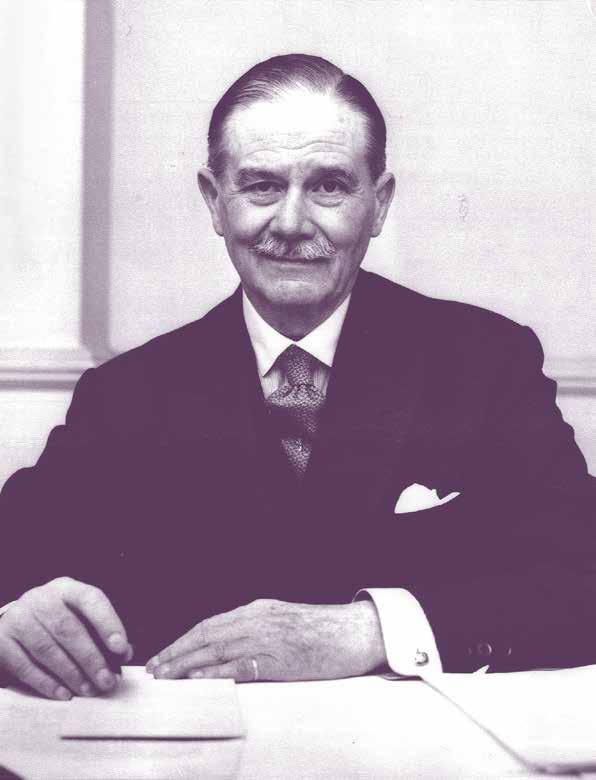
In 1961 Ian Fairbairn, a leading City figure, decided to endow a charitable foundation with the bulk of his holdings in M&G, the company he had joined some 30 years before.
M&G was a pioneer of the unit trust industry in the UK. It grew out of Ian Fairbairn’s determination that investments in equities, previously the preserve of the affluent, should be available to all – giving everyone the potential to own a stake in the nation’s economy.
His purpose in establishing the Foundation was two-fold. In the interests of wider prosperity, he aimed to promote a greater understanding of economic and financial issues through education. He also wanted to establish a memorial to his wife, Esmée, who had played a prominent role in developing the Women’s Royal Voluntary Service and the Citizens Advice Bureau. She was killed in an air-raid during the Second World War. Prior to Ian’s death in 1968 he indicated that the Foundation should support a broad range of charitable purposes.
Esmée Fairbairn’s sons, Paul and Oliver Stobart, also contributed generously to the Foundation established in their mother’s memory.
In 1999 the Foundation sold its holding in M&G as part of the company’s takeover by the Prudential Corporation plc. As a result, the Foundation’s endowment grew significantly in value as did the size and scope of the grants it was able to make.
Today, Esmée Fairbairn Foundation is one of the largest independent funders in the UK.
Auditors’ Report and Financial Statements
Independent auditors’ report to the trustees of Esmée Fairbairn Foundation
Report on the audit of the financial statements
Opinion
In our opinion, Esmée Fairbairn Foundation’s financial statements (the “financial statements”):
•Give a true and fair view of the state of the charity’s affairs as at 31 December 2024 and of its incoming resources and application of resources, and cash flows, for the year then ended;
• Have been properly prepared in accordance with United Kingdom Generally Accepted Accounting Practice (United Kingdom Accounting Standards, comprising FRS 102 “The Financial Reporting Standard applicable in the UK and Republic of Ireland”, and applicable law); and
• Have been prepared in accordance with the requirements of the Charities Act 2011 and Regulation 8 of The Charities (Accounts and Reports) Regulations 2008).
We have audited the financial statements, included within the Annual Report and Accounts (the “Annual Report”), which comprise: the balance sheet as at 31 December 2024; the statement of financial activities and cash flow statement for the year then ended; and the notes to the financial statements, which include a description of the significant accounting policies.
Basis for opinion
We conducted our audit in accordance with International Standards on Auditing (UK) (“ISAs (UK)”) and applicable law. Our responsibilities under ISAs (UK) are further described in the Auditors’ responsibilities for the audit of the financial statements section of our report. We believe that the audit evidence we have obtained is sufficient and appropriate to provide a basis for our opinion.
Independence
We remained independent of the charity in accordance with the ethical requirements that are relevant to our audit of the financial statements in the UK, which includes the FRC’s Ethical Standard and we have fulfilled our other ethical responsibilities in accordance with these requirements.
Conclusions relating to going concern
Based on the work we have performed, we have not identified any material uncertainties relating to events or conditions that, individually or collectively, may cast significant doubt on the charity’s ability to continue as a going concern for a period of at least twelve months from the date on which the financial statements are authorised for issue.
In auditing the financial statements, we have concluded that the trustees’ use of the going concern basis of accounting in the preparation of the financial statements is appropriate.
However, because not all future events or conditions can be predicted, this conclusion is not a guarantee as to the charity’s ability to continue as a going concern.
Our responsibilities and the responsibilities of the trustees with respect to going concern are described in the relevant sections of this report.
Reporting on other information
The other information comprises all of the information in the Annual Report other than the financial statements and our auditors’ report thereon. The trustees are responsible for the other information. Our opinion on the financial statements does not cover the other information and, accordingly, we do not express an audit opinion or any form of assurance thereon.
In connection with our audit of the financial statements, our responsibility is to read the other information and, in doing so, consider whether the other information is materially inconsistent with the financial statements or our knowledge obtained in the audit, or otherwise appears to be materially misstated.
If we identify an apparent material inconsistency or material misstatement, we are required to perform procedures to conclude whether there is a material misstatement of the financial statements or a material misstatement of the other information.
If, based on the work we have performed, we conclude that there
is a material misstatement of this other information, we are required to report that fact We have nothing to report based on these responsibilities.
Based on our work undertaken in the course of the audit, the Charities Act 2011 requires us also to report certain opinions and matters as described below.
Trustees’ Report Under the Charities Act 2011 we are required to report to you if, in our opinion the information given in the Trustees’ Report is inconsistent in any material respect with the financial statements. We have no exceptions to report arising from this responsibility.
Responsibilities for the financial statements and the audit
Responsibilities of the Trustees for the financial statements
As explained more fully in the Statement of Trustees’ Responsibilities, the trustees are responsible for the preparation of the financial statements in accordance with the applicable framework and for being satisfied that they give a true and fair view. The trustees are also responsible for such internal control as they determine is necessary to enable the preparation of financial statements that are free from material misstatement, whether due to fraud or error.
In preparing the financial statements, the trustees are responsible for assessing the charity’s ability to continue as a going concern, disclosing as applicable, matters related to going concern and using the going concern basis of accounting unless the trustees either intend to liquidate the charity or to cease operations, or have no realistic alternative but to do so.
Auditors’ responsibilities for the audit of the financial statements
We are eligible to act and have been appointed as auditors under section 144 of the Charities Act 2011 and report in accordance with the Act and relevant regulations made or having effect thereunder.
Our objectives are to obtain reasonable assurance about whether the financial statements as a whole are free from material misstatement, whether due to fraud or error, and to issue an auditors’ report that includes our opinion. Reasonable assurance is a high level of assurance, but is not a guarantee that an audit conducted in accordance with ISAs (UK) will always detect a material misstatement when it exists. Misstatements can arise from fraud or error and are considered material if, individually or in the aggregate, they could reasonably be expected to influence the economic decisions of users taken on the basis of these financial statements.
Irregularities, including fraud, are instances of non-compliance with laws and regulations. We design procedures in line with our responsibilities, outlined above, to detect material misstatements in respect of irregularities, including fraud. The extent to which our procedures are capable of detecting irregularities, including fraud, is detailed below.
Based on our understanding of the charity, we identified that the principal risks of non-compliance with laws and regulations related to the Charities Act 2011 and relevant regulations made or having an effect thereunder, including the Charities (Accounts and Reports) Regulations 2008, and we considered the extent to which non-compliance might have a material effect on the financial statements. We also considered these laws and regulations as having a direct impact on the financial statements.
We evaluated the incentives and opportunities for fraudulent manipulation of the financial statements (including the risk of override of controls) by the trustees and those responsible for, or involved in, the preparation of the financial statements, and determined that the principal risks were related to the posting of inappropriate journals to manipulate financial results or conceal the misappropriation of assets and potential management bias in accounting estimates. Audit procedures performed included:
•Identifying and testing journal entries, in particular journal entries posted with unusual account combinations to expenditure accounts;
• Obtaining independent confirmations of cash balances and investment valuations as at 31 December 2024;
• Assessing the reasonableness of key accounting estimates, including the fair value of investments;
• Enquiring of management and the Audit and Risk Committee, including consideration of any known or suspected instances of non-compliance with laws and regulations and fraud;
• Reading minutes of meetings including the Board of Trustees, Investment Committee and the Audit and Risk Committee and
• Assessing financial statement disclosures, and testing to supporting documentation, for compliance with applicable laws and regulations.
There are inherent limitations in the audit procedures described above. We are less likely to become aware of instances of non-compliance with laws and regulations that are not closely related to events and transactions reflected in the financial statements. Also, the risk of not detecting a material misstatement due to fraud is higher than the risk of not detecting one resulting from error, as fraud may involve deliberate concealment by, for example, forgery or intentional misrepresentations, or through collusion. Independent auditors’ report to the trustees of Esmée Fairbairn Foundation continued
A further description of our responsibilities for the audit of the financial statements is located on the FRC’s website at: www.frc.org.uk/ auditorsresponsibilities . This description forms part of our auditors’ report.
Independent auditors’ report to the trustees of Esmée Fairbairn Foundation continued
Use of this report
This report, including the opinions, has been prepared for and only for the charity’s trustees as a body in accordance with section 144 of the Charities Act 2011 and regulations made under section 154 of that Act (Part 4 of The Charities (Accounts and Reports) Regulations 2008) and for no other purpose. We do not, in giving these opinions, accept or assume responsibility for any other purpose or to any other person to whom this report is shown or into whose hands it may come save where expressly agreed by our prior consent in writing.
Other required reporting Charities Act 2011 exception reporting
Under the Charities Act 2011 we are required to report to you if, in our opinion:
• we have not received all the information and explanations we require for our audit; or
• sufficient accounting records have not been kept by the charity; or
• the financial statements are not in agreement with the accounting records.
We have no exceptions to report arising from this responsibility.

PricewaterhouseCoopers LLP
Chartered Accountants and Statutory Auditors
London 1 July 2025
Statement of Financial Activities Balance Sheet
The notes on pages 84 to 93 form part of these accounts. The Foundation has no recognised gains or losses other than the net movement in funds for the year.
The net income/(loss) and resulting net movement in funds in each of the financial years are from continuing operations.
The notes on pages 84 to 93 form part of these accounts.
The accounts were approved and authorised for issue by the Trustee Board on 1 July 2025.
Signed in the name and on behalf of The Trustees of Esmée Fairbairn Foundation:

Beatrice Hollond Chair
Cash Flow Statement
The notes on pages 84 to 93 form part of these accounts.
Notes to the accounts
1. Basis of accounting and accounting policies
Legal status
The Foundation is a charity registered in England and Wales, number 200051. The Foundation’s registered address is 210 Pentonville Rd, London, N1 9JY. The operation of Esmée Fairbairn Foundation is governed by a Charity Commission Scheme, dated 14 January 2002, which enables the assets to be applied by the Trustees at their discretion for general charitable purposes. The Charity Commission approved an incorporation of the Trustee body on 16 June 2008 in the name of The Trustees of Esmée Fairbairn Foundation.
Basis of accounting
The accounts have been prepared in accordance with the Statement of Recommended Practice: Accounting and Reporting by Charities preparing their accounts in accordance with the Financial Reporting Standard applicable in the UK and Republic of Ireland (FRS 102) issued in October 2019, and the Charities Act 2011 and UK Generally Accepted Practice as it applies from 1 January 2019.
The accounts (financial statements) have been prepared to give a ‘true and fair’ view and have departed from the Charities (Accounts and Reports) Regulations 2008 only to the extent required to provide a ‘true and fair view’. This departure has involved following the relevant version of the Statement of Recommended Practice applicable to charities preparing their accounts in accordance with the Financial Reporting Standard applicable in the UK and Republic of Ireland (FRS 102) issued in October 2019, rather than the Accounting and Reporting by Charities: Statement of Recommended Practice effective from 1 April 2005 which has since been withdrawn.
The Foundation meets the definition of a public benefit entity under FRS 102.
The presentation currency of these financial statements is sterling. All amounts in the financial statements have been rounded to the nearest £1,000.
Judgements made by the Trustees, in the application of these accounting policies that have significant effect on the financial statements and estimates with a significant risk of material adjustment in the next year are deemed to be in relation to the
valuation of investments and are discussed below.
The Trustees are satisfied that the Foundation has sufficient reserves and liquidity within the investment portfolio to continue as a going concern for the next 12 months from the date of approval of these financial statements. Cash flow forecasts are regularly prepared; assets within the investment portfolio can be liquidated to meet short term requirements.
Income
Income is recognised in the Statement of Financial Activities in the period in which the Foundation becomes entitled to receipt. With respect to Income from Equity, Alternative, and Fixed income investments, dividend income and related tax credits are recognised from the ex-dividend date when they become receivable and interest income from funds and investment cash is recognised when received.
With respect to Other income, interest income from cash held in bank accounts is recognised when received, income from Programme Related Investments and Mixed Motive Investments is recognised when received, and grant income is recognised when earned.
Expenditure
Direct costs of generating funds, charitable activities and support costs are charged to the relevant category or activity according to the area to which the expenditure relates. Support costs incurred that relate to more than one cost category are apportioned based on the number of full-time equivalent staff allocated to that activity.
Grant funding
Grants are recognised as expenditure in the year in which they are approved and such approval has been communicated to the recipients.
Pension
The Foundation operates a defined contribution group personal pension scheme for employees. The assets of the scheme are held separately from those of the Foundation. The annual contributions are charged to the Statement of Financial Activities.
Employee benefits include all costs incurred by the charity in exchange for the services of its employees. Expenditure is recognised for all employee benefits resulting from their service to the charity during the reporting period unless the staff costs have been capitalised as part of the cost of an asset.
Irrecoverable VAT
Irrecoverable Value Added Tax (VAT) is included in the Statement of Financial Activities within the expenditure to which it relates.
Taxation
The Foundation is considered to pass the tests set out in Paragraph 1 Schedule 6 Finance Act 2010 and therefore it meets the definition of a charitable trust for UK income tax purposes. Accordingly, the charity is potentially exempt from UK taxation in respect of income or capital gains received within categories covered by Part 10 Income Tax Act 2007 or Section 256 of the Taxation of Chargeable Gains Act 1992, to the extent that such income or gains are applied exclusively to charitable purposes.
To the extent that the Foundation engages in overseas activity, or derives income from overseas, it may incur a foreign tax liability depending on the application of the tax legislation in the relevant jurisdiction.
Tangible fixed assets
Tangible fixed assets are included in the balance sheet at cost less accumulated depreciation. Leasehold improvements are depreciated over the term of the lease. Office and
computer equipment is depreciated at between 20% and 33% per annum. Depreciation is charged on a straight-line basis over the assets’ useful lives.
Leased assets
Assets obtained under finance leases are capitalised as tangible fixed assets and depreciated over their useful lives. Finance leases are those where substantially all of the benefits and risks of ownership are assumed by the Foundation. Obligations under such agreements are included in creditors net of the finance charge allocated to future periods. The finance element of the rental payments is charged to the Statement of Financial Activities over the period of the lease. All other leases are operating leases. Operating lease annual rentals are charged to the Statement of Financial Activities on a straightline basis over the term of the lease.
Cash and cash equivalents
Cash and cash equivalents comprise cash held at bank.
Investments
Alternative investments
Alternative investments are valued at the Foundation’s best estimate of fair value as follows:
Hedge funds and collective investment schemes are valued by reference to the market value of their underlying investments. These valuations are provided by the third party fund administrators and are subject either to independent valuation or annual audit.
Private equity investments are held through funds managed by private equity groups. As there is no identifiable market price for private equity funds, these funds are included at the most recent valuations from the private equity groups where:
i. the private equity group provides a fair value that complies with the International Private Equity and Venture Capital Valuation Guidelines; or
ii. the private equity group provides valuations that comply with International Financial Reporting Standards or US GAAP.
Where a valuation is not available at the balance sheet date, the most recent valuation from the private
equity group is used, adjusted for cashflows and foreign exchange movements and any impairment between the most recent valuation and the balance sheet date.
Other investments
Other investments are stated at fair value, the basis of fair value being the market value of the underlying investments held. These valuations are provided by the fund managers and are subject either to independent valuation or annual audit.
Derivative financial instruments
Derivatives are recognised in the Balance Sheet at fair value. Where the Foundation uses forward currency contracts to reduce currency exposure in its investment portfolio the fair value of these forward exchange contracts is estimated by using the gain or loss that would arise from closing the contract at the balance sheet date. Managers of segregated funds may enter into derivatives as part of their portfolio risk management, fair values of these derivatives are provided by the fund managers.
Programme related Investments
A programme related investment is an asset held by a charity that provides investment funding to organisations in order to directly
further the charitable purposes of the investing charity; any financial return obtained is not a primary reason for making the investment.
Programme related investments are recognised in the balance sheet at the point the first drawdown is paid out. Programme related investments that are loans are accounted for at the outstanding amount of the loan less any provision for unrecoverable amounts. Unquoted equity, social investment funds and partnerships, and similar programme related investments are held at cost, less any provision for diminution in value, unless the Foundation is able to obtain a reliable estimate of fair value. Quoted investments are stated at market value at the balance sheet date.
Mixed motive Investments
A mixed motive investment is an asset held by a charity that provides funding to organisations in order to generate a financial return for the investing charity and contribute to the investing charity’s purposes through the activities funded by the investment.
Mixed motive investments are recognised in the balance sheet at the point the first drawdown is paid out. Mixed motive investments that
are private equity investments are held through funds managed by private equity groups. As there is no identifiable market price for private equity funds, these funds are included at the most recent valuations from the private equity groups.
Realised and unrealised gains and losses on investments
Realised and unrealised gains and losses on progamme-related investments are included in ‘charitable activities’ within the Statement of Financial Activities.
Realised and unrealised gains and losses on all other investment assets are shown net of transaction costs and are included in ‘Net gains on investments’ within the Statement of Financial Activities.
Realised and unrealised gains and losses on foreign exchange transactions
Transactions denominated in foreign currency are translated at the exchange rate ruling at the date of the transaction. Monetary assets and liabilities denominated in foreign currency are translated at the exchange rate ruling at the balance sheet date. All gains and losses on exchange, realised and unrealised, are included in the appropriate
income or expenditure category in the Statement of Financial Activities.
Provisions
A provision is recognised in the balance sheet when the entity has a present legal or constructive obligation as a result of a past event, that can be reliably measured and it is probable that an outflow of economic benefits will be required to settle the obligation. Provisions are recognised at the best estimate of the amount required to settle the obligation at the reporting date.
Related party transactions
Transactions with related parties are disclosed in the notes to these financial statements. The Foundation’s policy is for Trustees, Executive and advisers to declare their interest and recuse themselves from all relevant discussions and decisions which may involve a transaction with a related party or in which they may have a conflict of interest.
Financial instruments
Basic financial assets, including debtors and cash at bank are carried at amortised cost. Programme related investments are held at cost less impairment, an impairment loss is the difference between the
carrying amount and the present value of the estimated cash flows, if there is a decrease in the impairment loss arising from an event occurring after the impairment was recognised, the impairment is reversed. Impairment losses and reversals are recognised in profit and loss. Investments and mixed motive investments are initially measured at fair value, which is normally the transaction price, such assets are subsequently carried at fair value and the changes in fair value are recognised in profit or loss. All financial liabilities including grant commitments and trade creditors are basic financial instruments which are valued at amortised cost.
Key accounting estimates, assumptions, and judgements
In the preparation of the accounts the trustees are required to make estimates, assumptions, and judgements that have an impact on figures reported in the financial statements. Other than investments, the valuation of which has been discussed, the trustees do not consider there to be any other significant estimates, assumptions, or judgments within the financial statements.
2.Income and endowments
4.Expenditure on charitable activities
Grants, Programme Related Investments, and Mixed Motive Investments approved in the year are listed on pages 19 to 61 in the Annual Report accompanying these accounts. In the Annual Report Programme Related Investments are referred to as Social Investments and Mixed Motive Investments are referred to as Impact Investments. All funding approved is to organisations.
5.Support cost allocation
3.Expenditure on raising funds
Total Trustees’ expenses of £20,699 (2023: £21,133) are included in support costs and in costs of generating funds. Expenses were reimbursed to 9 (2023:10) Trustees during the year and were related to travel. The Trustees received no remuneration for their role as Trustee during this or the preceding year.
6. Staff costs
The Foundation operates a defined contribution group personal pension scheme and makes employer contributions of 12.5% when matched by a 5% employee contribution.
Redundancy and ex gratia payments of £69,228 (2023: £175,000) are included within total staff costs.
The Foundation considers its key management personnel comprise the trustees and the senior management team. The senior management team consists of 7 (2023: 7) employees, 6.8 (2023: 6.8) on a full-time basis. The total employment benefits including employer pension contributions of the senior management team were £766,978 (2023: £721,169). The Trustees are not remunerated.
The average number of employees during the year calculated on a full-time basis was as follows:
The number of employees who received remuneration of more than £60,000 in the year was as follows:
The average number of employees during the year calculated on a head count basis was 43 (2023: 41).
All the employees paid over £60,000 had employer contributions, equal to 12.5% of salary, made under the group personal pension scheme, this is consistent with the approach for all employees.
7. Auditors’ Remuneration
The current year auditors are PwC, their remuneration constituted an audit fee of £123,000 (2023: £118,000).
The net book value of assets held under finance leases included above is £5,980 (2023: £9,100) and the depreciation charge on these assets for the year was £3,120 (2023: £3,120).
9.Investments
Alternative Investments comprise private equity funds of £419.8m (2023: £414.9m), hedge funds of £153.0m (2023: £140.5m), and collective investment schemes of £41.2m (2023: £30.5m)
Investment cash includes all cash balances managed as part of the investment portfolio. Other investment balances include collateral related to the forward currency contracts, accrued income, amounts receivable on investment sales and accrued investment costs.
The Foundation has entered into commitments to invest in private equity funds. At the balance sheet date outstanding commitments totalled £122.3m (2023: £128.8m). The Foundation models its cashflows based upon the original commitment.
9.Investments continued
ii)Purchases, sales, gains and (losses)
iii)Reconciliation to book cost
Domicile of investment holdings is determined by the place of listing of the fund vehicle not of the underlying securities held therein.
10.Programme Related Investments
Reconciliation of book cost to market value has not been disclosed as the market value of the portfolio is not materially different from cost.
Alternative investments comprise land, social investment funds, convertible notes, and quasiequity investments.
At the year end £9.9m (2023 £5.0m) of programme related investment had been committed but remained undrawn, and a further £5.0m (2023 £9.5m) was approved subject to agreement of terms, making a total promised of £14.9m (2023: £14.5m).
Programme Related Investments approved in the year are listed on pages 36, 46, and 58 in the Annual Report accompanying these accounts. In the Annual Report Programme Related Investments are referred to as Social Investments.
11.Mixed Motive Investments
At the year end a total of £2.7m (2023 £2.6m) of mixed motive investments had been committed but remained undrawn.
Mixed motive investments approved in the year are listed on pages 36 and 46 in the Annual Report accompanying these accounts. In the Annual Report Mixed Motive Investments are referred to as Impact Investments.
14.Creditors: amounts falling due after one year
13.Creditors: amounts falling due within one year
Deferred grant income relates to donations received associated with Program Related Investments to be made by the Foundation. The income is earned when drawdown payments are made on the associated Program Related Investments. The program began in 2022. No grant income was received in the current or prior year, £100,335 (2023: £175,000) was released from the deferral.
15.Grant commitments
All grants are made to organisations, grants approved in the year are listed on pages 19 to 61 in the Trustees’ Report accompanying these accounts. One grant (2023: three grants) over £1m was awarded in the year: £2.7m was awarded to Museums Association.
16.Provisions for liabilities
The provision relates to possible future liabilities arising from contracts entered into by the Foundation.
17.Reserves
All unrestricted funds held by the Foundation are available to the Foundation to apply for the general purposes of the Foundation as set out in its governing document.
18. Operating leases
At year end the Foundation had lease agreements in respect of property for which payments extend over a number of years.
Total
Rent expense of £552,252 (2023: £577,440) regarding the leased property is included in support costs.
19. Related party transactions
Professor Claire Alexander was a Trustee of Stuart Hall Foundation (to July 2023), which was awarded: a grant of £195,444 in February 2022 and was paid £65,148 in April 2023; a grant of £19,544, which was awarded and paid in February 2023; and a further grant of £7,470, which was awarded and paid in March 2023.
Professor David Hill is Trustee of The Food, Farming and Countryside Commission Ltd, which was awarded: a grant of £90,000 in August 2024 and paid £45,000 of this in October 2024; a grant of £60,000 in February 2024, which was fully paid in April 2024; a grant of £9,785 in October 2023, which was fully paid in May 2024; a further grant of £10,000 in September 2023, which was paid in September 2023, a grant of £59,435 in July 2023 and was paid £28,075 of this in October 2023 and £15,680 in October 2024; a grant of £10,000 in April 2023, which was paid in Apri 2023; a grant of £1,250,000 in December 2022 and paid £800,000 of this in April 2023 and £300,000 in May 2024; and a further grant of £30,000 in September 2022, which was paid in April 2023.
Professor David Hill was Chair of Plantlife International The Wild Plant Conservation Charity (to October 2023), which was: awarded and paid a grant of £15,000 in February 2023; awarded a grant of £60,000 in July 2023, which was paid in August 2023; awarded a further grant of £280,185 in July 2023 and paid £93,395 of this in August 2023; and awarded a further grant of £463,359 in April 2023 and was paid £134,453 of this in August 2023.
A close family member of Baroness Kate Lampard (Esmée Fairbairn Foundation trustee to September 2023) is the President of Kent Wildlife Trust, which the Foundation committed £350,000 to as a Social Investment, which was fully drawn in August 2023
Baroness Kate Lampard (Esmée Fairbairn Foundation trustee to September 2023) is Trustee of The Royal Horticultural Society, which was awarded a grant of £60,000 in June 2023, which was paid £30,000 in October 2023.
Sir Jonathan Phillips (Esmée Fairbairn Foundation trustee to December 2023) is Trustee of Oxford Philharmonic Orchestra Trust, which was awarded a grant of £10,000 in February 2023 and was paid in August 2023.
Wanda Wyporska was Chief Executive of Black Equity Organisation (to November 2023), which was awarded a grant of £300,000 in November 2023.
Wanda Wyporska was Chief Executive of Safe Passage (to April 2025), which was awarded a grant of £180,000 in July 2024 and paid £60,000 of this in December 2024.
Joe Docherty is Chair of The University of Durham, which was awarded: a grant of £200,000 in July 2024 and was paid £39,416 of this in August 2024; a grant of £166,900 in February 2022, which was paid £63,800 of this in July 2023; a further grant of £16,690 in January 2023, which was paid in February 2023.
Dame Caroline Mason was a board member of Impact Investing Institute, which was awarded a grant of £101179 in January 2023 which was paid in April 2023. She left the organisation in March 2023.
Income from investments includes both dividend and interest income, please refer to note 2 for further detail.
Esmée Fairbairn Foundation
210 Pentonville Road
London N1 9JY


020 7812 3700 info@Esmeefairbairn.org.uk
Esmee Fairbairn Foundation @esmeefairbairn.bsky.social @EsmeeFairbairn @esmeefairbairn www.esmeefairbairn.org.uk
Registered charity 200051
Photo credits
Design: Steers McGillan Eves
Cover
© Play for Progress: Performance at V&A Museum to mark Refugee Week; Action with Communities in Cumbria
© Kelly Armer; © Seawilding:
Scotland’s inshore waters; © Coffee Afrik: Hackney Hub Leads with local Green Party Councillor, Liam Davis;
© Peer Power Youth: Celebrations of young people; © Seawilding: Community monitoring of seagrass;
© Jenny Wheeldon: Estuary on Scotland’s West coastX
Page 3 Scottish Wildlife Trust: Various seaweed © Norah Barnes;
© Scottish Wildlife Trust:Two people getting ready to dive
Page 16 Stock photo of someone holding a tray of vegetables
Page 23 © Play for Progress: Performance at V&A Museum to mark Refugee Week
Page 25 © ARC Scotland: Rameez, a member of ARC Scotland’s Divergent Influencers
Page 26 © Families in Harmony;
© Lighthouse Pedagogy Trust:
Rachael De Souza visit
Page 27 © Peer Power Youth:
Celebrations of young people and a creative session with young people;
© Power The Fight: Workshop with 90s Baby Podcast
Page 28 © Site Gallery: Workshop participants and a theatre trip with Site Gallery members
Page 29 Voices From Care Cymru
© Mabon ap Gwynfor; © Youth Leads
UK:Trailblazing Youth graduation
Page 31 © The Motherhood Group
© Toyin Dawudu
Page 32 © Migration Exchange: Learning exchange on leadership and lived experience of the migration system, July 2024.
Page 33 © Good Chance Theatre and Gecko: Scenes from the play
‘From Here On’ in Harwich
Page 34
© Coffee Afrik: Hackney Hub Leads with local Green Party Councillor, Liam Davis; and participants during a sound bath session
Page 35 © Rooted Finance: Racial
Justice Lived Experience Steering Group members
Page 36 © Ubele Initiative: Some of the Ubele Leadership Team at the Agbero 2100 National Launch and one of the finished buildings at Wolves Lane Centre
Page 40 Action with Communities in Cumbria © Kelly Armer, © Luke Hodgson, and © Jenny Wood
Page 41 © Community Organisers
Page 42 © People’s Voice Media
Page 43 © artsdepot: Supporting West Hendon Arts & Culture to produce an outdoor festival uniting communities in a new housing development
Page 44 Citizens in Power
© James Allan and © Tom Morley
Page 46 © East Marsh United: Before and after pictures of a refurbished home
Page 50 © Newcastle University: Fishers event, and Illustration of a fishery © Caroline Chapple
Page 51 © Scottish Creel Fisherman’s Federation: Members working alongside Scottish Entanglement Alliance staff to trial sinking ropes, which have the potential to eliminate entanglements of whales and sharks in the groundlines of fishing gear.
Page 52 © Just Farmers: Group 10 at their first Just Farmers workshop in Bristol
Page 54 © Ocean Coastal Futures: Coastal Futures Conference
Page 55 © Sussex Bay: Event where Sussex Bay was selected as a national local partner by the government’s innovation accelerator for SMEs to develop high tech solutions that connect people to nature
Page 56 Young Sea Changers Scotland: The YSCS Chair with two Trustees receiving our ‘Highly Commended’ award in last year’s Nature of Scotland Awards Youth Action category © YSCS; Young people learning about campaign strategy at the first ever YSCS Community Gathering held in Dundee in September © Ruari Barber-Fleming; YSCS members representing the organisation the National Marine Planning Forum © YSCS
Page 57 © All The Elements: Timber Festival
Page 58 Câr-y-Môr: Fishing boat, Mussels, and seaweed illustration © Luna Dizon
Page 62 © Black Girls Hike: Black women hiking in a mountain landscape; © Anansi Theatre Company: close up of hands reaching for a white balloon; © Families in Harmony: Co-founder, Sharon, at the BBC studio
Page 64 © Power of Pop Fund: PoP x AKO Storytelling Institute
Page 65 Power of Pop Fund: Mixer event © Ellen E Jones
